Volume 23, Number 3, Spring 2022





Volume 23, Number 3, Spring 2022




“No matter what life throws at us, Wyoming always looks out for each other,” says Dick Taggart. As a college student and o cer in the U.S. Navy during the Vietnam War, he was able to present his thesis and graduate from UW all while serving his country. Dick and his wife, Mary Lou, named UW in their estate so that they can support UW students from afar, just as UW once did for them.
We can help you plan your Wyoming legacy. Contact Brett Befus (307) 766-4259 • bbefus@uwyo.edu uwyo.edu/gi planning
What I Wish I’d Known Sooner
Students share their perspectives for incoming freshmen.
Find Your Passion
UW offers countless ways to get involved on campus, helping you make friends, have fun and discover what drives you.
Keys to Academic Success
Experts and students share their tips for studying, notetaking, time management and more.
Total Wellness
From physical health to mental health, UW offers programming and resources to help students stay happy and healthy.
Show Your Spirit
Meet the mascots and discover all the top University of Wyoming traditions.
Adulting
Experts and students offer their best advice from budgeting to roommates.
Landing Your Dream Job
It’s never too early to explore career options, and UW offers a host of resources.
UW Parent Guide
Parents share their advice for sending kids off to college.

UW held one of its Admitted Student Days on campus March 25, 2022, for the incoming freshman class. Lottie Hollembeak and her father, Eric, of Hotchkiss, Colo., chat with Cyndi St. Clair, a UW senior employment and staffing partner.

Spring 2022 | Volume 23 Number 3 UWYO.EDU/UWYO
The Magazine for Alumni and Friends of the University of Wyoming
University President: Edward Seidel
Associate Vice President for Communications and Marketing: Chad Baldwin
Editor: Micaela Myers
Design: Michelle Eberle, Emily Edgar, Brittny Wroblewski, Hallie Davis, Casidy Mittelstadt
Photography: All photos by Ted Brummond and Kyle Spradley unless otherwise noted
Contributing Editors: Chad Baldwin, Tamara Linse
Contributing Writers: Riley Box, Nicole Crawford, Tamara Linse, Kaitlyn Polley
AlumNews/WyoGrams: Heather Baker, Emma Petersen
UWyo is published three times per year as a partnership between UW Institutional Marketing and the UW Alumni Association. UWyo is supported by UW Research & Economic Development, Student Affairs, Academic Affairs and the Office of the President. ©2022 by the University of Wyoming. All rights reserved. Excerpts from this magazine may be reprinted with permission, provided appropriate credit is given to the University of Wyoming and copies of reprinted materials are provided to the editor.
UWyo
University of Wyoming
1000 East University Ave., Dept. 3226 Laramie, WY 82071-2000 (307) 766-2379 | uwyomag@uwyo.edu
The University is committed to equal opportunity for all persons in all facets of the University’s operations. All qualified applicants for employment and educational programs, benefits, and services will be considered without regard to race, color, religion, sex, national origin, disability, protected veteran status, sexual orientation, gender identity, genetic information, creed, ancestry, political belief or any other applicable category protected by law and University policy.
On the Cover: Isabella Spicer, a marketing major, and Julianna Pizzato, a health sciences major—both from Rock Springs, Wyo.—are roommates in White Hall. UWyo Spring 2022
By Ed Seidel
We recently celebrated the completion of the University of Wyoming’s Science Initiative Building, a $100 million facility where our students and faculty will conduct important, collaborative research to address the grand challenges facing our state, nation and world. Among many cutting-edge features of the new building is a special active-learning classroom where, starting this fall, all of our introductory biology courses—and many others—will take place. It’s an amazing setting, embracing the latest science-teaching techniques that emphasize hands-on, project-based work instead of just listening to lectures—where students will experience significantly improved learning outcomes.
Just across the street is the Michael B. Enzi STEM Facility, which opened just a few years ago and where all of our undergraduate science lab classes are conducted. It’s a modern, first-class setting for students to get their feet wet in chemistry, life sciences and physics. And just down the street from there is our recently opened Engineering Education and Research Building, another $100 million facility that is one of the most advanced and collaborative engineering learning facilities in the nation.
These new buildings—and others on our campus—are truly an impressive testament to the commitment of Wyoming to provide world-class learning environments for students at the state’s landgrant, flagship research university. But what is happening and will happen inside the facilities is even more impressive. Our students, both undergraduate and graduate, are working with worldrenowned scientists and scholars on a wide variety of projects that aim to make the world a better place—finding breakthroughs in the biological and physical sciences to improve human health and safety, protect the environment, diversify Wyoming’s economy and address many societal challenges.
These facilities and programs—which have been the focus of UW’s Tier-1 Engineering Initiative, Top-Tier Science Initiative and other efforts—have provided a strong foundation for even more improvements to the opportunities for students at Wyoming’s university. As I have noted previously in this space, our new School of Computing, Wyoming Center for Entrepreneurship and Innovation (WyCEI) and Wyoming Outdoor Recreation, Tourism and Hospitality Initiative (WORTH) are all about creating new opportunities for UW students to graduate with the skills and knowledge they need to have successful careers in our modern economy—and make a difference in the world.
Together, these programs and facilities will provide an unparalleled environment for all of our students—to learn, to carry out research and to have more impact in their careers.

The School of Computing will work with other academic units to instill digital literacy in students across all majors. It will give students opportunities to use computing to address real-world problems and find solutions in all aspects of human endeavor, from the humanities and social sciences to the physical and life sciences, in agriculture, engineering, education, business, health care and much more.
Likewise, WyCEI aims to instill the skills and knowledge necessary for our graduates to create their own businesses in all of those fields, finding their place in the new economy and stimulating new economic activity for Wyoming. WORTH focuses on one particular economic sector—outdoor recreation, tourism and hospitality—where we expect our graduates will make significant contributions to both sustain and diversity the state’s No. 2 industry.
As these new programs and initiatives roll out over the next few years, UW’s value proposition to students—already one of the most amazing in the country—will rise to an even higher level. Add in the improvements we are making to our advising and student success programs—including the new Saddle Up onboarding program for first-year students—and you have all of the ingredients for a truly exceptional educational experience.
We recently celebrated commencement for many of our students who completed their courses of study and are ready to move to the next phase of their lives. It’s one of my favorite times of the year, as it gives me the chance to speak with our graduating students to hear of their accomplishments, successes and aspirations in detail. We’re also holding a series of Admitted Student Days for our incoming first-year and new transfer students. They’ll be the first to study in the Science Initiative Building, and many of them will see the rollout of the School of Computing, WyCEI, WORTH and other programs during their time on campus.
UW is truly a university on the move. It’s a great time to be a Cowboy or Cowgirl!
Ed Seidel is the president of the University of Wyoming


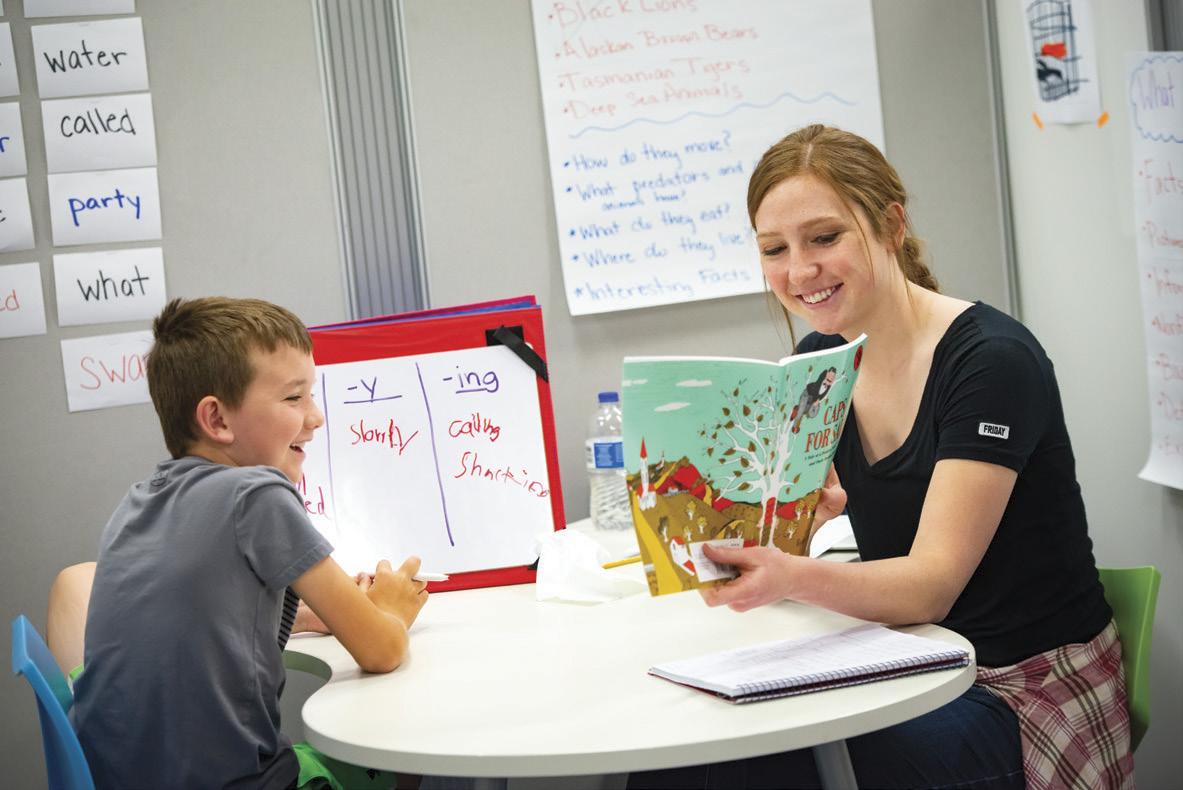


Teachers make an impact every day. From big moments that shift the trajectory of a person's life to small things teachers do to make students feel safe, appreciated, and ready to learn. The UW College of Education has launched the Because of a Teacher campaign to share stories that showcase how teachers make a di erence in the lives of their students.
Go to uwyo.edu/because-of-a-teacher to hear stories about the educators who have helped build several distinguished Wyomingites into the people they are today. You can also submit a short video sharing your story about an influential teacher!
A $600,000 gift from the John P. Ellbogen Foundation to UW will help support the Center for Principle-Based Leadership and Ethics within the College of Business, creating a central source for supporting and connecting leadership and ethics scholars at UW. Specifically, the gift will support the recruitment and retention of two positions within the center, including a faculty

position and a director position. The donor, the John P. Ellbogen Foundation, has supported programs across campus for decades and empowers the people of Wyoming to lead healthy lives in thriving communities. The foundation’s benefactor, John P. “Jack” Ellbogen, a Wyoming native, had a great love for and commitment to his home state.
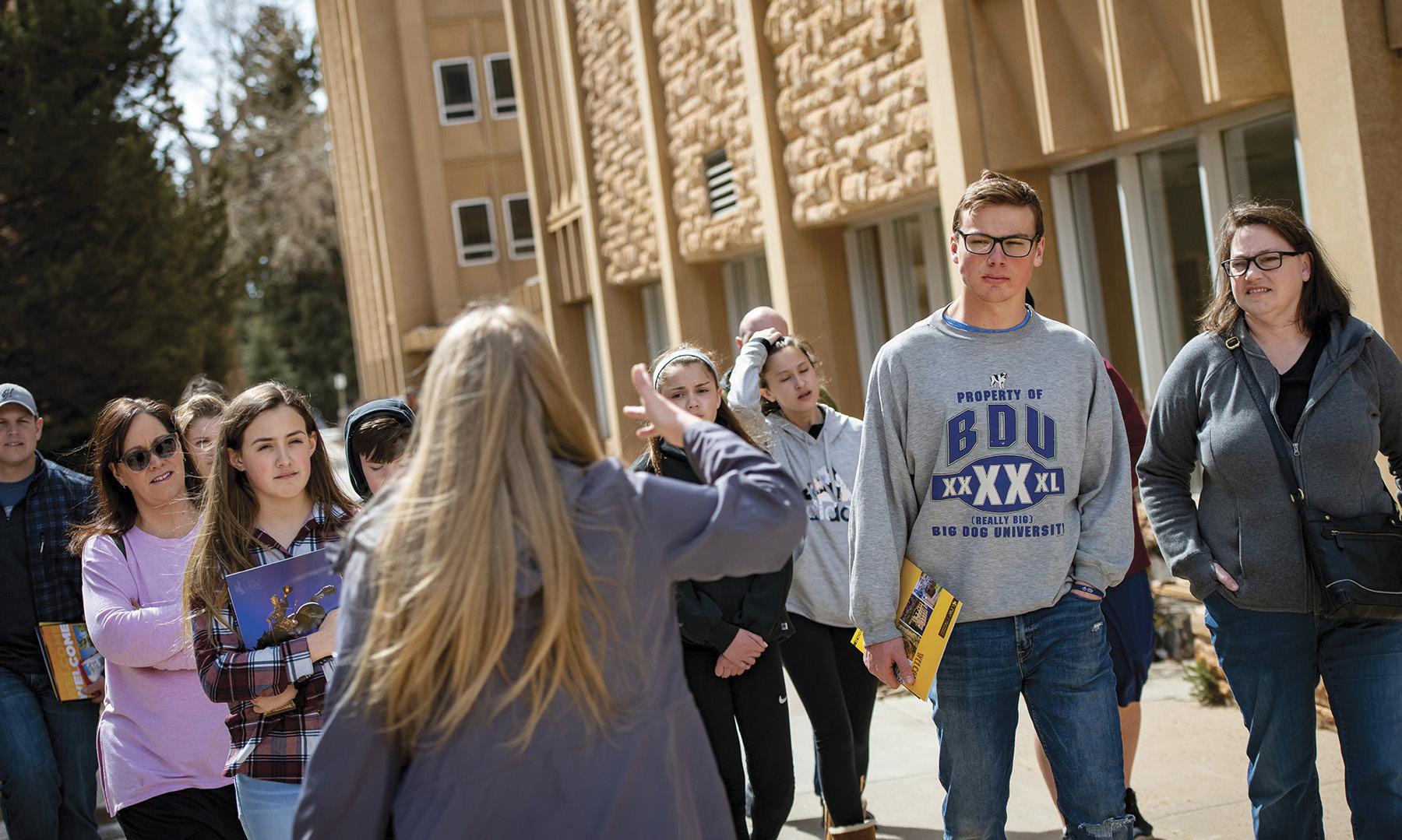
First-time students this fall will “Saddle Up” for an exciting college experience. In an effort to instill a sense of community and belonging from the very beginning, UW will unveil the Saddle Up program. From Aug. 14–19, 2022, Saddle Up will offer students a look into the experience of an academic semester, including participation in classes, homework, fitness and wellness time, college connection time, study time and essential skills sessions. Participation in this experience will earn students one credit hour of UW credit. An optional transfer program will be hosted Friday and Saturday, Aug. 19–20, and will focus on familiarizing incoming new transfer students with UW resources.
A $1 million gift in memory of Tom Thorson, president of Black Hills Bentonite LLC, supports the UW’s Summer Field Camp, which has been training geologists for almost a century. The Tom A. Thorson Geology Field Camp Fund was established by Don Thorson and Mary Thorson Gullikson and friends on behalf of the Harry T. Thorson Foundation. Formerly the UW Field Course in Geology, also known as the Summer Field Camp, the Tom A. Thorson Geology Field Camp is a six-credit-hour, six-week summer course—a comprehensive and nationally recognized professional experiential learning opportunity that is the culmination of a student’s geological education and is required for geologists to graduate with their bachelor’s degrees in geology. Thorson was president of Black Hills Bentonite, the family business, for six decades until his death from cancer in December 2020. He is said to have “tenaciously navigated advancements in the business as market demand for bentonite evolved” and “had a knack for hiring talented people and giving them as much responsibility as possible.”


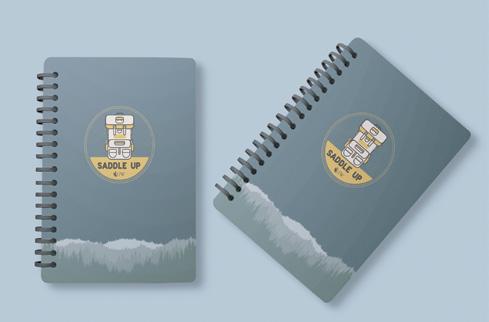
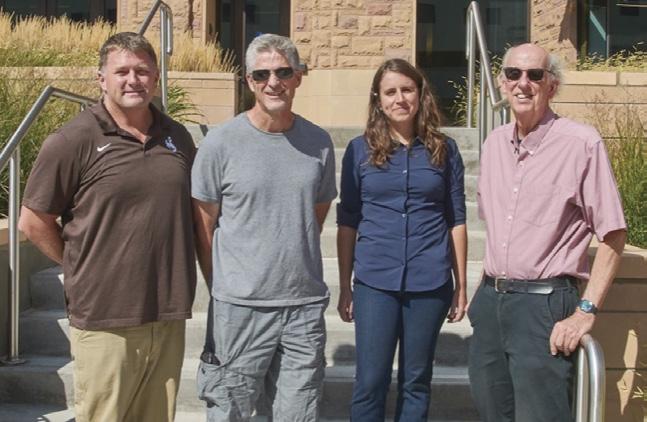
$4 Million


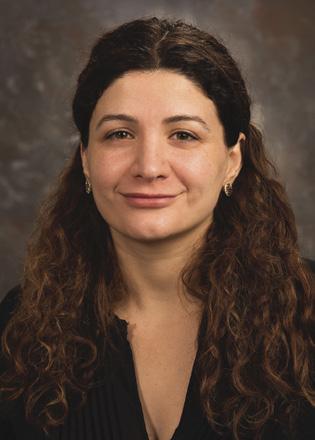
Two UW research teams led by Bruce Parkinson and Katie Li-Oakey have been named Phase 1 semifinalists of the U.S. Department of Energy’s AmericanMade Geothermal Lithium Extraction Prize, a $4 million competition designed to advance technologie and techniques to support direct lithium extraction from geothermal brines.
$5 Million
A team of UW students is a winner of the Carbon Removal Student Competition funded by XPRIZE and the Musk Foundation. A total of 23 student-led teams won the $5 million Carbon Removal Student Competition, which is part of the $100 million XPRIZE for carbon removal supported by the Musk Foundation.
$4,000
UW’s School of Energy Resources and 9H Research Foundation are collaborating on a $4,000 student research energy competition, where students will each develop an energy project and compete for cash prizes.
32

3
Helios Piano Trio, composed of awardwinning artist faculty from UW, performed its debut recital March 1 in New York City’s Carnegie Hall.
Thirty-two women were recognized at UW’s sixth annual Own It! Awards recognizing women in science, technology, engineering and mathematics.
$5,000
1
IDEAS is a prestigious worldwide organization that disseminates economics research that compares graduate programs based on the research record of their graduates. The rankings placed UW’s economics Ph.D. program among the top 1 percent worldwide. UW’s Department of Economics ranked first in the Mountain West region.
The School of Energy Resources, Baker Hughes and the Wyoming Energy Authority are collaborating to offer UW students an opportunity to introduce novel solutions in the decarbonization space through a $5,000 ideation innovation contest.
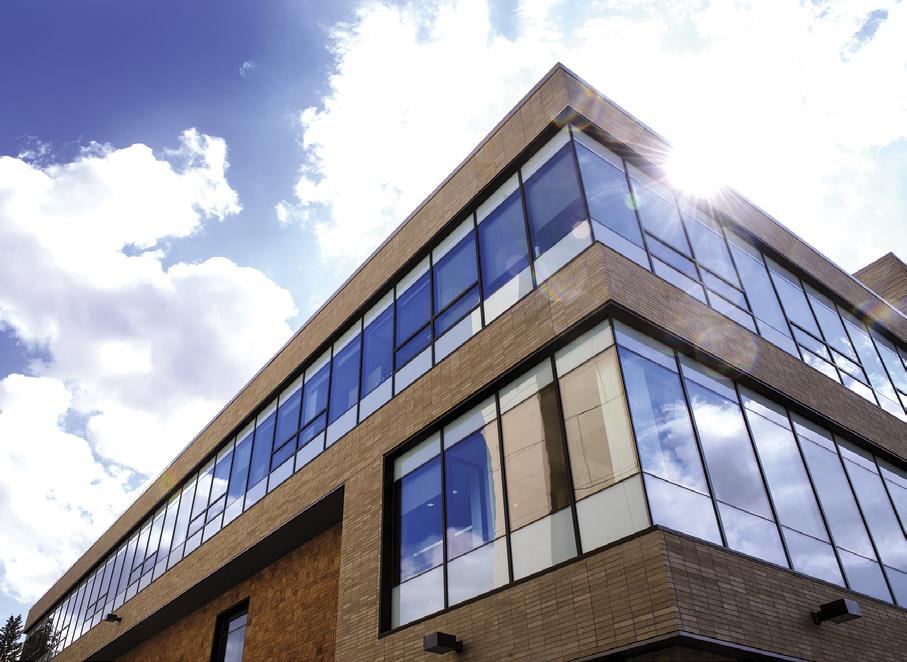
$500,000
UW’s School of Energy Resources received a $500,000 commitment from energy infrastructure leader Williams to help fund the school’s Hydrogen Energy Research Center (H2ERC).
Name that research
UW Part of $19M Project to Understand How Range Management Affects Soil Health, Producer Well-Being
Toohey, Murphy Receive NSF Grant to Study Archaeological Evidence of Economic Inequality in Peruvian Andes
Details, please
UW is among an international coalition that announced a $19 million research project aimed at understanding how a farmer’s or a rancher’s grazing management decisions affect soil health on pasture and rangeland. The research will help determine how soil health can benefit a producer’s land and well-being.
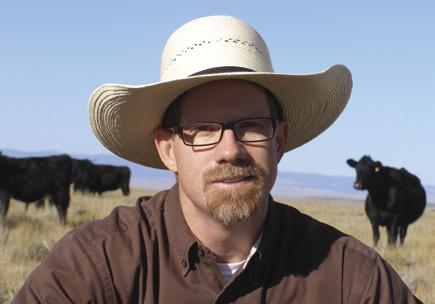
Noble Research Institute, UW, Michigan State University and Colorado State University are leaders of the project. The project will bring UW’s McGuire Ranch online as a top-tier research resource.
UW professors recently received a five-year National Science Foundation grant to conduct archaeological research in the northern Peruvian Andes focused on understanding the origins and development of economic inequality in emerging complex societies. Associate Professor Jason Toohey and Professor Melissa Murphy received the NSF grant worth $145,164 for their project titled “Investigating the Origins of Inequality in the Cajamarca Highlands of the Northern Andes of Peru.”


SER Publishes Study on Domestic Critical Mineral Production From Coal Byproducts

Professor’s ESL Research Helps English Language Learners Navigate Public Schools
School of Energy Resources researchers have published a collaborative study on the potential for domestic critical mineral (CM) and rare earth element (REE) production from unconventional sources in the U.S. Recently released in the Renewable and Sustainable Energy Reviews journal, the study provides a geologic assessment of CM and REE occurrences in coal fly ash sourced from the Powder River Basin, as well as a complementary economic and policy analysis that explores a viable way to produce more of these critical minerals domestically from coal byproducts.

CaaMTech Team Up to Study Psychedelics as Treatments for Addiction
More than 200 people attended the recent Wyoming ESL Parent Institute, which served as a resource for English as a second language (ESL) students and their parents, in addition to educators and policymakers who want to support ESL families in their school districts. The inaugural event, held at Gillette College, was an outcome of research conducted by Jenna Shim, an associate dean and professor in the College of Education. Shim’s research was funded by the Everett D. and Elizabeth M. Lantz Distinguished Professorship in Education.
The School of Pharmacy and CaaMTech, a Washington state-based company that engineers psychedelic drugs, recently formed a collaboration in which UW researchers will evaluate CaaMTech’s proprietary compounds in addiction models as well as aim to demonstrate their anti-addictive properties. Ana Clara Bobadilla, an assistant professor in the School of Pharmacy, will lead the research project on behalf of UW.
To read more about these research projects and many others, visit uwyo.edu/news.
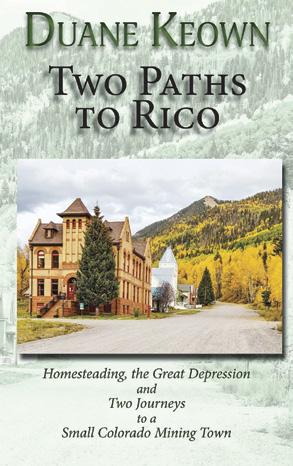
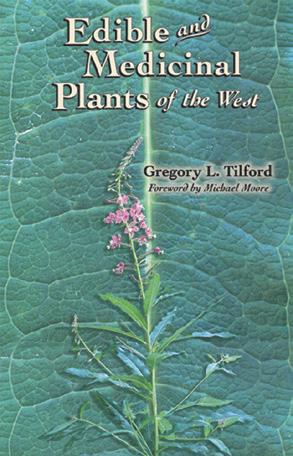


The University Store (uwyostore.com) is home to a large selection of books by Wyoming authors and about Wyoming. Two Paths to Rico by Duane Keown follows two families that left their homes for difficult homesteading lives. Learn how to identify the edibility and medicinal uses of over 250 plan species in Gregory L. Tilford’s Edible and Medicinal Plants of the West Wyoming History in Art, featuring the works of the late Dave Paulley, highlights 30 paintings of important people and events in Wyoming history. The 50th Anniversary Edition of the Snow Chi Minh Trail celebrates the opening of the 77-mile section of Interstate 80 between Laramie and Walcott Junction. This special anniversary edition includes updates, additional historical information, additional maps and historical photographs made available to the author.
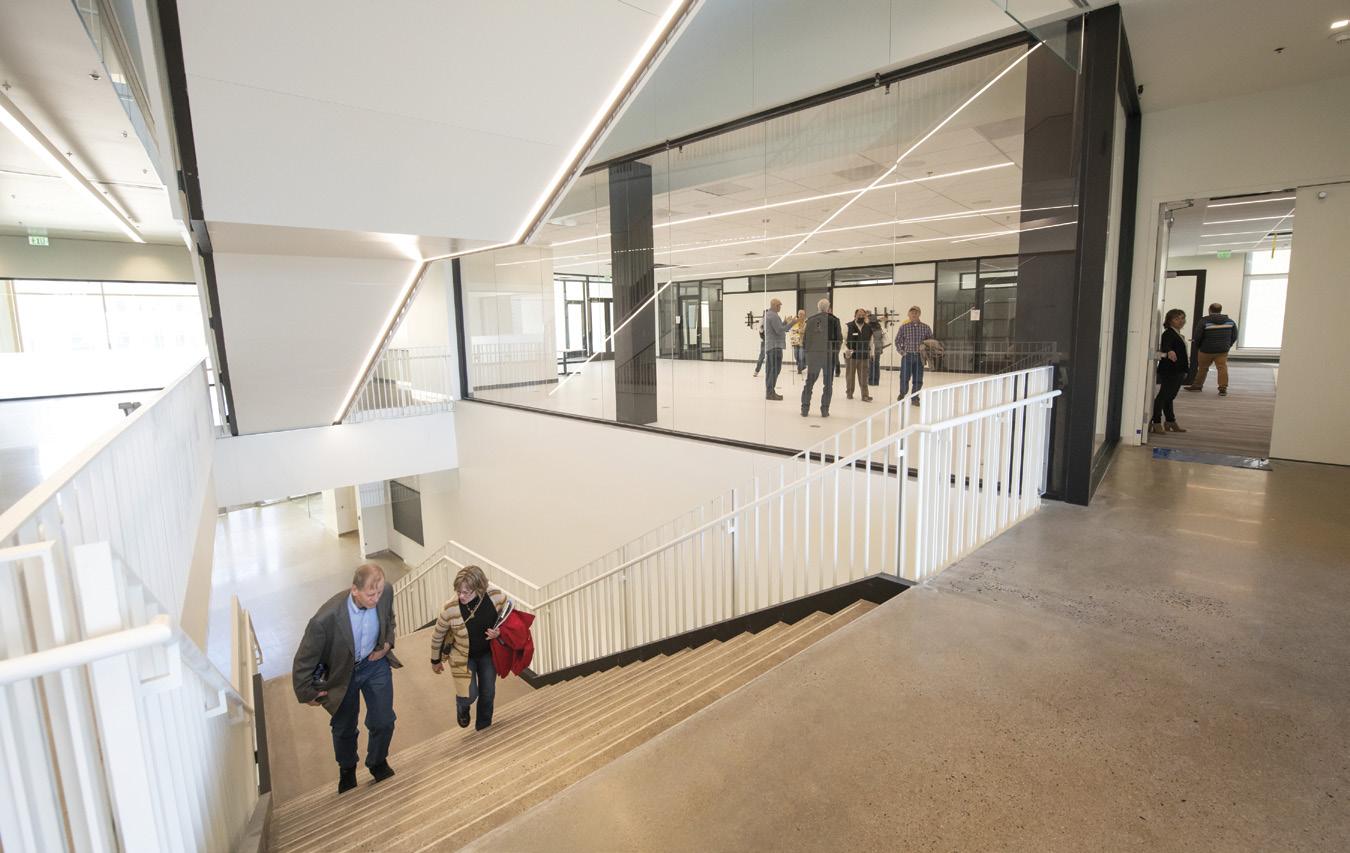
UW’s Office of Research and Economic Development named Greg Brown, a professor in the Department of Botany, as the part-time executive operations director for the new Science Initiative Building. Mark Lyford, an academic professional in the Department of Botany, will continue to serve as the executive program director. The Science Initiative is focused on the foundational biological and physical sciences that help train undergraduate and graduate students in all of the colleges and schools at UW. The $100 million Science Initiative Building, which opened this spring, is home to modern laboratory research space for faculty and students, a state-of-the-art greenhouse, the Model Organism Research Facility, the Center for Advanced Scientific Instrumentation, and active-learning classrooms and collaborative spaces for undergraduate and graduate education and research.
A remarkable gift from Cody Ritchie, a former Cowboy football walk-on, and his wife Patsy is the first major gift to support planned renovations to UW’s War Memorial Stadium. The $1 million gift will support the west-side upgrades, including improvements and upgrades to restrooms, concessions, seating, Americans with Disabilities Act compliance and the press area. Ritchie is the founder, CEO and managing partner of Crest Insurance Group—a full-service insurance brokerage licensed in all 50 states that employs more than 250 people in Arizona, California and Colorado. Ritchie and Patsy are Wyoming athletics fans and avid supporters of the university, and this is the latest in a long line of gifts.

The U.S. Small Business Administration (SBA) has awarded the Wyoming Small Business Development Center Network a $2.5 million grant to implement the SBA’s Community Navigator Pilot Program in Wyoming. The goal of the Community Navigator Pilot Program is to reduce barriers that all small businesses, including those owned by disadvantaged groups such as veterans, women and those from rural communities and communities of color, often face in accessing critical support. The Wyoming SBDC Network and 50 other organizations were selected to operate this program from more than 700 nationwide applicants.
Wyoming philanthropist Susie McMurry’s most recent gift of more than $1 million will have a big impact at UW. Specific areas of support include the Western Thunder Marching Band, the Bachelor’s Reach for Accelerated Nursing Degree (BRAND) program, the Fay W. Whitney School of Nursing dean’s discretionary fund, and a new state-of-the-art Guamard advanced multipurpose adult simulator for nursing education. McMurry’s dedicated support of these areas provides critical funding for UW students, faculty and staff. Since 1998, Susie McMurry and the McMurry Foundation have provided transformative investments to elevate and support the citizens of Wyoming— forever improving the lives of people, organizations, hospitals and centers throughout the state.
UW’s Coe Library is home to the new Student Learning Commons, a centralized one-stop academic support network for UW students. The STEP Tutor Center, the Learning Resource Network (LeaRN), the Writing Center and Information Technology collaborated with UW Libraries to develop the space, which allows for student consultations, supplemental instruction sessions, small-group student trainings and workshops given by the academic support centers. The redesigned space includes flexible seating for up to 185 students, with a mix of mobile tables and chairs, cozy booths and meeting tables. There are multiple zones beneficial to students, such as the convertible presentation space and a startup space where students can meet to work on projects and presentations.














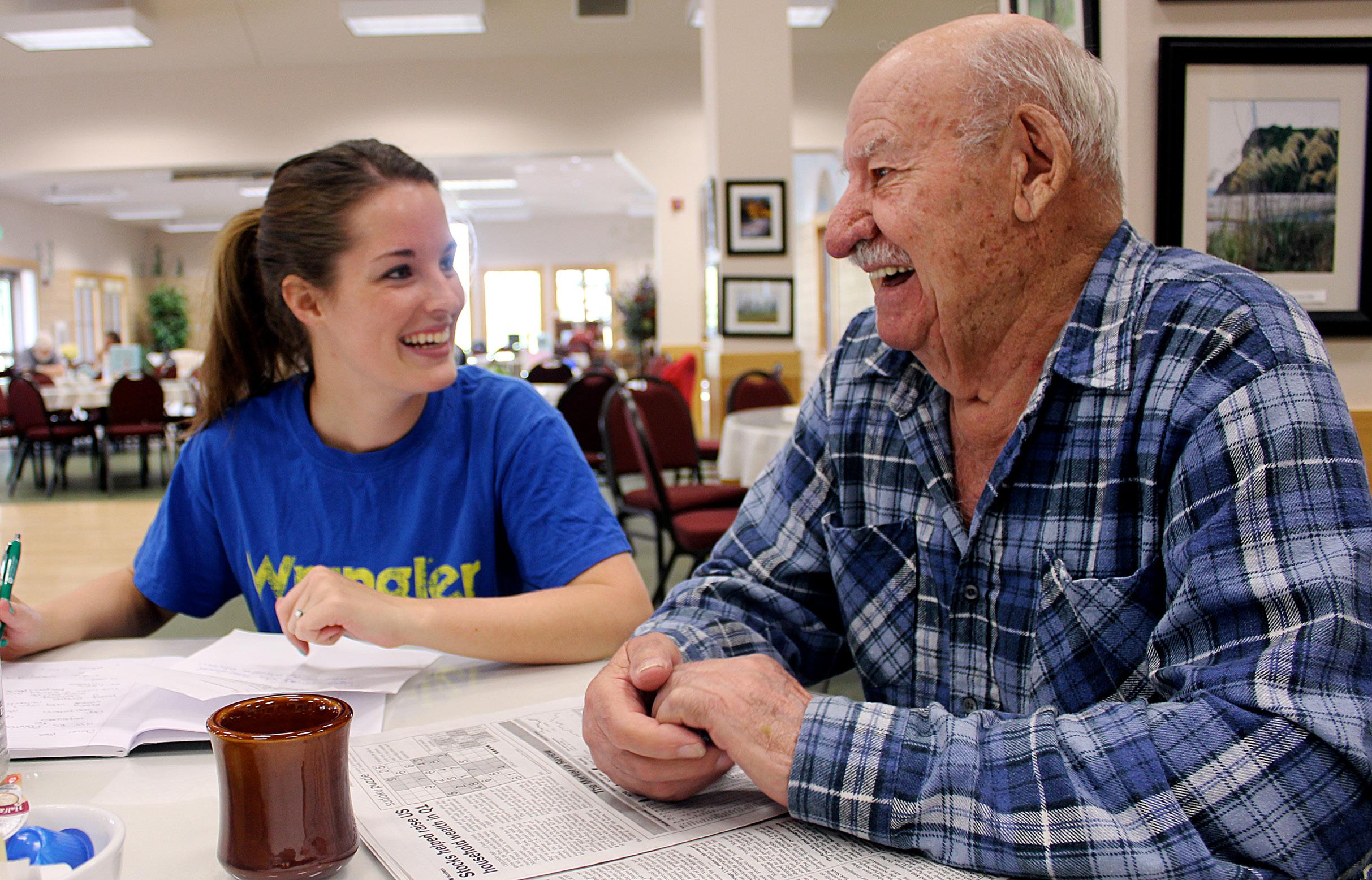

A gift of $5 million from alumnus Lawrence “Larry” Carrell will establish a named deanship in the College of Engineering and Applied Science— the second named deanship in the university’s history. The Carrell Family Deanship will recruit and retain a dean at UW dedicated to fostering excellence and addressing the critical needs and priorities of the College of Engineering and Applied Science. Endowed faculty positions, such as a named deanship, are important because they empower UW to attract a diverse candidate pool and retain strong educators. Named deanships particularly attract prominent researchers and scholars, helping the university remain competitive among other leading engineering programs. The deanship aligns with the College of Engineering and Applied Science’s Tier-1 Engineering Initiative. Carrell earned a bachelor’s and master’s degrees in petroleum engineering from UW and worked for Chevron, Conoco and other companies before founding his own oil and gas business, Carrell Enterprises Inc., based in Sheridan.
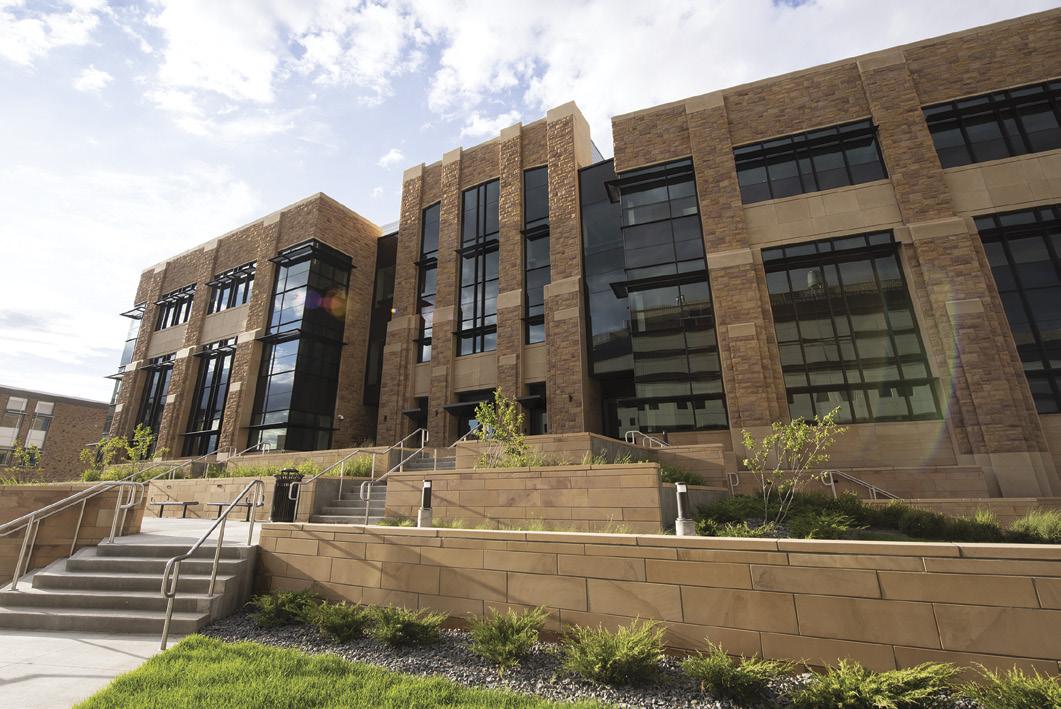

Everyone is welcome to discover and tinker!


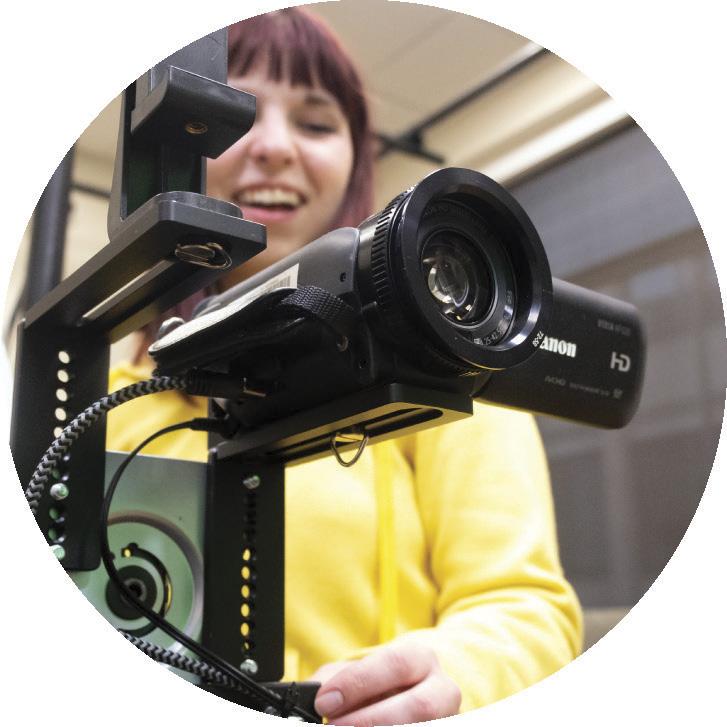
Visit Coe library for access to:
3D Printing | Laser engraving | Sewing & textiles | Vinyl Cutting | Circuit board milling Crafts | Virtual reality | Podcasting | Video creation | Digital Multimedia Lab | And more!

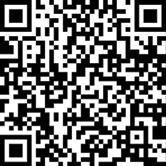
If you’re new to campus, it can be confusing where you need to go for what. Here are a few places you need to know as you get started.
The Office of the Registrar is located on the ground floor of Knight Hall and maintains student and course records. Among other things, registrars typically register students for classes, schedule space and times for classes, ensure that students meet graduation requirements, process grades and prepare transcripts and diplomas for students, produce data about students and classes, maintain the academic records of the institution, ensure student data privacy requirements are met, calculate academic standing for actively registered students and process enrollment verifications. www.uwyo.edu/registrar.

The Office of Scholarships and Financial Aid serves to guide students and their families in the application for and receipt of student loans, grants, scholarships and other types of financial aid. Financial aid advisers are available and can be reached in person (Knight Hall, Room 174) or via phone or email. Visit www.uwyo.edu/sfa/contact-us for your specific advisor’s contact information.
These are just a few of the resources around campus. Learn more throughout this issue: ACES/advisers, page 24; career services, page 70; Multicultural Affairs, page 33; wellness offerings, page 30; adulting, page 44; and graduation, page 16.
11TH STREET
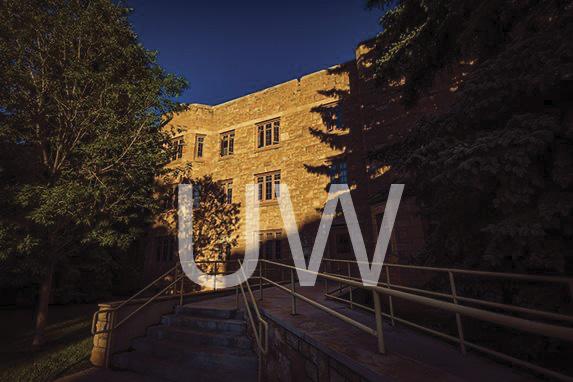

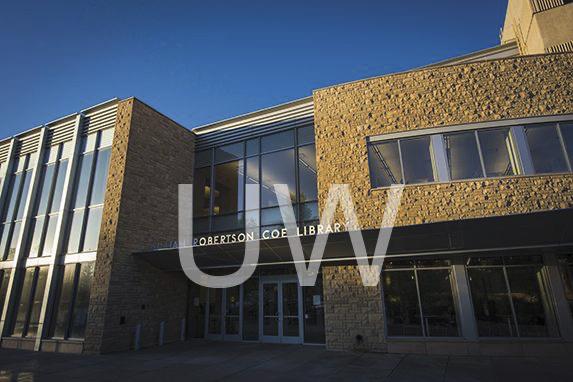
The Center for Student Involvement and Leadership provides student engagement opportunities. Through the center, students can join or create student organizations, volunteer locally or globally, serve as student leaders, write for the student newspaper, join a fraternity or sorority, and plan entertainment events for campus. Primarily located on the lower level of the Wyoming Union, the center has a website featuring upcoming events, ways to get involved, and a social media directory of the offices within CSIL (www.uwyo.edu/CSIL). Read about how other students have found their passion on page 18.

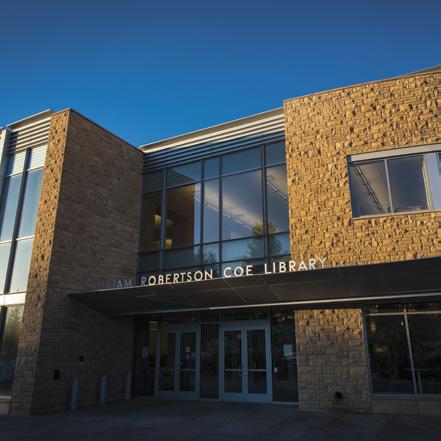
In addition to millions of books and electronic resources, UW Libraries offers students access to study spaces, computer labs, creation spaces and the Student Learning Commons. The creation spaces offer experiential learning with virtual reality, podcasting, audio/video recording and post-production, 3D printing, sewing, laser cutting and more.
The Student Learning Commons is a centralized one-stop academic study space where UW students can find tutoring, writing help, presentation and meeting spaces and cozy study nooks. Librarians also provide one-on-one support to students in multiple ways, such as with Librarian Chat, which is available seven days a week. www.uwyo.edu/libraries.
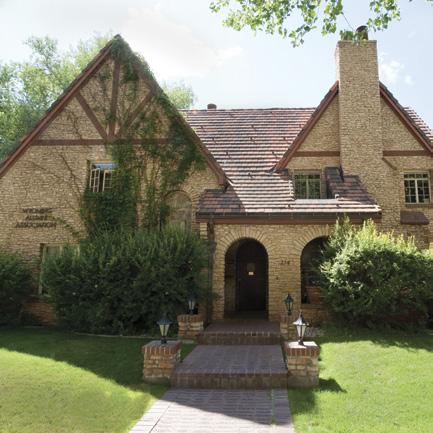
The Student Success and Graduation Hub is open to all students as a one-stop shop. It offers resources and connections to campus. If a student is unsure where to start, start at the Hub. Students can visit the Hub at the Alumni House—214 S. 14th St.—or online at www.uwyo.edu/student-success



“I wish I had known it is OK to ask for help. I was so nervous about asking for help when I first started at UW, and I would wait until I felt overwhelmed before asking. There are so many people and resources all over this campus that are here to support you and answer all your questions (even the ones you might think are silly, like how to navigate the Classroom Building). All you need to do is ask for help, and you will find it!” –CeeJay Berg, Rock Springs, Wyo., senior, accounting and economics, minors in honors and finance

“I wish I had someone on campus who I could go to for questions, who was closer to my age, so it felt less weird and stressful—and that is what I am currently here for and why we started Cowboy Coaching! I also wish I knew that I should make more friends and get out of the dorms more. Your freshman year will probably be the easiest year. You still need to pay attention and study, but I would recommend that you go out and have fun too and make some friends!” –Emily Powell, Windsor, Colo., graduate student, pharmacy
“I wish I had known that there was so much I missed out on by going home so often. I went home almost every other weekend during my first semester. I missed countless football games, school and sorority events, and the opportunity to meet new people and work on friendships I already had. It made my spring semester more difficult and lonelier.” –Abigail Klenk, Loveland, Colo., senior, social studies secondary education and history with an ESL endorsement


“Know how you need to study and how to manage your time sooner rather than later. The quicker you know how to succeed, the easier college classes will become for you. Make friends in your same major so that you have a group to support each other as you go through your same classes together.” –Alec Wallen, Round Rock, Texas, senior, geology and environmental system science, certificate in GIS
“I wish I would have known that the way I studied in high school is not as efficient for college schoolwork. Trying to maintain more detailed information in a faster-paced setting can get overwhelming, but managing your time really helps set a study schedule.” –Ciara Thompson, Sterling, Colo., junior, social work with minors in disabilities studies and psychology
“As a freshman at community college, I wish I’d known that it’s OK to take extra time in school and focus on finding what works best for me as an individual rather than how college ‘should’ be done. As a nontraditional student transferring to UW as a junior, I wish I’d had the chance to get more acquainted with campus. Because of the world circumstances when I came in, I felt really isolated.”
–Emilygrace Piel, Cheyenne, Wyo., senior, theatre design and tech management, focus in stage management


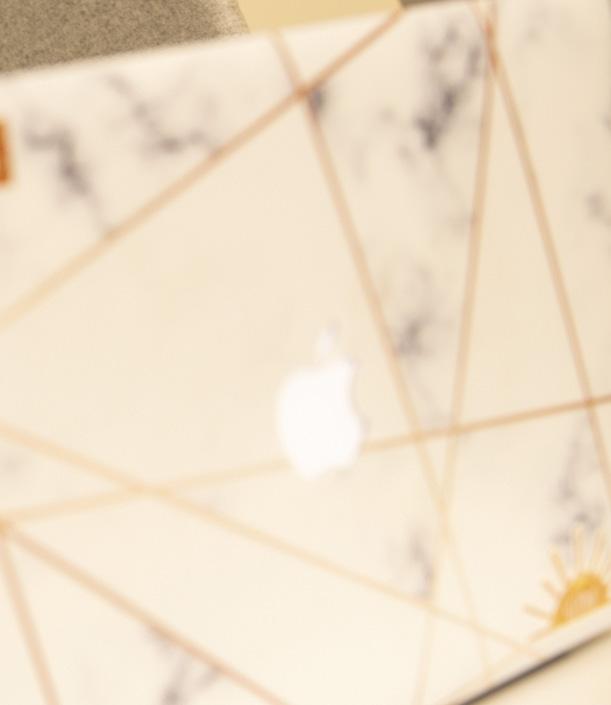

“I wish I’d known how fun college was going to be and all of the great things I’d get to experience despite changing circumstances, heartbreak and anything else that I felt went ‘wrong’ in my life. And that no matter what happens, I will end up exactly where I need to be. Being a UW Cowboy is honestly a blessing. Not everyone gets to experience the family you gain when you enroll and graduate here, and I think that’s awesome. It’s like we have our own little slice of heaven. So: Take advantage of it, love it, never give it up, and help us Cowboys make the world a better place.” –Erin McDonald, Colorado Springs, Colo., junior, chemistry
“You are going to change. This world is big and scary, and it is so very easy to make mistakes. Some days you will hate yourself, and some days you’ll just hate the world, and most days you won’t feel entirely happy. There will be many moments when you wonder if it was all worth it. It was. Don’t doubt that. You know what to do, and you’ll do it right.” –Lona van der Linden, San Diego, Calif., sophomore, computer science
“I wish I knew how fast time would go in college. I feel like I am still a freshman, even though I’m graduating in May. The time that you spend here will be so important learning who you are, so make the most of it!” –Maddy Jenkins, Jackson, Wyo., senior, kinesiology
Check your degree progress
Making sure any credits from other institutions are transferred
Settle any outstanding fees to the university

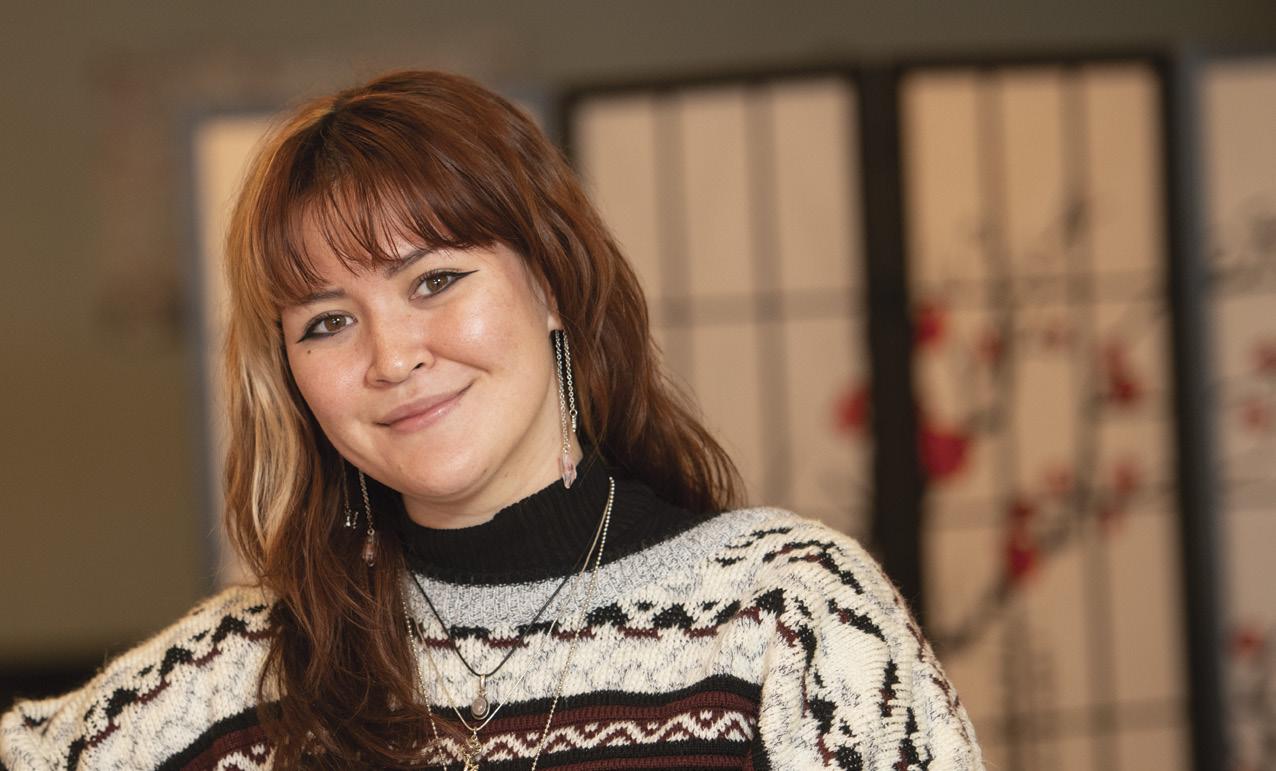



Declare your graduation date via WyoRecords Register for commencement and order regalia

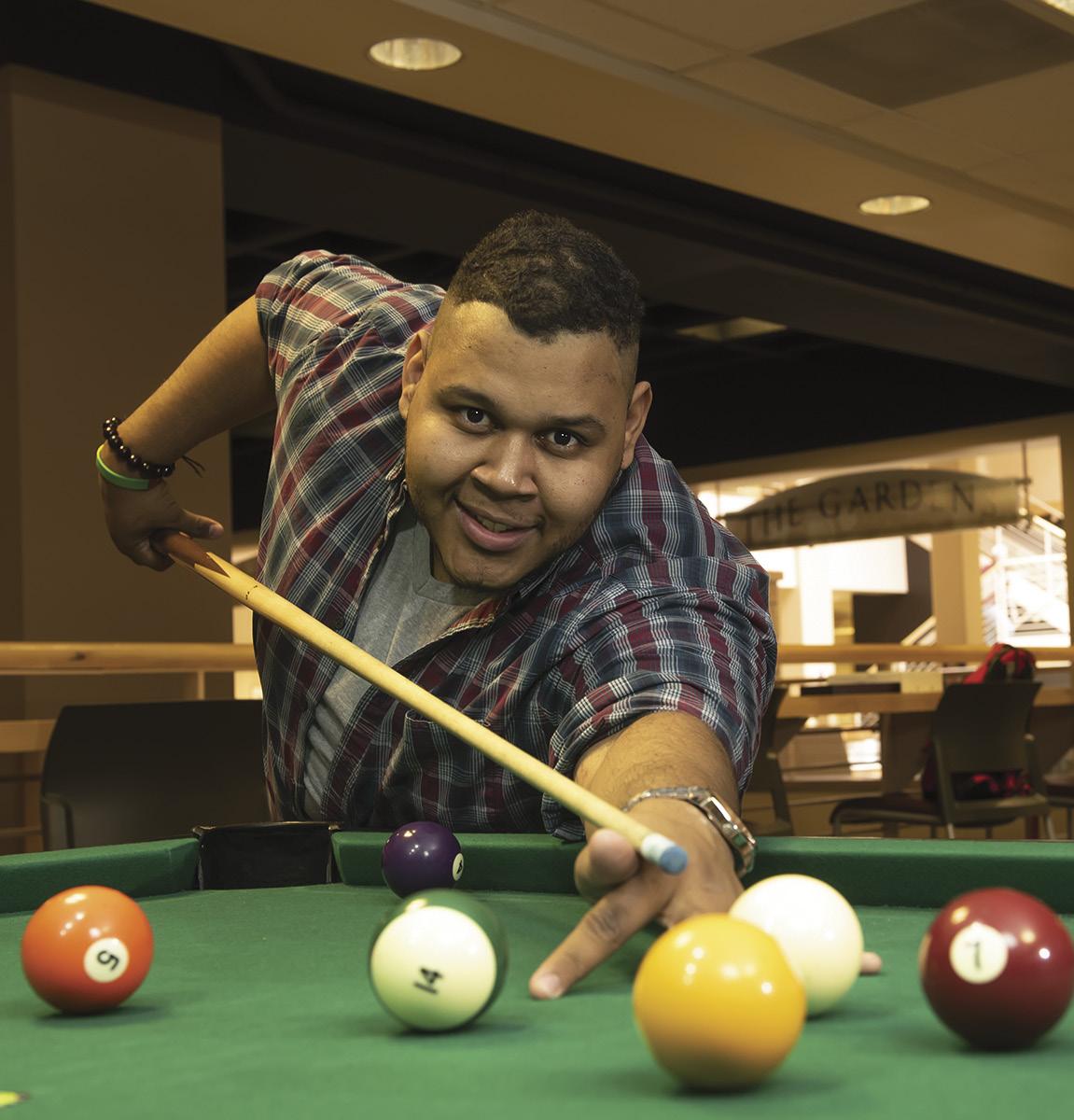



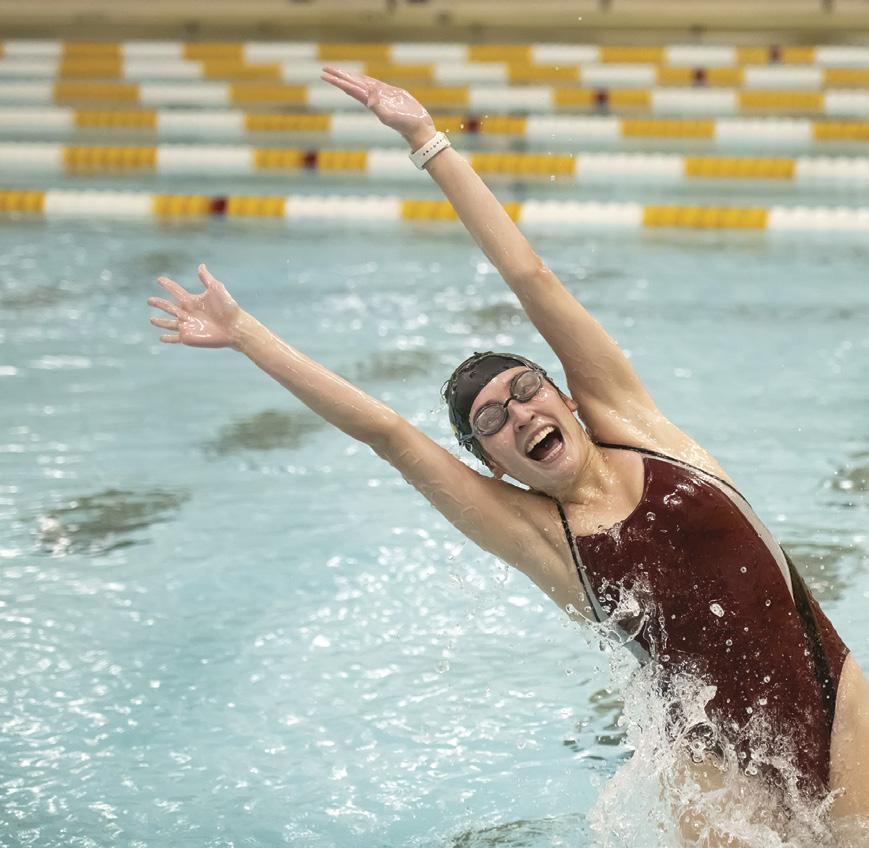
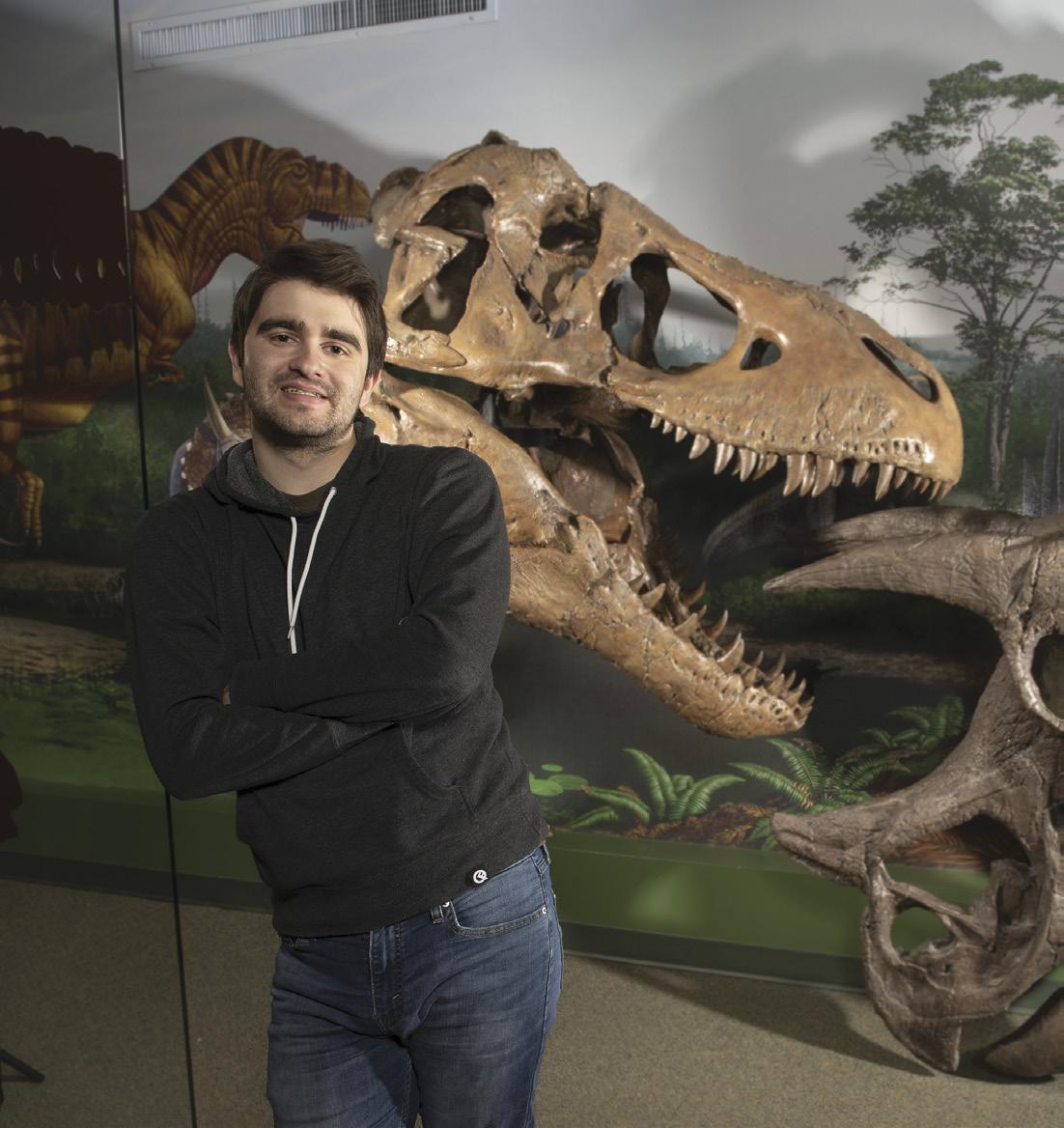
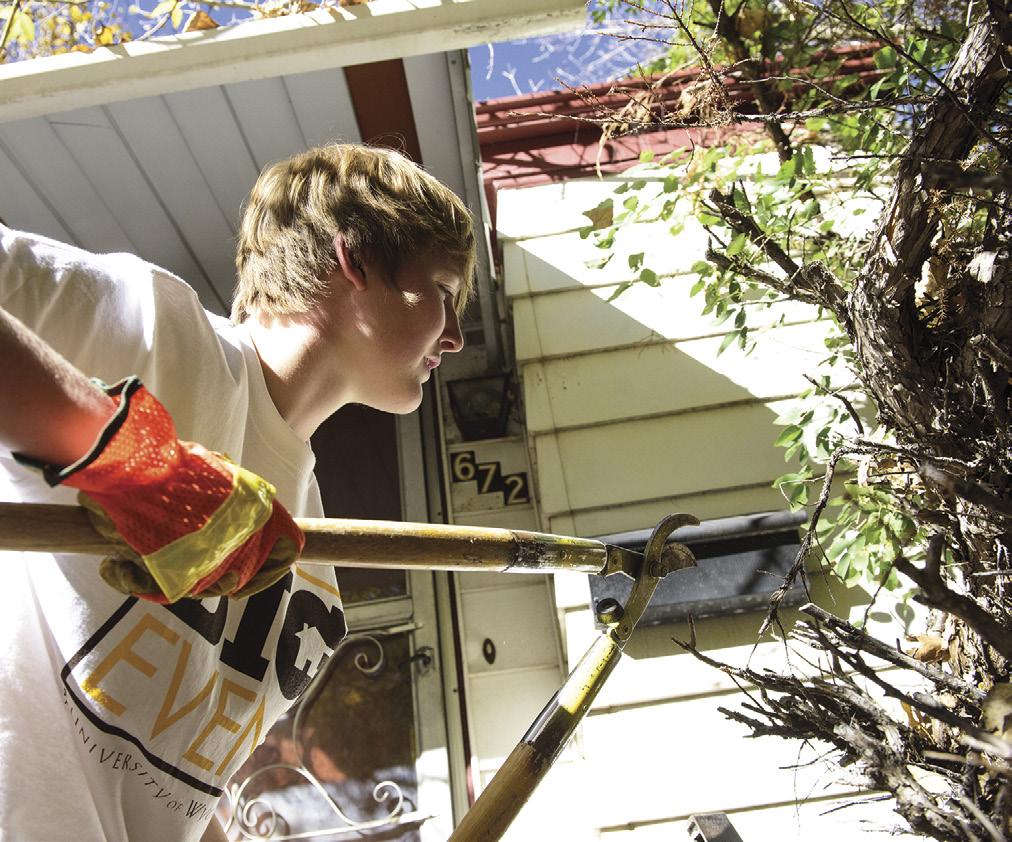


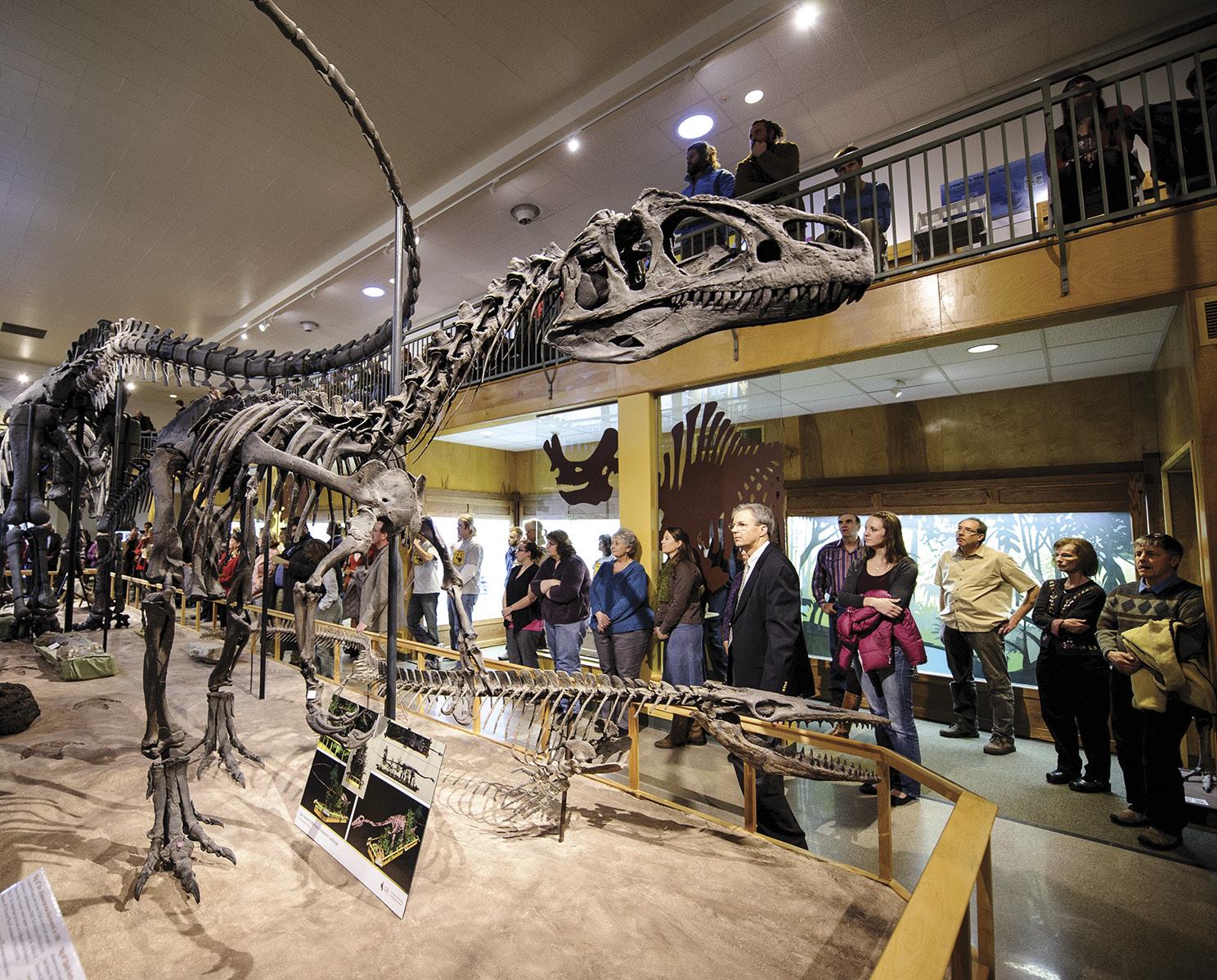
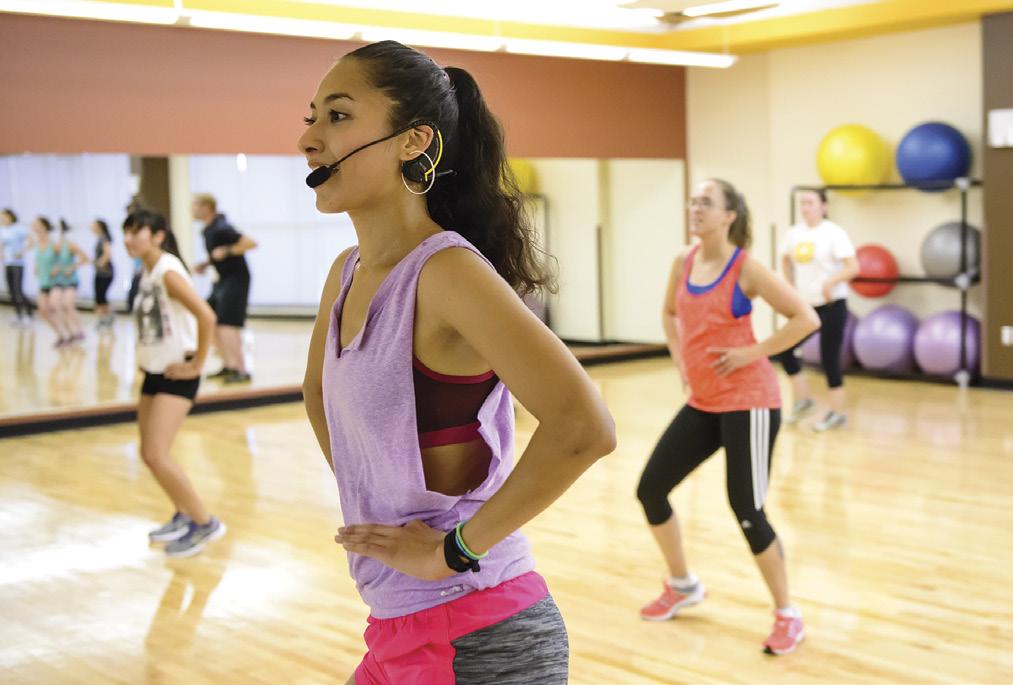





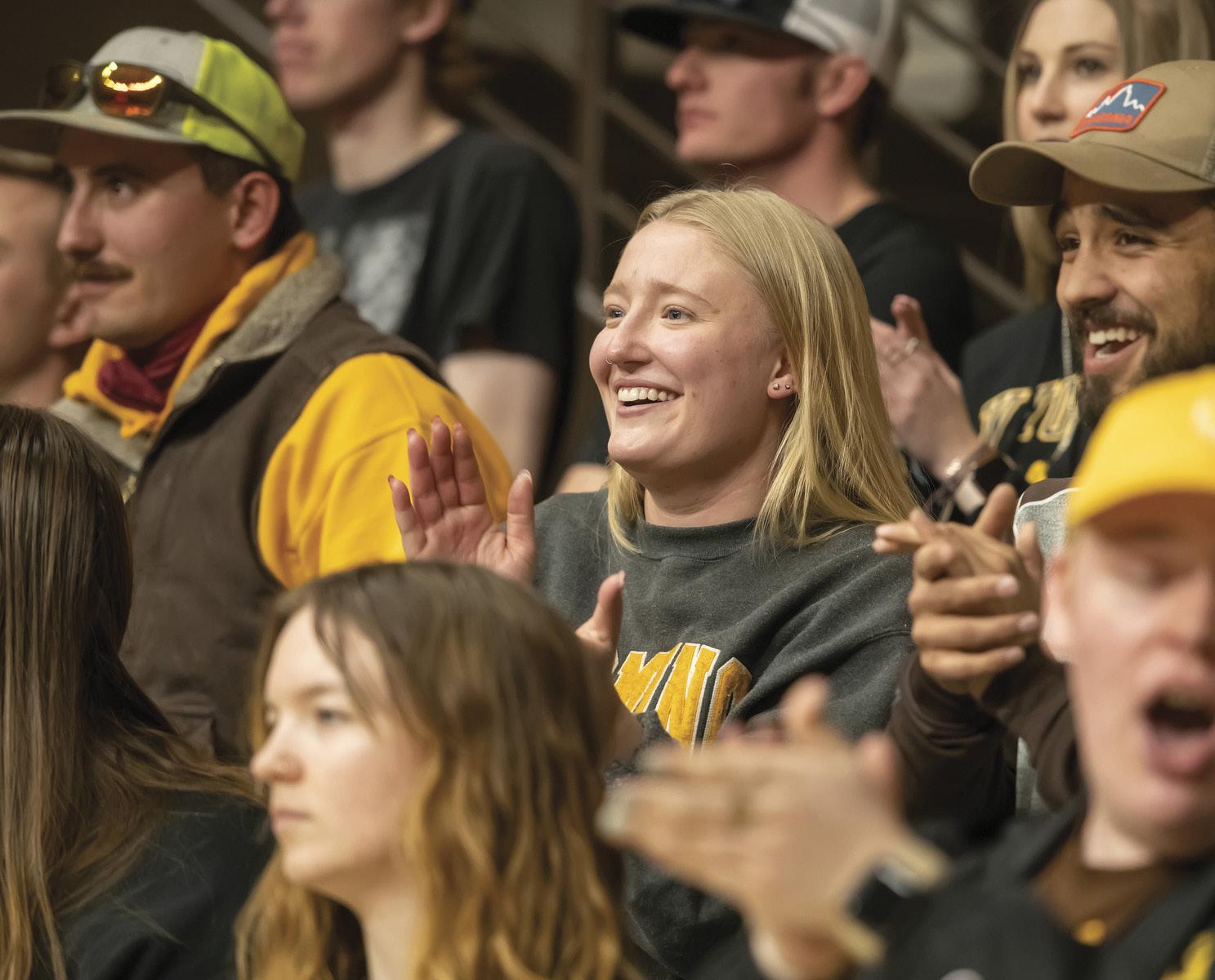
UW OFFERS COUNTLESS WAYS TO GET INVOLVED ON CAMPUS, HELPING YOU MAKE FRIENDS, HAVE FUN AND DISCOVER WHAT DRIVES YOU.
Getting involved at the University of Wyoming comes with countless benefits, including increased satisfaction and retention. While it can be scary to try something new, taking the leap brings fun, friends and fulfillment. Along the way, you may discover lifelong hobbies or career interests. Here are a few of the options for getting involved on campus plus tips from current students.
• Start at the Center for Student Involvement and Leadership (uwyo.edu/csil), where you can explore a multitude of options.
• 7220 Entertainment student committees work to bring amazing events to campus—from movies to live music and other entertainment.

• The Associated Students of UW is the university’s student government.
• UW is home to 15 fraternities and sororities.
• Multicultural Affairs offers resource centers, student circles and much more (see the wellness feature on page 30).
• The Service, Leadership and Community Engagement (SLCE) office provides leadership and service opportunities.

• Choose from 300 student organizations. There’s truly something for everyone—from swing dancing to horseback riding to clubs geared toward your area of study. Explore clubs at uwyo.campuslabs.com/engage.
• In addition to NCAA Division 1 sports, UW offers intramural and club sports. Whatever your skill level, you can have fun and play on a friendly or competitive team.
• Education Abroad offers over 400 programs in 80 countries, with ample scholarships available.
• In addition to UW’s Half Acre Recreation and Wellness Center—with all the modern gym offerings, including a climbing wall, pools and classes—UW is also home to a robust Outdoor Program, where you can rent outdoor gear or sign up for outings. Read more about wellness offerings on page 30.
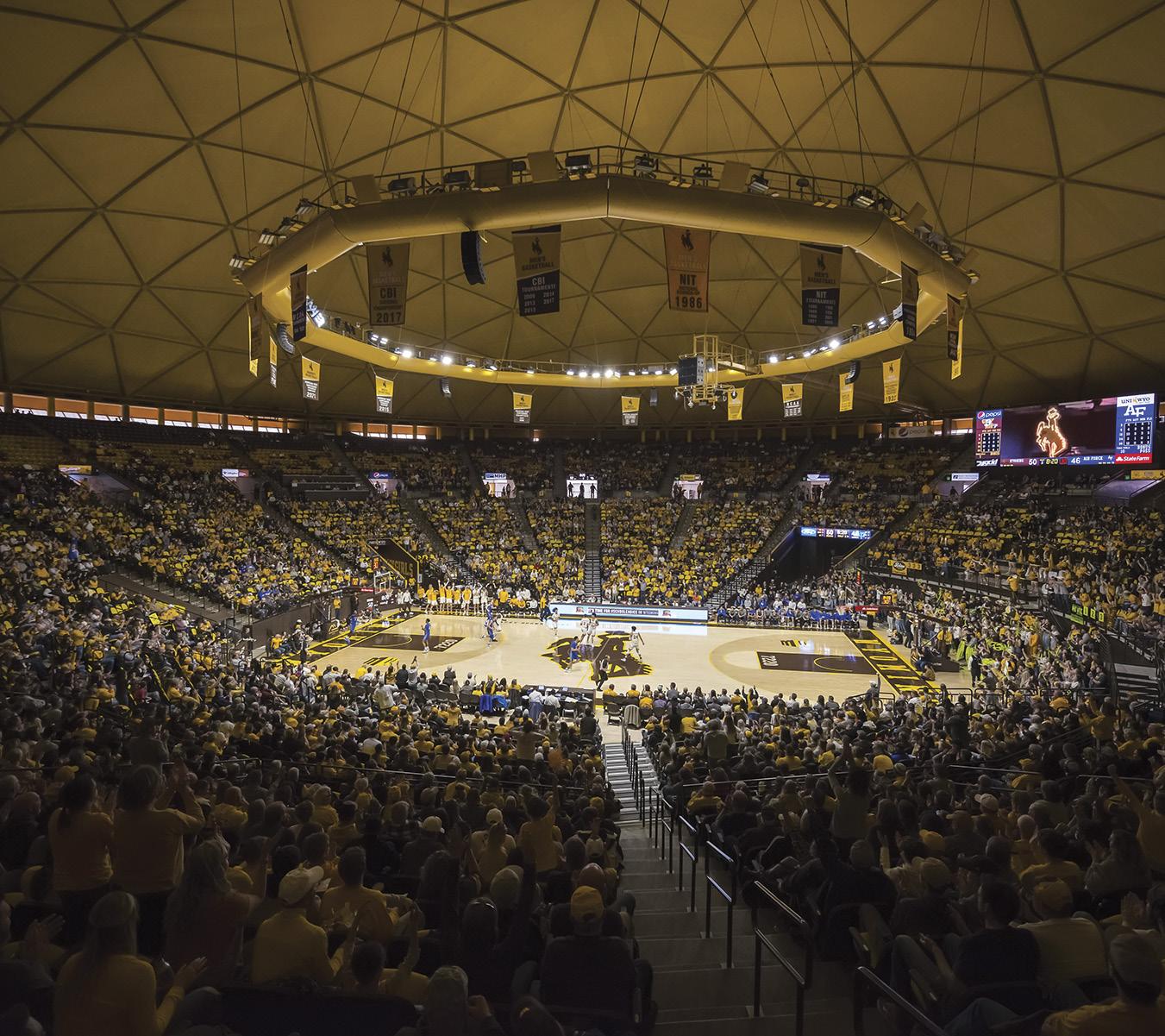

“I was an executive for the 108th administration of Associated Students of UW, a SOAR mentor for the Honors College and the treasurer of Political Science Club. I am currently a Cowboy Coach, a Career Peer for the College of Business Student Success Center and the president of Economics Club. I have been able to feel like I have a community on campus and work with other student leaders to make a difference. I have been able to meet and work with some of the most amazing people! My advice is: Just try it! My first year I talked myself out of joining clubs and being involved because I thought it would be too much work, or I thought I wouldn’t like it. Once I finally got the courage to try out clubs, sports and other groups on campus, I was able to find the place I felt I belonged.” –CeeJay Berg, Rock Springs, Wyo., senior, accounting and economics, minors in honors and finance
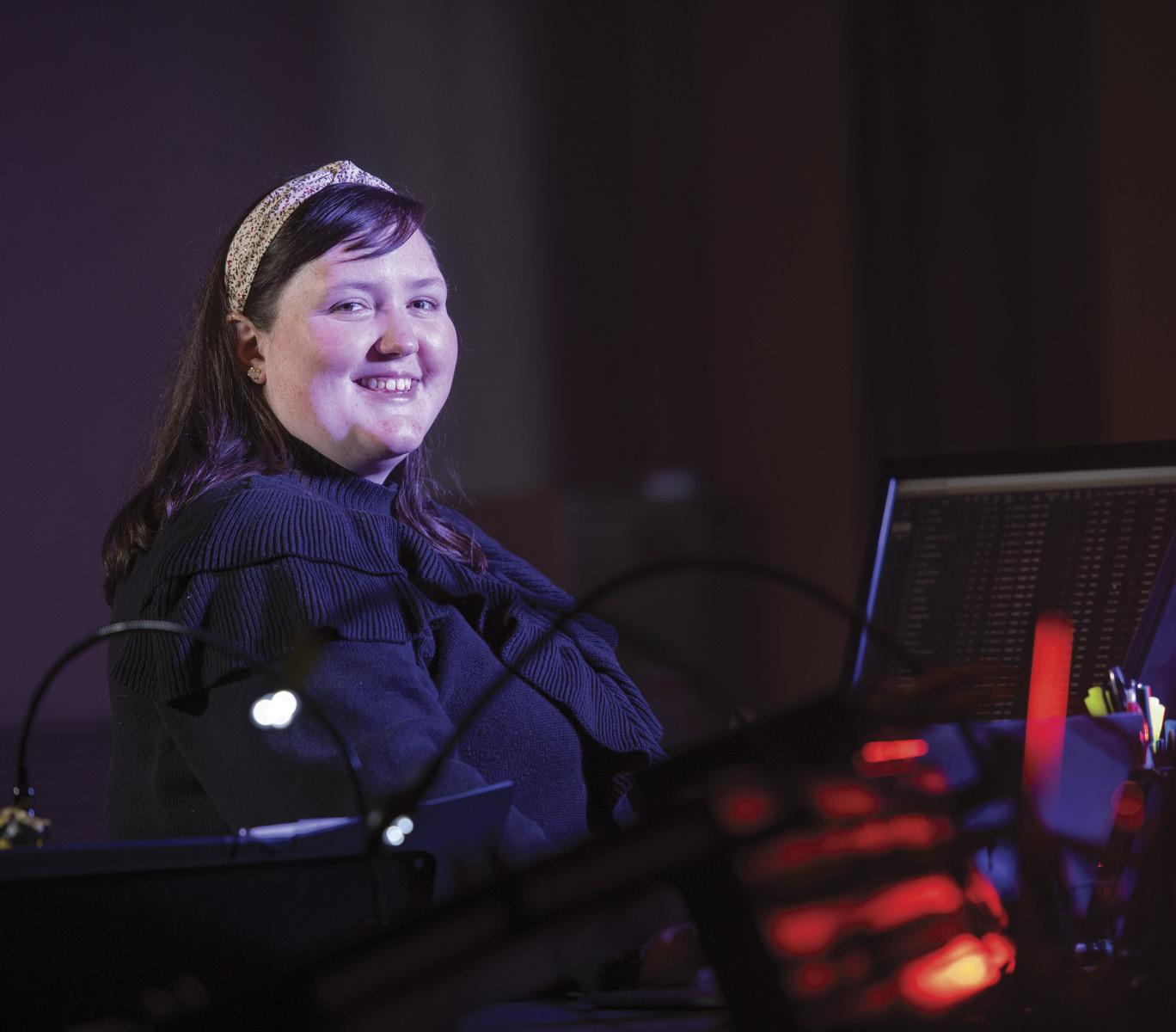

“My involvements with Campus Ventures and Cowboy Country Swing Club have allowed me to find community within UW and friendships that I would not have pursued otherwise. The beauty of college is trying new things. Do not be afraid to participate in a club or attend those meetings—step out of that comfort zone.” –Ciara Thompson, Sterling, Colo., junior, social work with minors in disabilities studies and psychology


“I have met some amazing people around campus that I never would have been able to meet had it not been for being a resident assistant and a Cowboy Coach. I have been able to connect with my peers from all different walks of life to complete common goals, and it’s truly been a blessing. The easiest way to keep yourself out of trouble and find the things you really love is to literally try everything. The more you branch out and get yourself out there, the more likely you are to fall in love with something new. You never know what you could end up finding.” –Erin McDonald, Colorado Springs, Colo., junior, chemistry
“I was both a member and now an officer for Swim Club on campus. It was a good way to escape schoolwork and do some other activity. Get involved! Sign up for a lot of different things and attend those things at least once. Sure, you may not like them all, but it’s a good way to meet new people at the very least.”
–Alec Wallen, Round Rock, Texas, senior, dual major in geology and environmental system science, certificate in GIS
“I have held multiple leadership positions with Tri Delta sorority and gotten involved with the fraternity and sorority life community. I have learned more about personal and professional development as well as made some of my closest friends. I would advise students to try EVERYTHING! If something is even slightly interesting, go check it out. Whether it’s a club, downtown activity or event hosted by UW, you never know when something will become a passion, so take advantage of all the opportunities.” –Abigail Klenk, Loveland, Colo., senior, social studies secondary education and history with an ESL endorsement
“My involvements on campus include Wellness Ambassadors, various pharmacy organizations, Cowboy Coaching, 7220, activity and game nights at the union, the Big Event, swing dancing and Zumba classes on campus! I have made a lot of friends and learned to have fun while also pursuing my dream. I was able to help others, and I found more people I can interact with. If you don’t already know what you want to do, don’t worry. Take your time, try a variety of things until you find what sparks your interest, and please DO NOT be afraid to change your major. It is not a bad thing!” –Emily Powell, Windsor, Colo., graduate student, pharmacy
The Global Engagement Office envisions a University of Wyoming community that engages, thrives, and leads in an interconnected and interdependent global society.
To learn more about our initiatives to foster global citizenship, visit uwyo.edu/global.
e@aishabjr
My favorite activity in Laramie, Wyoming is taking pictures for my photography page on Instagram. I had recently ventured into photography and I was trying to find beauty in everyday views and Laramie turned out to be a great place to do this.
Hi, I am Aisha Balogun and I’m from Ilorin, Nigeria and I graduated last year from the University of Wyoming with a major in Computer Engineering and minors in the Honors Program and Computer Science.

There were a couple factors that had an impact on my decision to study at UW. I had an older brother at UW at the time and I believed UW had a great world-class engineering program. The tuition was also more affordable than other colleges that I had applied to so it all seemed like a no brainer for me.
For my internship, I conducted my research in relation to the field of microcontrollers. My employer mentioned that my classes and research experience from school helped me to excel in technical aspects of my internship; which has led me to my career today.

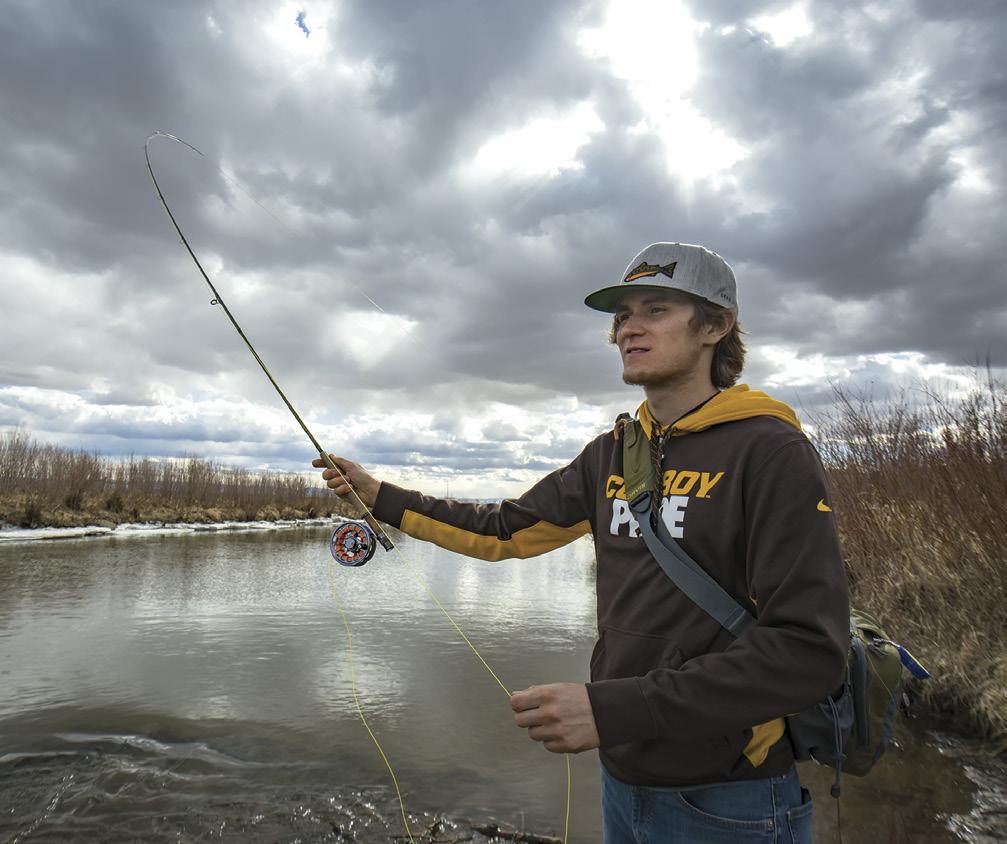


Surrounded by national forest and recreation areas, Laramie is home to every type of outdoor activity you can imagine—climbing, hiking, mountain biking, camping, fishing, skiing and snowboarding and more. You can rent outdoor equipment at UW’s Outdoor Program. In addition, Laramie is home to nearly 100 restaurants, shopping, two movie theaters, a bowling alley and live entertainment. Cultural and artistic offerings include theater, dance and visiting acts on campus (www.uwyo.edu/ finearts). There’s also a plethora of live entertainment locally. Or visit the UW Art Museum, UW Geological Museum, American Heritage Center, UW Planetarium, Laramie Plains Museum or the Wyoming Territorial Prison. In addition, larger cities are nearby, with Cheyenne and Fort Collins both about an hour’s drive and Denver only two hours away.
“I made connections with students through Cowboy Coaching and gained professional experience, additional connections and great opportunities for growth through theater and dance. Don’t rush through college or do things just because everyone else is doing them. I’m a nontraditional and transfer student. I earned my associate degree, worked for a few years and then came back for my bachelor’s degree. It’s presented its own unique challenges, but I know it was the right path for me because I’m so much happier now. Each person and degree is different, so allow yourself the space to question and explore what you want to do—it’s totally normal.” –Emilygrace Piel, Cheyenne, Wyo., senior, theatre and dance design tech management, focus in stage management
“I used to run events for the Esports Club, and now I work as a Cowboy Coach. The No. 1 thing I’ve gotten out of these involvements is the ability to connect with other students. As a computer science major, I know how isolating engineering-based majors can feel. It’s extremely important to me to change this narrative and help bring together students with similar interests and passions as me. I’ve been incredibly fortunate to meet some great friends and talented students
through these involvements! Making a difference in the communities you care about is the best way to give back to them. Whether it be something as simple as asking your resident assistant what events are going on this week or as nerve-wracking as asking a professor if they’d be interested in having you for an internship, taking the initiative to ask for opportunities rather than to wait for them to be offered is the best way to really get engaged with campus and Laramie. And, of course, don’t be scared to take a risk!”
–Lona van der Linden, San Diego, Calif., sophomore, computer science
“I helped found the Swim Club and am now the co-president of it. I also studied abroad in Australia and absolutely loved it. These involvements really helped me make connections on campus. I made friends with people I never would have met before, and it helped me branch out. Getting involved can be a really intimidating thing, especially if it’s a new activity for you. However, once you go for the first time, you will see that everyone is so welcoming. Being able to find a group of people who share similar interests and who you feel comfortable around is so important to your well-being.”
–Maddy Jenkins, Jackson, Wyo., senior, kinesiology
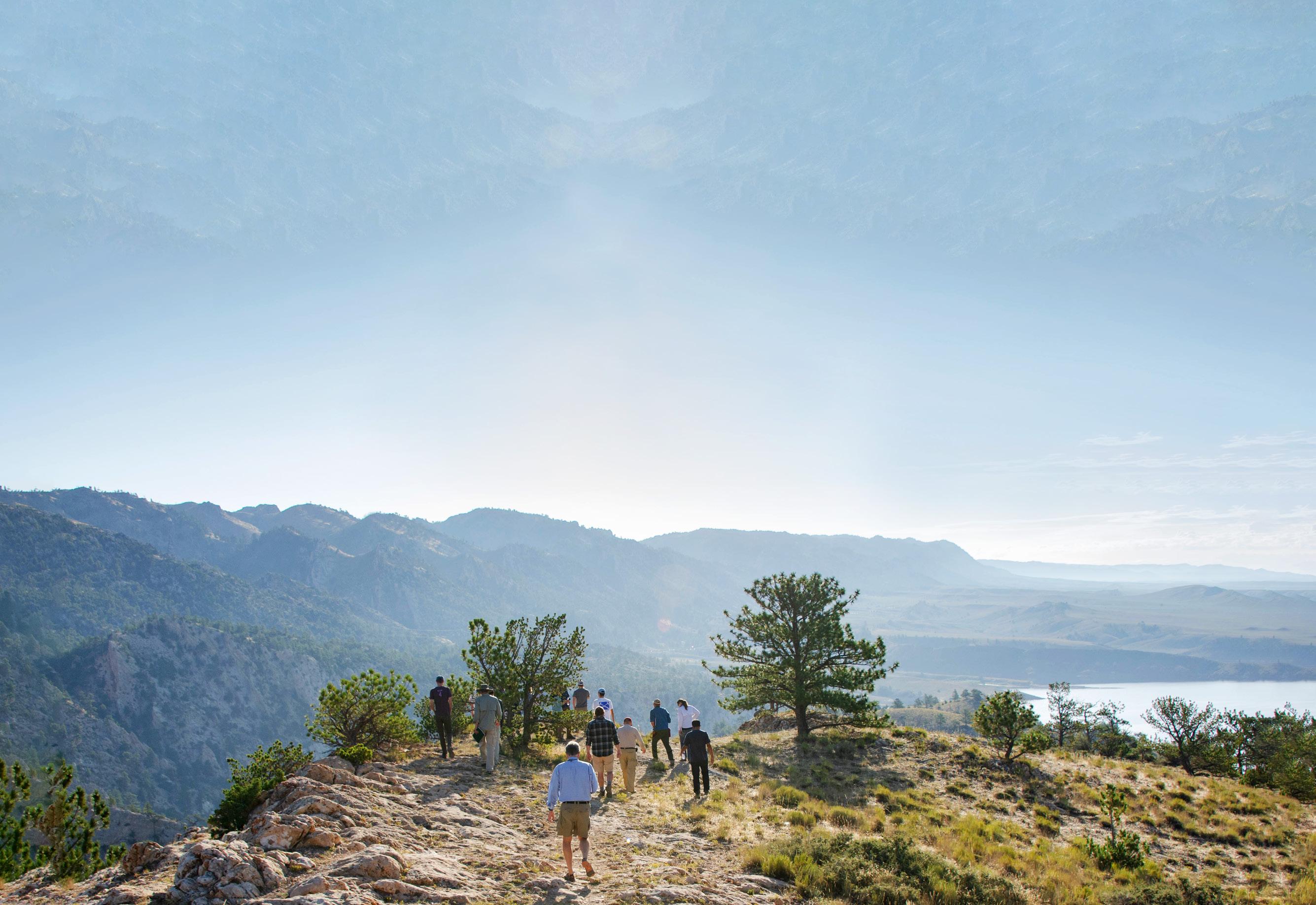
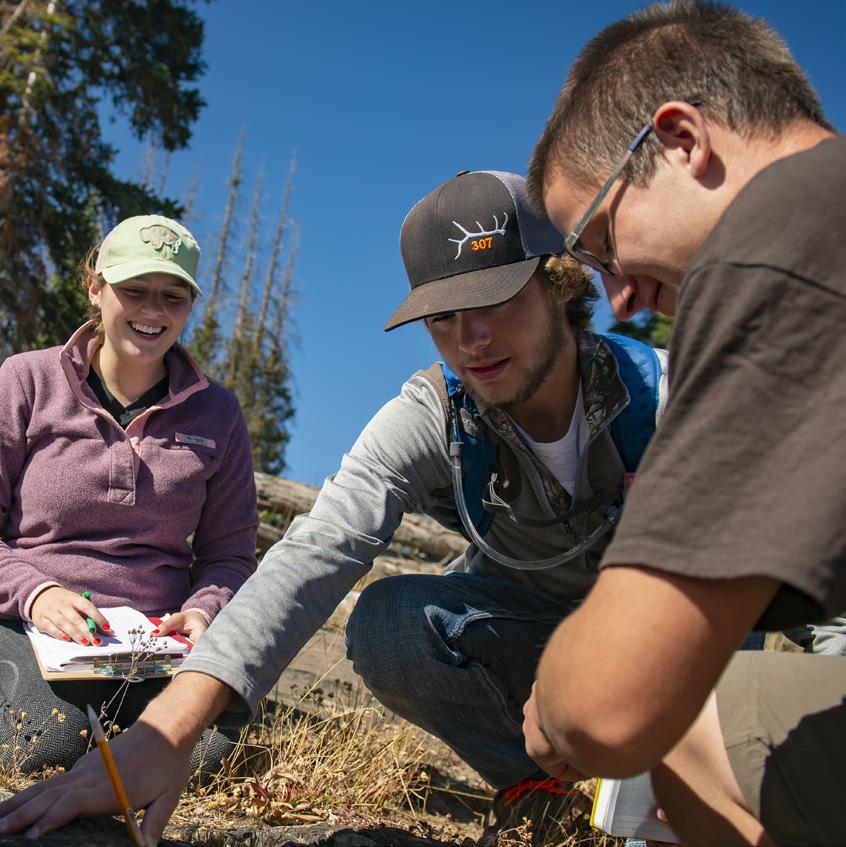
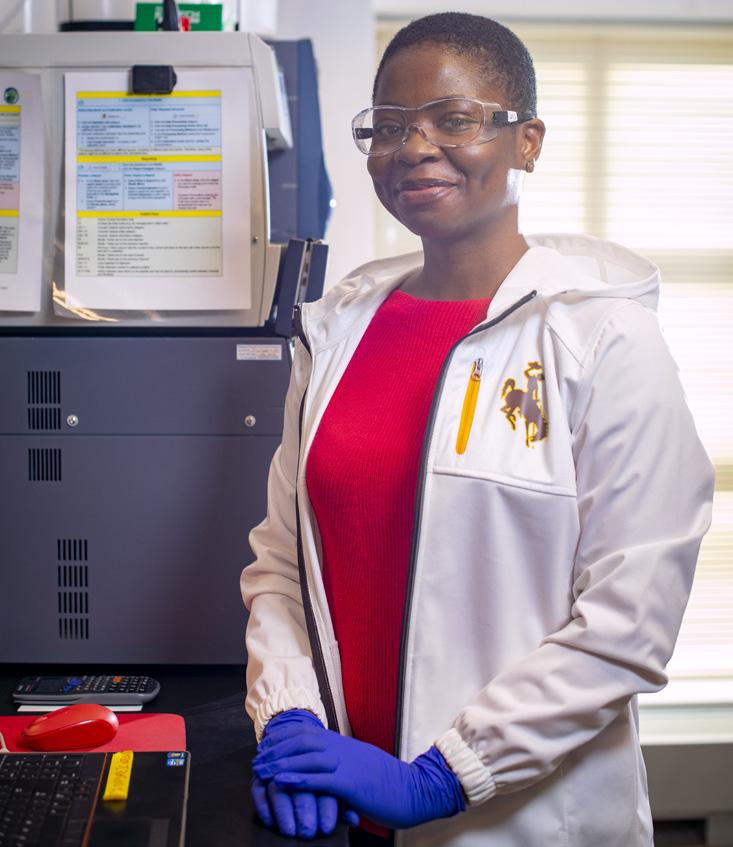
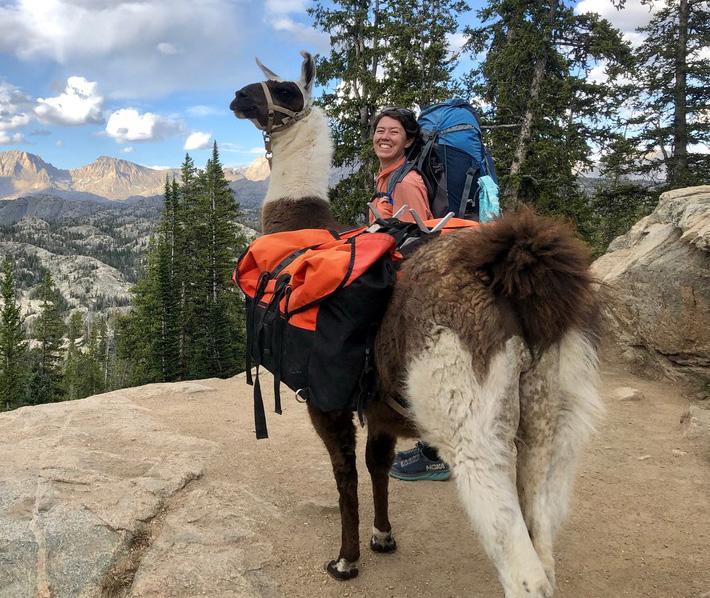
One thing university students find out quickly: College is far different than high school. The pacing, the studying, the expectations—everything requires adjustment. To ease that transition and help you find your rhythm, we spoke to campus experts and students for their top tips.

Learning Resource Network Manager Jess Willford and Manager of Academic Advising for ACES (Advising, Career and Exploratory Studies Center) Ben Herdt have made a career out of helping University of Wyoming students succeed. Here are their tips for academic success.
• Log on to WyoCourses and look through all your class information before the start of the semester. Unlike high school, you’ll be doing lots of work that you’ll never turn in. You must hold yourself accountable.
• Come to class prepared to learn. Use the bathroom before class. Put your phone away. Have things like water or gum handy.
• Stop by your professor’s office hours in the first two weeks. Introduce yourself. Ask about their research or teaching.
Ask any questions you have, including their tips for successful studying and notetaking in their class.
• Every class requires a different approach. In addition to asking your instructor for tips, talk to classmates about what works for them, and play around with different approaches. Try a study group or find a study buddy. Continually evaluate your approach and what’s working for you.
• If your instructor posts Skeleton Notes or PowerPoints, print them off in advance. Look them over so you know what to expect, then take notes during class in the spaces provided. After class, take a few minutes to review what you learned, then do the same before the next class. Like an athlete, study film and game day and then review the game, rather than burying your notes until the test. This helps you maintain your recall.
• Learning what to write down in class takes practice. If the topic is on the Skeleton Notes or the instructor spends time on it, it’s a good sign that the information is important. Some students prefer to tape the lecture if it’s not already recorded. If this appeals to you, ask the instructor if it’s OK.
• Be actively engaged. Write down questions you have, and connect your learning to other classes or real life. Do this with your textbooks as well—taking notes, jotting down questions and completing the practice problems before class.
• Organize yourself with a three-ring binder for each class. Use a digital and/or paper planner. Set reminders on your digital calendar not just for due dates but also to begin assignments in advance.
• For each credit hour, plan for two or three hours studying outside class. Treat college like a job. Between classes, study or go to tutoring. Using those chunks of time during the week can give you free time on nights or weekends to socialize and have some fun. It can also give you peace of mind.
“I recommend planning out your day with a checklist to go through and make sure you get done before you do anything else. I would use sticky notes and write what assignments I was going to do that day between classes. I got it done, so I had my evening off and was able to hang with friends, go downtown or eat! I also recommend making time to see friends and family. Study tips: Do not wait until the last minute because this is not high school anymore. Get good study habits started early. Utilize your paper or digital planner to track assignments. And if you keep your planner where you can see it, you are more likely to use it and pay attention to it.”
–Emily Powell, Windsor, Colo., graduate student, pharmacy

“Plan, plan, plan. I don’t plan every second of my day, but I do write down all of the things I need to get done that day, week, or month, even. Writing it down, typing it on my laptop, and getting notifications ingrains my responsibilities in my head, and I rarely ever forget anything because of it. Study tip: My best advice is to get yourself into a routine. And put the phone away! A huge part of successful studying is avoiding distractions.” Favorite places to study: STEM building, Coal Creek or Turtle Rock. –Erin McDonald, Colorado Springs, Colo., junior, chemistry
“My favorite time-management tip would be organizing my email calendar. This has proved to be so helpful, because not only can I have my class schedule on there, but I can block out study time as well. I have found that when I plan out two-hour study times, it is so much easier to sit down and focus.” Favorite place to study: Library study rooms. –Maddy Jenkins, Jackson, Wyo., senior, kinesiology
“My favorite time-management tip is having a planner so you can write down assignments, club meetings and work schedule and have a visualization of what you need to do that week. Study tips: Start early in the week and do it in time increments. The earlier you start, the easier it is to absorb that information.” Favorite place to study: the Union or downtown Coal Creek. –Ciara Thompson, Sterling, Colo., junior, social work with minors in disabilities studies and psychology
“Planning out the day keeps me on schedule. I know people who schedule down to the hour, but I schedule based on morning, afternoon and evening. Knowing what needs to be accomplished by certain times of the day helps me keep track of to-do lists. Study tips: I think it’s helpful to have a specific place to go only for studying. When you have this location, it’s easier to get in the right headspace to focus. I also think it’s important to start out with three main goals, and once those are accomplished, take a break, then do three more.” Favorite places to study: coffee shops or the library. –Abigail Klenk , Loveland, Colo., senior, social studies secondary education and history with an ESL endorsement

LEARN ABOUT ACES AND HOW ADVISING CAN HELP YOU NAVIGATE YOUR COLLEGE JOURNEY AND FIND SUSTAINABLE SUCCESS
“I recommend setting boundaries for yourself—for example, finishing your homework before the weekend so you have time off or not working on assignments past 8 p.m. Separating school and personal time can be especially hard with online classes and the convenient midnight deadlines so many professors enjoy, but it’s so important to have a healthy school-work balance. Study tip: Make study groups in your classes! I would not have passed my difficult classes if it wasn’t for the help and support of my class friends.” Favorite place to study: fifth floor of Coe Library. –Lona van der Linden, San Diego, Calif., sophomore, computer science
“My tips for studying are to schedule time to study and find a place where you work well. I try to study when I have long stretches of time in between classes. I start out Monday morning by building a plan for the rest of my week in my Outlook calendar. I schedule time for meals, studying, the gym, classes and anything and everything else I need to accomplish that week.” Favorite places to study: third floor of Coe Library or the library annex. –CeeJay Berg, Rock Springs, Wyo., senior, accounting and economics, minors in honors and finance

“Giving myself a bedtime is my favorite tip! It keeps me on schedule and allows for very needed sleep. I also love a good, old-fashioned planner where I can write everything down and color code it. Study tip: My partner and I have recently started doing study dates by reserving a study room in the library. I feel like it has helped us both tremendously with focusing on our work while still spending quality time together. It has also allowed us to truly make our home a space to relax.” –Emilygrace Piel, Cheyenne, Wyo., senior, theatre and dance design tech management, focus in stage management
There are many resources on campus dedicated to helping you succeed. Give them a try!
Tutoring: The STEP Tutor Center offers free one-on-one tutoring by appointment in Coe Library as well as drop-in tutoring in the basement of Washakie. Online tutoring is also available. You can learn about these and other tutoring options—as well as supplemental instruction study sessions—at www.uwyo.edu/step
Math and writing centers: The Center for Assistance with Statistics and Mathematics (CASM), located in Ross Hall 029, offers free in-person drop-in tutoring for students enrolled in lower-division mathematics and statistics courses (www.uwyo.edu/mathstats/casm). The Writing Center in Coe Library (and online) can assist at all stages of the writing process, from brainstorming to revising a final draft (www.uwyo.edu/writing-center).
Bridge and Saddle Up: Students who meet eligibility requirements can take part in summer or fall Bridge preparedness programs (www.uwyo.edu/fallbridge), and all incoming UW students will now take part in the Saddle Up preparedness program (www.uwyo.edu/saddle-up).
Disability Support Services (DSS): Students with disabilities should self-identify with DSS. DSS in turn provides disability-related accommodations such as technical assistance, consultation and resource information (www.uwyo.edu/udss).
Student Success Services: Student Success Services is part of the TRIO education program funded by the U.S. Department of Education. Students who meet certain eligibility requirements—such as first-generation college students, students with limited income and students with disabilities— can access tools for academic success, financial literacy and career planning. (www.uwyo.edu/seo/sss)
ACES and college advisers: Students who are in an exploratory track or questioning their degree or career path can visit the Advising, Career and Exploratory Studies Center (www.uwyo.edu/aces). ACES advisers can help you determine your class schedule, find resources, and explore degrees and careers. If you declared a major, you will have a trained adviser within your college who can help you chart your path to graduation. Talk to your adviser about your interests, questions and long-term goals, as well as any concerns you have.
Cowboy Coaches: Your Cowboy Coach peer mentor is also a great resource for getting organized, finding resources, staying motivated and all other questions (www.uwyo.edu/student-success/cowboy-coaches).
FIND OUT WHAT COWBOY COACHING MEANS AT UW.
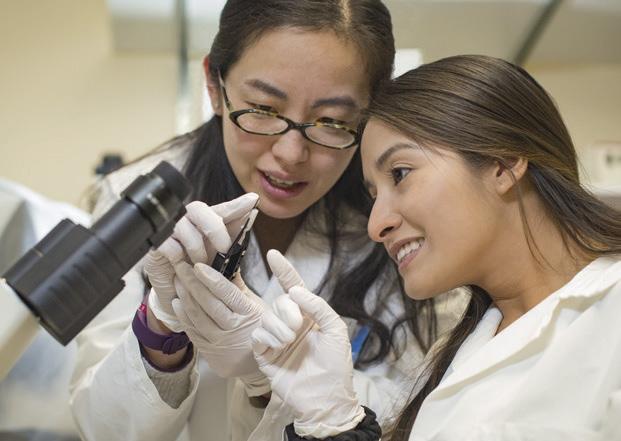
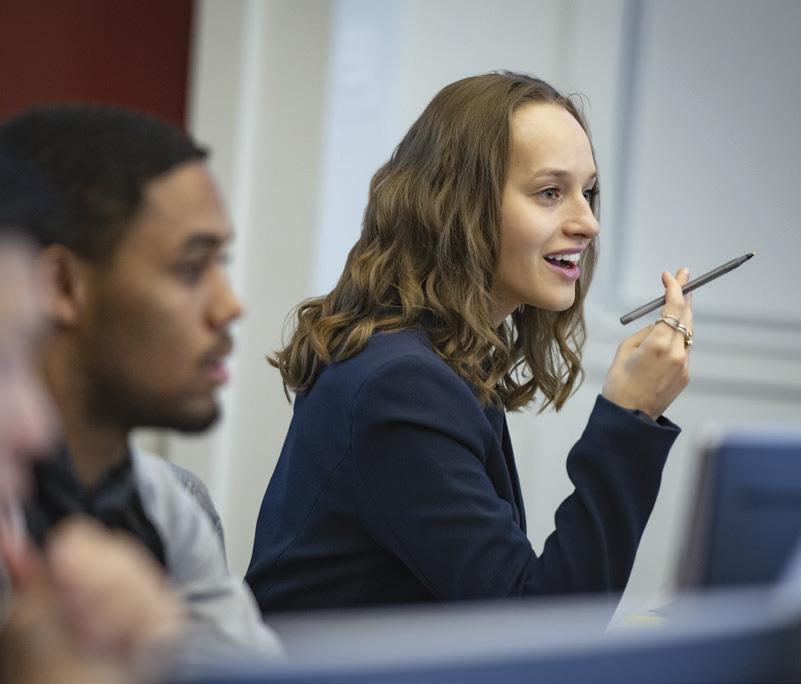
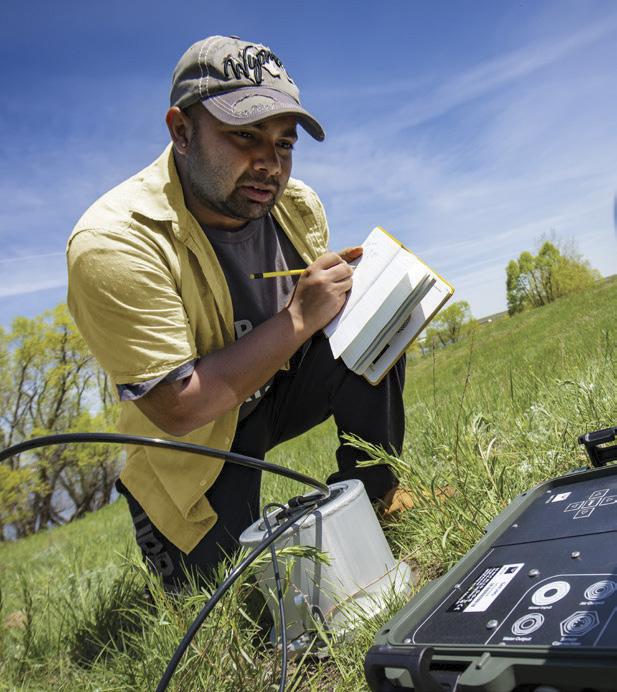


Klancy
available to students the first Friday of the month at the UW Wellness Center.

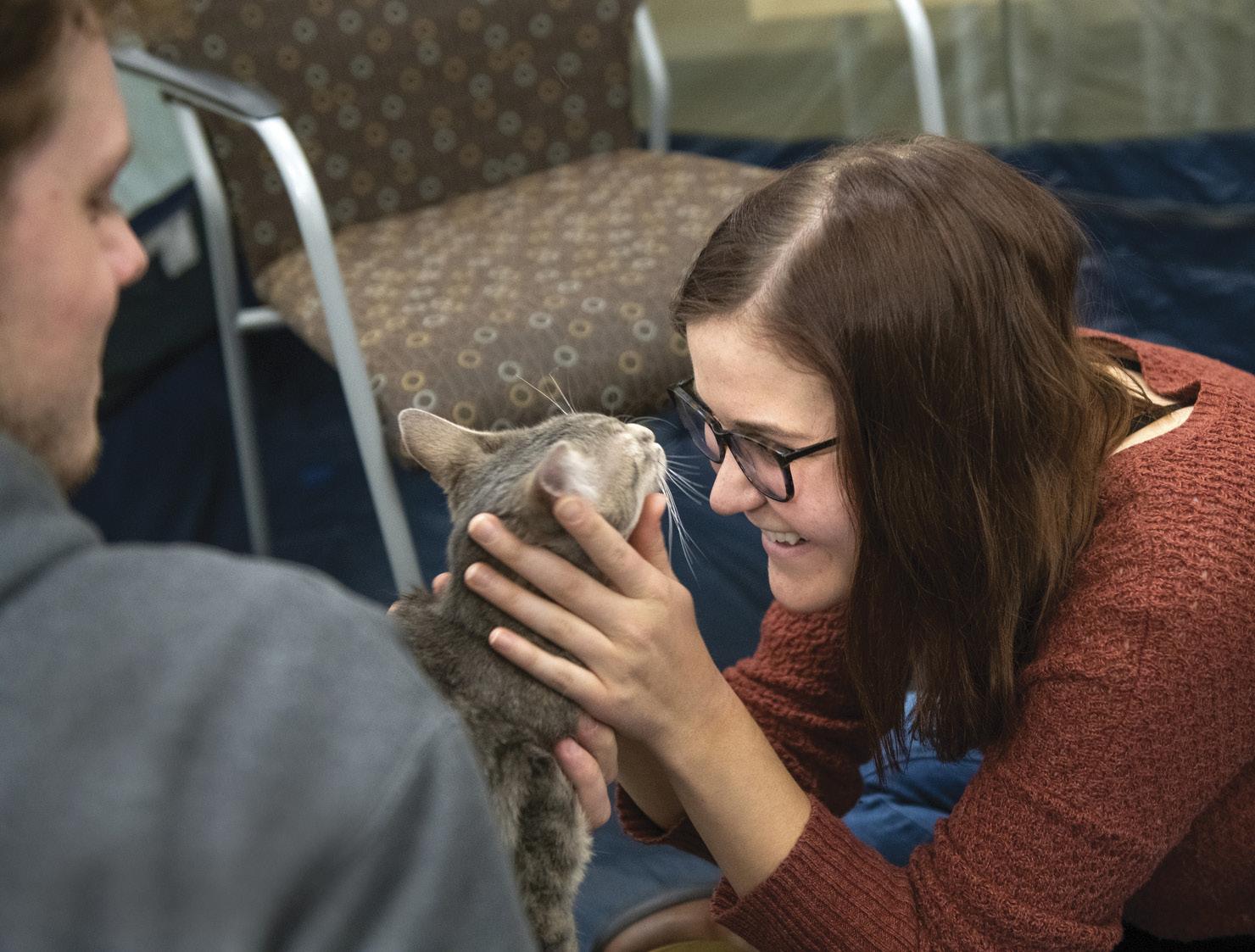
From physical health to mental health, UW offers programming and resources to help students stay happy and healthy.



Half Acre Recreation and Wellness Center (www.uwyo.edu/rec) offers a full gym, fitness classes, personal training, sports, a climbing wall and pools, as well as a host of wellness offerings and workshops. When it comes to getting active, Assistant Director of Campus Recreation Lena Newlin offers her top tips.
• Look for and try things that interest you. There’s something for everyone, including dozens of club and intramural sports. The gym and classes are free to full-time students, and you also get two free personal training sessions. In addition, there’s an athletic trainer on staff to help students with injury prevention or sports-related treatments.
• Buddy up—exercising with a friend is more fun and helps you stay committed.
• The Laramie area is home to every type of outdoor recreation imaginable. UW’s Outdoor Program offers outings as well as equipment rentals—from bikes to kayaks and skis.

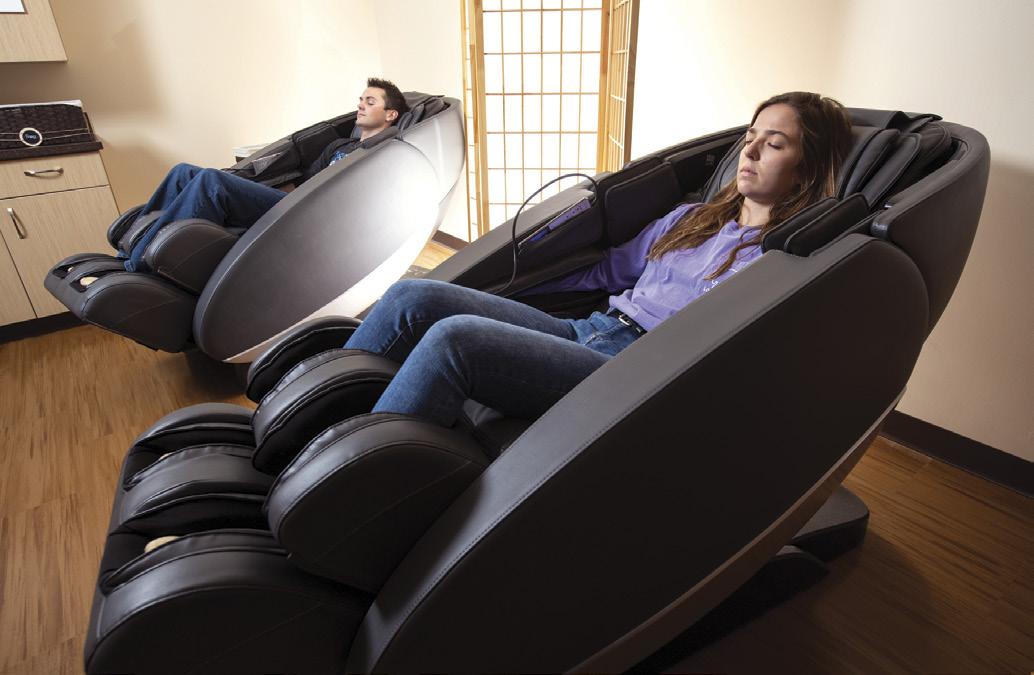
• All our experts agree that sleep and exercise are two key components to staying mentally and physically healthy, so make both a priority.
Newlin also recommends students partake in Wellness Center offerings.
• Try one of the many workshops, such as mindfulness and meditation or drop-in meditation. “Our brains will naturally worry about what happened in the past or what might happen in the future,” Newlin says. “Those are stressful places to be. Mindfulness and meditation can help you appreciate, enjoy and be happy in the present.”
• Missing your pets? Stop by the Wellness Center for puppy play dates with therapy dogs or kitty cuddle time with adoptable kittens.
• Visit the Zen Den, a comfy cozy room in the Wellness Center where you can meditate, sleep on the bean bag chairs, use the art materials, or play a brain game or fidget puzzle.
• Students can reserve a massage chair individually or with a friend.
• Grab some fruit during free fruit Fridays, or use the smoothie bike the first Friday of every month.
• The Wellness Center is also home to student Wellness Ambassadors, the HOPES program (Healthy Options for the Prevention and Education of Substances) and the Lifesavers Initiative, which aims to promote mental health and prevent suicide.
The University Counseling Center (UCC) provides free, confidential, time-effective, short term mental health services for students (www.uwyo.edu/ucc, 341 Knight Hall, 307-766-2187 or 307-766-8989 after hours).
• If you are struggling, make an appointment. Common reasons for contacting the center include academic issues, stress management, behavior problems, partner violence, changing eating patterns, feeling unusually emotional, identity concerns, isolation, a traumatic event or interpersonal problems. Sessions can be in person or via Zoom. “Mental health is as important as physical health,” says Director Toi Geil. “Seeing a counselor is like going to your primary care doctor. You see them when you’re not feeling well.”
• The UCC uses a stepped care approach to treatment that includes psychoeducational materials, workshops, groups, solution-focused follow-up meetings and time-effective and short-term counseling.
• The professional UCC staff of licensed mental health providers includes a trauma specialist and a diversity/ multicultural specialist. While UCC doesn’t offer long-term individual therapy, the center can refer you to other resources depending on your needs, including UW’s Psychology Center and WellSpring Counseling Clinic.
• In addition to its counseling, groups and workshops, UCC is home to UW’s Alcohol Wellness Alternatives, Research, and Education (AWARE) Program for students and Gatekeepers Suicide Prevention Training for students, faculty, staff and community members.
For UW students, primary care services are offered right on campus at Student Health Service (www.uwyo.edu/shser).
Director and Primary Care Nurse Practitioner Mary Beth Bender highlights important information for students.
• Eligible students don’t need insurance to use the clinic. Student fees cover office visits. For services that do have a charge such as lab testing, fees are kept low.
• You can make an appointment for a variety of issues, including illness, injury, men’s and women’s health, mental health, chronic medical conditions, preventative medicine and physicals. Student Health also offers a lab and pharmacy.
• Services are confidential. Arrive 15 minutes early to fill out forms. As an adult, it’s important you know the information to fill out medical intake forms. This information includes your medical history, your family medical history, your emergency contacts, any medications you take (name and dosage) and any allergies you have.

You’ll also want to make sure you have an up-todate copy of your vaccination history before you arrive at UW.
• Pack a health kit when you come to college with items including a thermometer, BandAids and any over-the-counter medications you may commonly need such as Tylenol and cold medicine. Although you won’t need to use your insurance card for visits at Student Health, make sure you have a copy on hand for use at pharmacies or off-campus health facilities if needed.

Make “you” time. “Try to stay focused on school between 9 a.m. and 5 p.m. or so—that way whenever it’s outside those hours you can take time for yourself.”
–Alec Wallen, Round Rock, Texas, senior, dual major in geology major and environmental system science, certificate in GIS
“I have one day a week that is dedicated to doing things that I want to do. It gives me something to look forward to every week so I can have a mental break from school.” –Ciara Thompson, Sterling, Colo., junior, social work with minors in disabilities studies and psychology
“Making time and making your mental and physical health a priority is so crucial to your success in college. Whatever you do to fill up your cup.” –Erin McDonald, Colorado Springs, Colo., junior, chemistry
Exercise. “Half Acre is always available, and there’s so much to do there! If going to the gym isn’t your thing, try to take a walk around downtown. Fresh air and a peaceful walk around Laramie will always be impactful.”
–Abigail Klenk, Loveland, Colo., senior, social studies secondary education and history with an ESL endorsement
Find what fulfills you. “For mental health, I try to take time to do things that make me feel fulfilled. I will make time to paint, or sing, or find ways to be creative as a pick-me-up when I am feeling down. I will also start my morning out with a 10-minute yoga routine when I know I will have a big day ahead of me, so I can start the day with mindfulness and a clear head.” –CeeJay Berg, Rock Springs, Wyo., senior, accounting and economics, minors in honors and finance
Multicultural Affairs aims to advocate with and for marginalized students and offers student support groups, a speaker series, leadership development, scholarships and resource centers. The Multicultural Resource Center and Rainbow Resource Center are both located on the main level of the Wyoming Union, and the Native American Education, Research and Cultural Center is located on Ivinson and Eighth streets.
“We really work hard to create space for those students and bring them together in community,” says Multicultural Affairs Program Director Melanie Vigil. “We do leadership development activities and special resource center nights. We offer a students of color circle every Wednesday and a LGBTQIA circle on Thursdays.”
At the circles, students enjoy lunch and sense of community, as well as discussions about identity and how to navigate challenges and share successes. The circles host guest speakers and celebrations. Vigil and her staff members also serve as advisers for a number of identity-related student clubs, such as Movimiento Estudiantil Chicanx de Aztlán (MEChA) and the Queer Community Coalition.
To learn more, stop by the Multicultural Affairs offices in the Union, or visit www.uwyo.edu/oma.
Use your support system and campus resources. “I’ve utilized Student Health and the Counseling Center.” –Emilygrace Piel, Cheyenne, Wyo., senior, theater and dance design tech management, focus in stage management
“I make time to see or talk to my family because that makes me feel better when I am down.”
–Emily Powell, Windsor, Colo., graduate student, pharmacy
Make nutrition a priority. “I try to make an effort to eat healthy! I absolutely love cooking, so finding quick and nutritious meal solutions is something that helps me out a lot.” –Lona van der Linden, San Diego, Calif., sophomore, computer science
By Student Riley Box
Soon, picture-perfect spring and summer will give way to winter in Laramie. It seems to sneak up and hit us like a truck. Here are some tips to help you survive—and enjoy—the winter!
1: Bundle Up! Don’t count on your professor canceling class because of the frigid conditions—because they won’t. This may seem like a “duh” moment, but many times when we leave the house, it is much colder than we think. Make sure to layer up and don’t forget the hat and mittens because the winds in Laramie can be ice cold. Side note: Have fun with this! You may not have ever been in this weather, so enjoy it!
2: Find Shortcuts. In the Laramie winter, there is absolutely no shame cutting through one building to get to another building. Utilize the heat provided in the buildings to stave off some unwanted frostbite. Trust me, everyone else is doing it too.
3: Make your residence hall room or home cozy. When it’s freezing cold outside, it’s nice to come home to your safe space. The homework and online classes will feel much, much better in these conditions. Bake something, snuggle up with a book, or grab a fuzzy blanket and stream your favorite show.
4: Just have fun! Winter may not be for everyone, but you can use UW resources to find the best winter activities the area has to offer. The Outdoor Program is a great place to start (www.uwyo.edu/rec/outdoor-program). I would suggest skiing and snowboarding at the Snowy Range Ski Area or winter hiking, cross-country skiing and snowshoeing up at Vedauwoo and Happy Jack. Do you want to live more on the edge? Try snowmobiling in Medicine Bow National Forest just an hour away. No matter what you want to do, I promise you that the Laramie winter has much more to offer than you might expect.
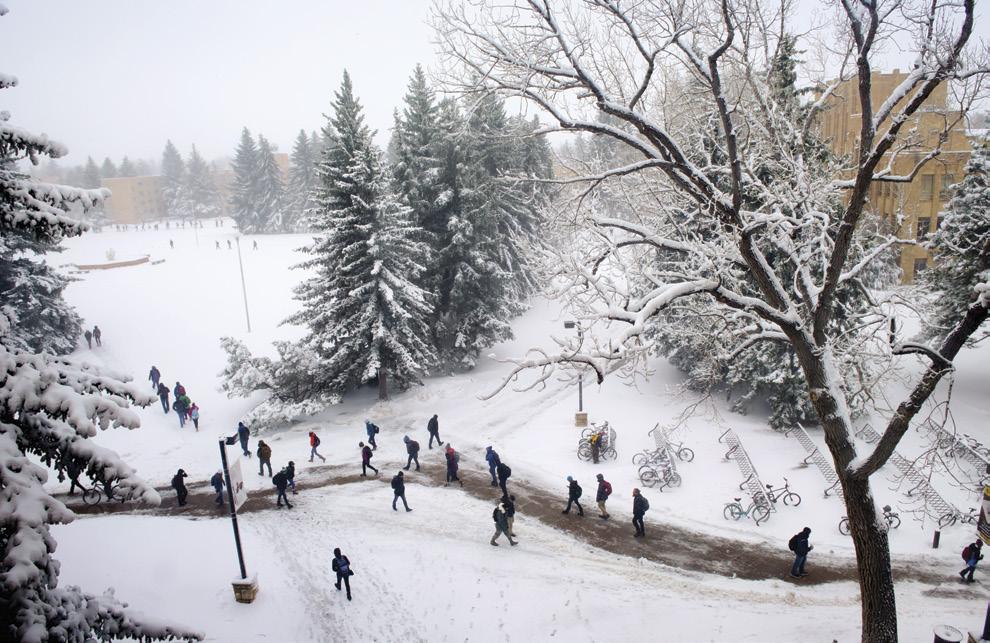
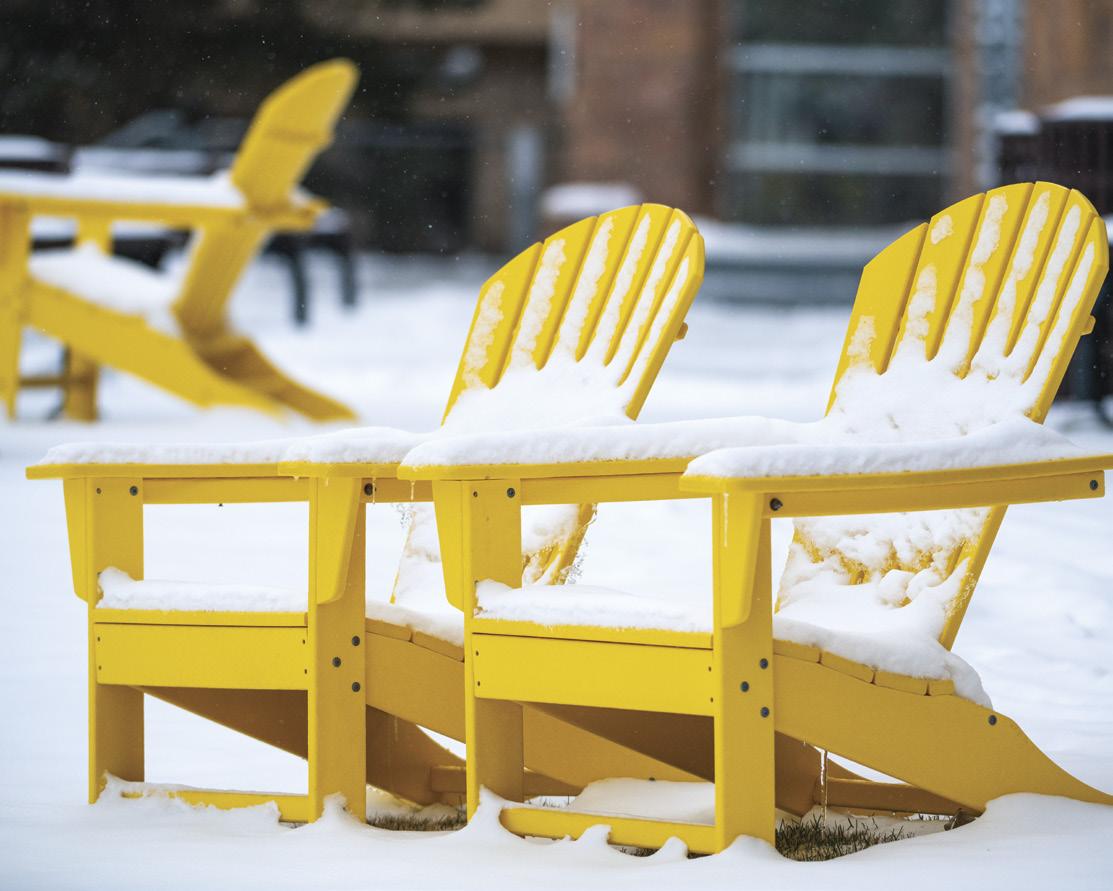

Students have backgrounds in pharmacy, nursing, medicine, social work, kinesiology, and many others
The UW School of Pharmacy offers an online master of science in health services administration program that is designed for working professionals and it requires two years of part-time study. Working together, UW can give you the credentials and skills you need to either advance in your current employment or move up into a new and exciting career path in the healthcare arena. We offer both spring and fall admissions. SCAN
Students try to
Tradition has it that making the shot equals better test grades.
Meet the mascots and discover all the best University of Wyoming traditions.



Pistol Pete is a cowboy with a big costume head, but it wasn’t always that way. Once upon a time, he was an actual cowboy who loved attending games and beating on his drum. It’s hard to say when the first cowboy mascot came on the scene—a horse and rider can be seen in a 1912 football game photo. In the 1960s, a Pistol Pete logo was commissioned. Oklahoma State University eventually sued over the likeness to its own Pistol Pete, and now both universities must adhere to certain specifications. By the late 1970s, the costume head was added to UW’s mascot, and eventually the Spirit Squad took over training and recruiting students for the role. They say the hardest part is running across the field with the flag at the start of football games. There’s a fan to provide cooling inside the costume, but it still gets hot. However, the students behind Pete love getting a front row seat to all the action at 200 events a year and interacting with fans, who flock to get their photos taken.
As a student or athletics fan, there are three songs you need to know. The official fight song is “Fight Wyoming Fight,” while unofficial favorites include “Ragtime Cowboy Joe” and “In Heaven There Is No Beer,” aka “The Beer Song.” Throughout the
history of the university, there were many fight songs. The current, “Fight Wyoming Fight,” was composed by Sheridan doctor Peter Schunk, who won the fight song contest. It was first performed during the Homecoming Sing in 1950. Another fan favorite is “Ragtime Cowboy Joe.” Be prepared to get up and dance for your chance to make it on the video board at games. The original version was written in 1912 by Grant Clarke and performed by many musicians. It’s said that physical education Professor Edwin Stroup arranged the song for Wyoming in the early 1960s. Of all the traditions, the beer song ranked highest among the students we interviewed, and fans will demand the Western Thunder Marching Band belt it out wherever the band appears. It came on the scene after the polka documentary In Heaven There Is No Beer came out in 1984. However, we’re not the only university that sings it.
UW’s colors—brown and gold—were inspired by the brown-eyed susan flower. But originally the gold was called yellow. UW switched to calling it gold in the 1960s.
UW’s horse and rider symbol is based on the 1903 photo of the bucking horse Steamboat ridden by cowboy Guy Holt at the Albany Country Fair snapped by UW Professor B.C. Buffum. It appeared on baseball uniforms in 1921 but wasn’t placed on football helmets until the early 1960s. The logo is synonymous with both UW and the state of Wyoming.
If you attend UW football games, you’re bound to spot “barrel guy”— a man wearing a colorful brown and gold barrel with cowboy boots. His real name is Ken Koretos. He’s just a fan—though a big fan. You can also spot him at basketball games sans barrel. Another unofficial tradition is Haystack Rock located along Highway 287 between Laramie and Fort Collins. Sometimes—especially near the Border War—it’s painted brown and gold with a “Go Wyo” or other UW-related message, and sometimes it’s green with a Colorado State University message. Other times it has nothing to do with either school and is simply a young lover proposing, an RIP tribute or other message.
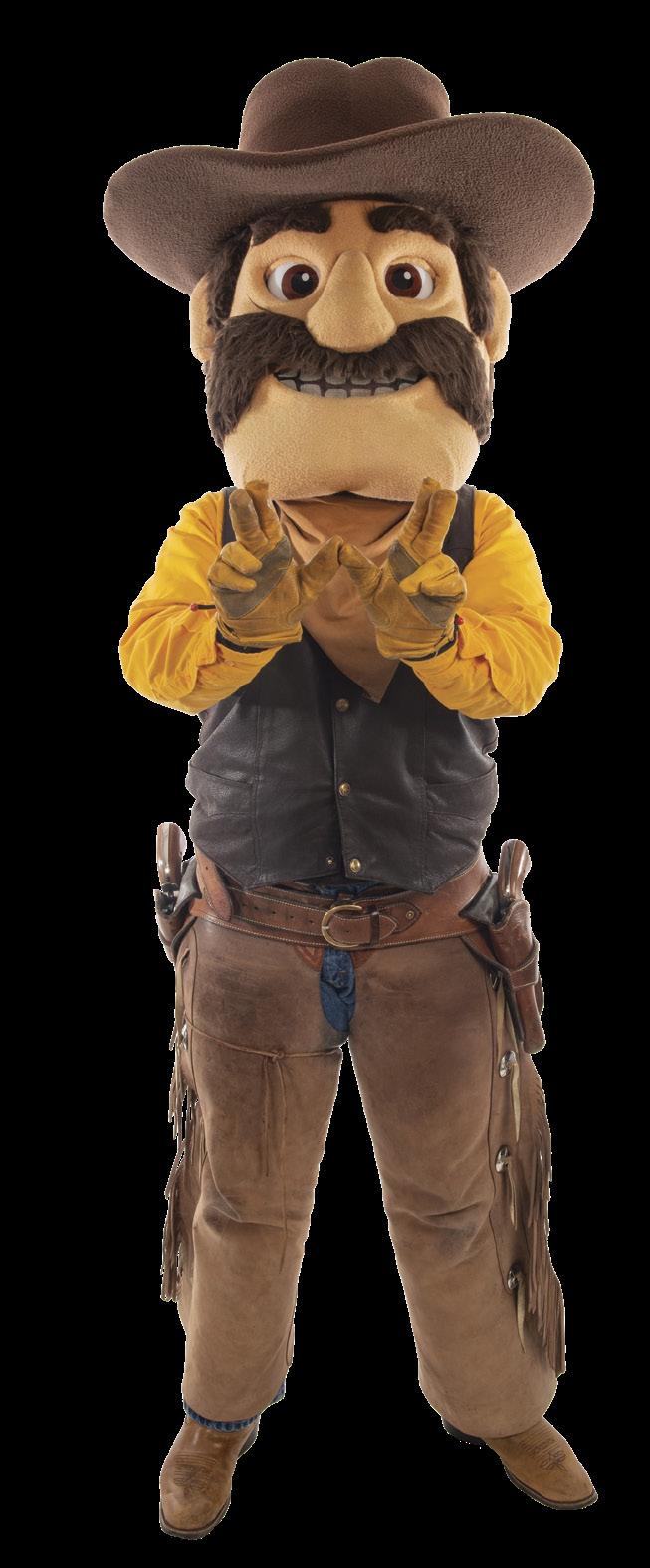
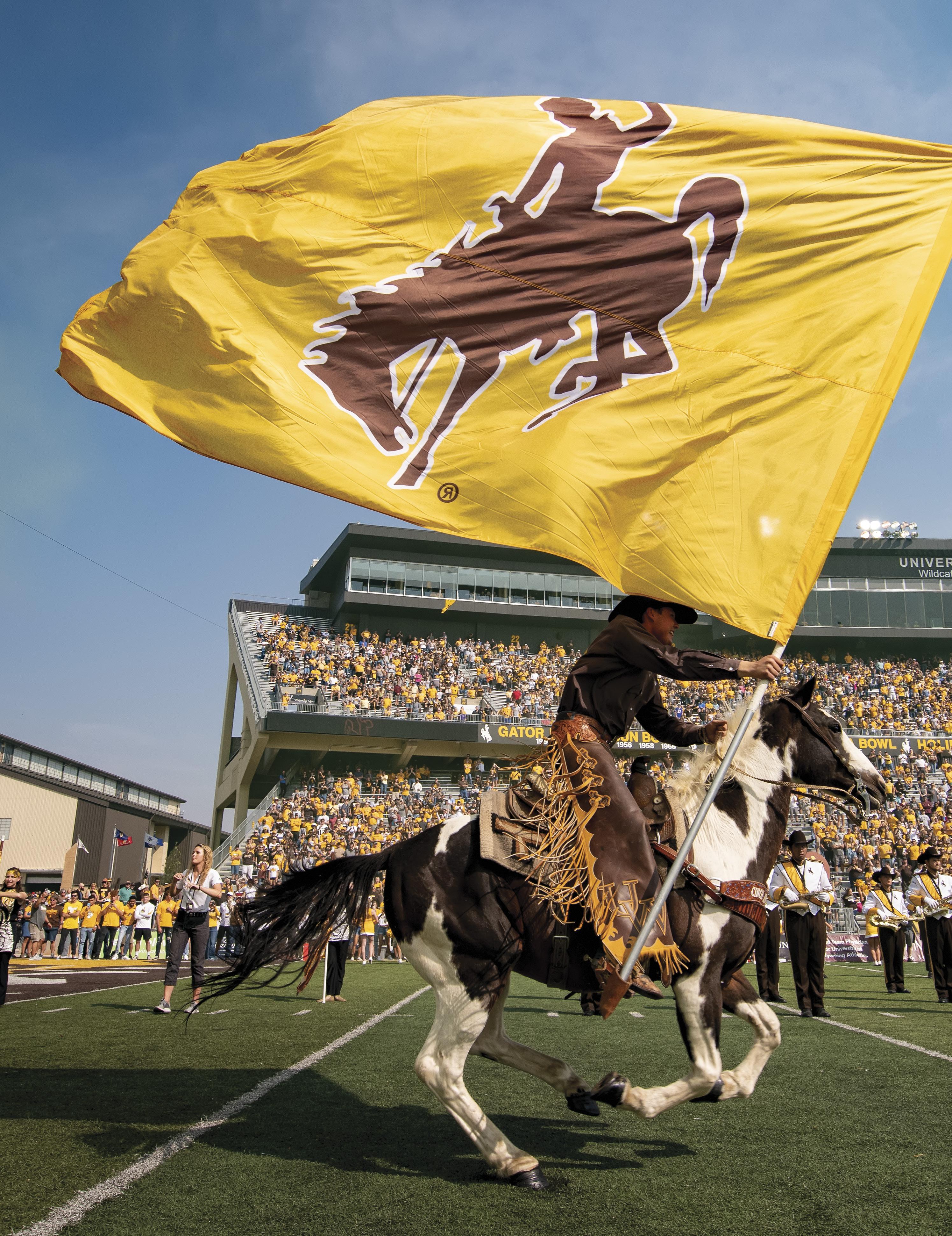
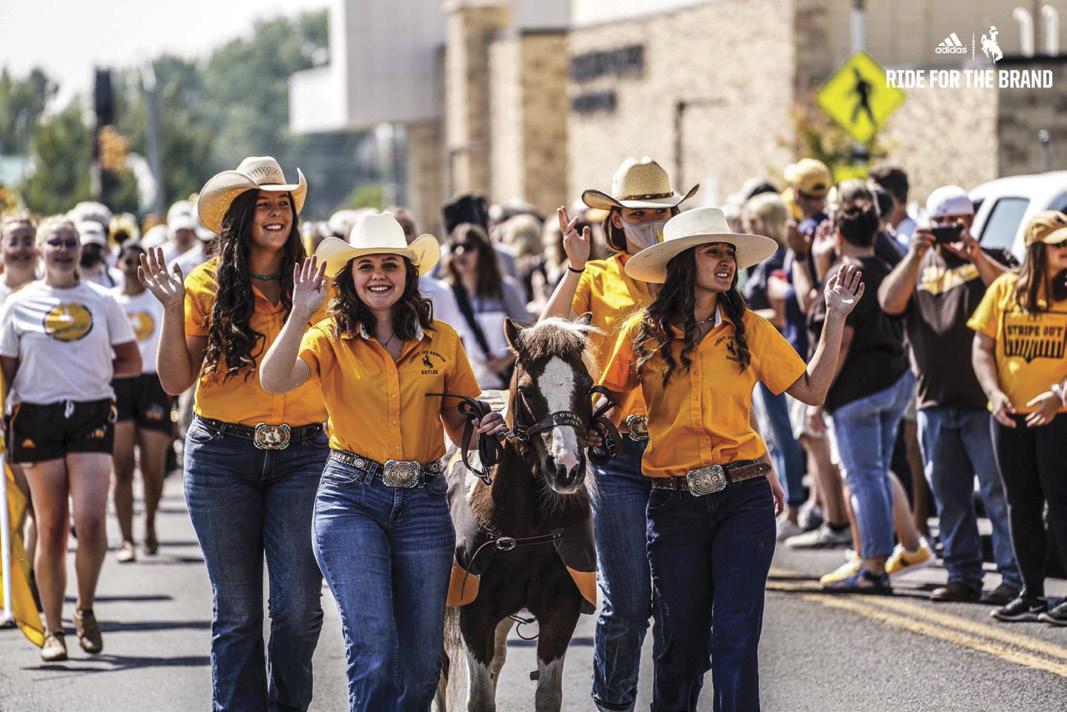


UW’s biggest sporting rival is by far Colorado State University, located just an hour south in Fort Collins. Whenever UW plays CSU, it’s considered a “Border War,” and you can hear the chant “Beat the Sheep!” and other less savory calls. They first played each other in football in 1899, and this year marked the 113th game. In 1968, Vietnam veteran Dan Romero donated a boot he wore in the war, and it was bronzed, creating the Bronze Boot traveling trophy. UW has won five of the last six meetings of the Border War football series. Back in the day, the rivalry was heated, with fans from each school committing illegal acts, such as kidnapping each other’s mascots. Luckily, the significance of the Bronze Boot and what it represents have brought honor to the game, and such petty acts are now a thing of the past. Many traditions surround the big game, including the annual running of the game ball by the two schools’ ROTC detachments who meet along Highway 287. In addition to the Bronze Boot, two other traveling trophies are contested each year: the Paniolo Trophy (the Hawai’ian word for Cowboy) with Hawaii and the Bridger Rifle with Utah State.
One lost tradition is W Hill. You can still faintly see the W north of town near the aptly named W Hill Road, but the W hasn’t been painted since the 1960s, and development has now encroached on the area.
When War Memorial Stadium opened in the fall of 1950—named in honor of the
two world wars and the brave men and women who served—UW gained a new mascot. That mascot was a feisty Shetland pony named Cowboy Joe who was donated by the Farthing family of Cheyenne. Since then, Cowboy Joe has been a fixture at football games, parades and other events. The current Cowboy Joe is the fifth donated pony, also from Farthing Ranch, and is 10 years old. We spoke with his head handler, senior Julia Halmay of Dubois, Wyo., who is majoring in animal science with equine concentration and an agricultural business minor, for some fun facts about Cowboy Joe.
A day in the life: When he’s not trotting on the turf to celebrate a Cowboys’ touchdown or taking part in his many other public-facing events, Cowboy Joe likes kicking back at the Laramie Research and Extension Center farm, hanging out with his best friends Pistol and Pete.
Pet Peeves: Cowboy Joe hates dieting. But like many ponies, his appetite is bigger than his stature, and he has to watch his figure and can’t chow down on too many treats. He also can’t stand standing still. After all, he’s supposed to be burning calories, right? Another thing he doesn’t like is fireworks.
Personality: He’s a Shetland pony—need we say more? If you’re not familiar with pony attitudes, they can be summed up in one word: sassy.
Favorite things: Although Cowboy Joe gives his handlers sass, he loves kids and pulls out the charm for them. He also loves a good scratch behind the ears. When he hears the Western Thunder Marching band launching into “Ragtime Cowboy Joe,” he gets excited and knows it’s his time to shine.
About six years ago, a new horse came on the scene: a flashy paint charging across the field at the start of each football game. The starring role first went to Hawk, but he recently retired, replaced by the 4-year-old American Paint Horse/Percheron cross named War Paint. Both are owned by the Romsa family. We spoke with rider Lane Romsa—who loves the adrenaline rush of riding in the games—to learn more.
Practice makes perfect: Horses are sensitive to loud noises and unusual sights, so it took some practice to prepare War Paint for his first football game, but it all went smoothly.
A day in the life: War Paint lives near the Laramie River and even has his own padded stall. When it’s not football season, you can find him moving cattle or riding in parades.
A mellow dude: Although just a youngster, War Paint is naturally calmer than his predecessor. But when he gets on the field, he knows it’s time to get flashy. He loves being the center of attention. He also enjoys kids and getting lots of pats.
Not all horses play football. To celebrate the 125th anniversary of agriculture extension at UW in 2016, a team of Haflinger horses was purchased to pull the historic sheep wagon and serve as mascots. In true UW style, they were named Pistol and Pete. That team since retired, and a new Pistol and Pete are on the scene. Laramie Research and Extension Center Assistant Manager Elias Hutchinson gave us the lowdown on the pair.
Meet the team: Haflingers are an Austrian light draft breed, perfect for pulling wagons. Pistol is 7 and Pete is 6. Both are approximately 14.2 hands high and weigh around 1,100 pounds.
A Day in the Life: Pistol and Pete live with Cowboy Joe Pony at the Laramie center. The pair travel the state to the various agriculture experiment stations, giving wagon rides and appearing in events. When they’re not traveling, they pull a hay wagon to teach students driving with a team, and together they feed the livestock at the experiment station.
Personality plus: Pistol and Pete have distinct personalities. Pistol is
all business, while Pete is goofier and likes to get into trouble, such as finding that hidden stash of hay to pork out on. Little girls love horses, and Pete can’t wait to get his photo taken with them—greeting them with a gentle nuzzle. But, like Cowboy Joe, he doesn’t like standing around.
“My favorite UW tradition is throwing a pine cone into the dinosaur’s mouth for good luck on a tough exam,” says senior CeeJay Berg, an accounting and economics major with minors in honors and finance from Rock Springs, Wyo. “I have tried it, and it works!”
The copper T-Rex, built in the 1960s by the legendary Professor Doc Knight, is located in front of the Geological Museum. The cones are technically spruce, but the luck is the same. This tradition is a strong runner-up for favorite.
Homecoming takes place each October, welcoming back alumni and friends for football, a parade, class reunions and more. It coincides nicely with the beautiful colors of fall. There are also many events especially for students, including the Homecoming Sing competition, car push and Big Event service day. During the last parade, Sigma Nu and Alpha Phi took home the top prize for their float. “I enjoy the atmosphere that Homecoming brings to Laramie, participating in the parade and watching the football game,” says Alpha Phi Sorority Chapter President Andrea Perez, a senior from Cheyenne, Wyo., majoring in marketing with minor in graphic design. “Everyone comes back, and Laramie feels full again.”



Special thanks to Kevin McKinney, Tim Harkins and Danielle Cole from athletics, and American Heritage Center Archivist John R. Waggener, for their help with this article.
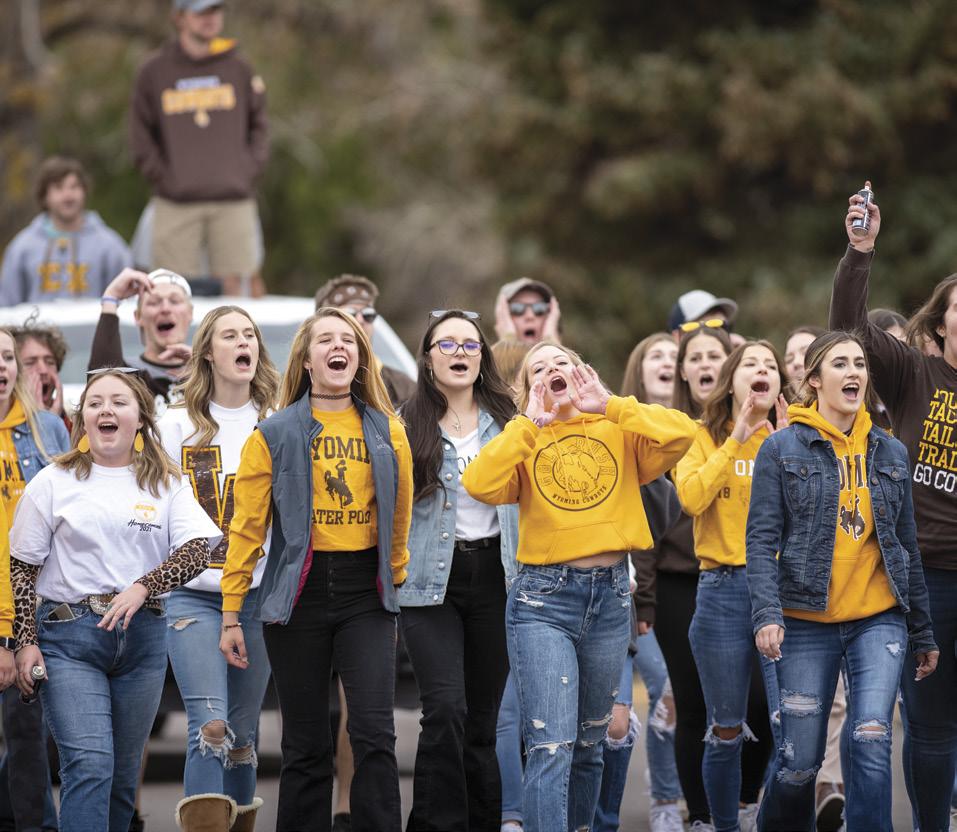
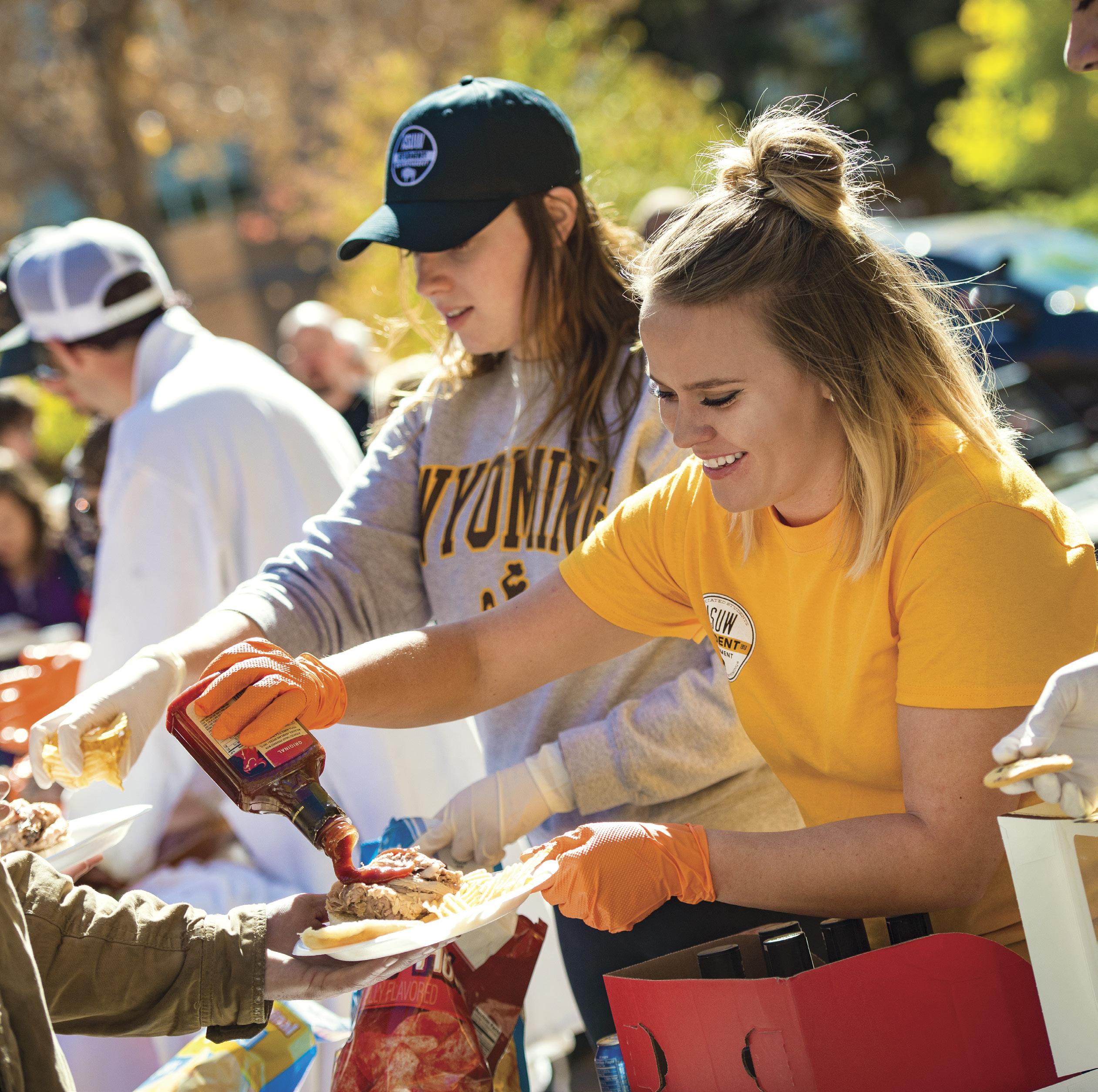
of

• Boasts 20 faculty, over 350 undergraduate majors, and three graduate programs— including the largest master’s program at UW, the Master’s in Public Administration
• Encourages students to take advantage of a wide variety of internships and study abroad opportunities with designated funding
• Develops skilled, forward-thinking leaders who will shape the future of Wyoming, the United States, and the world



www.uwyo.edu/sppais
uwyo.edu/pols

• Class schedule planning
• Early class registration
• One-on-one and small group tutoring
• Applications for free federal financial aid
• Access to key college staff and offices
• Help balancing life challenges


Interested in applying? Contact us at sss@uwyo.edu or scan this code

Interested in applying? Contact us at sss@uwyo.edu
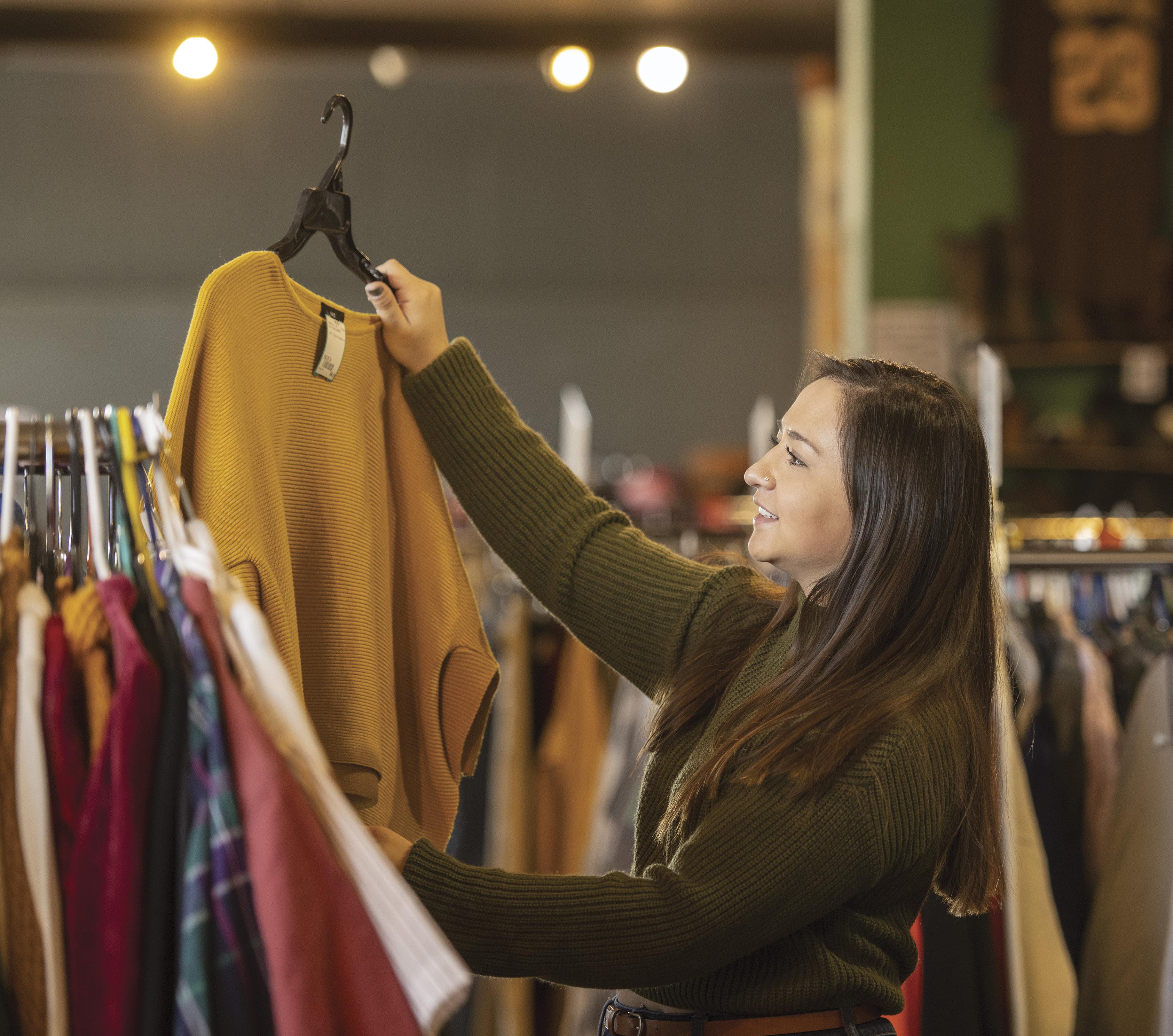
Experts and students offer their best advice from budgeting to roommates.
UniWyo Federal Credit Union is the University of Wyoming’s student financial wellness partner. As such, the bank offers financial workshops for students and partners on UW’s Financial Wellness page (www.uwyo.edu/finwellness). Vice President for Marketing Mindy Uitterdyk shares her five best budgeting tips here.
1.
Know what a budget is: It’s your income (scholarships, financial aid, help from family, work income, etc.) minus your expenses.
2.
Track it—money in and money out. There are awesome apps you can use, and many banks have their own, such as UniWyo’s Money Manager app. Or you can use the spreadsheet on UW’s Financial Wellness page or oldfashioned pen and paper. However you track it, just make sure you do. Decide the time period for your budget, such as weekly, bi-weekly or monthly. Write down everything that comes in and everything that goes out, from streaming channels to Starbucks.
3.
Define needs vs. wants. Needs include food, shelter and tuition. Wants are things like food out vs. using your meal plan or a new phone instead of your old one that still works. If you have the funds left over after all your needs, you can make a line-item in your budget for “fun money” for eating out, entertainment, etc. Also, a good rule of thumb is to save 10 percent of what you have coming in for unforeseen expenses, such as car repairs.

4.
Spend wisely. Don’t spend more than you have coming in, and look ahead at upcoming expenses. Be a savvy shopper, such as choosing store brand vs. name brand, buying used or finding freebies. Many UW events include free food, and UW offers food-share pantries for those in need, including the main one in Knight Hall 106. If you live on campus, make sure you’re utilizing your meal plan or downsize it. Don’t fall into credit card traps; they come with high interest. Also, watch out for other scams, and never give out your bank account information or passwords to third parties. In addition, be aware that student loans must be paid back with interest, so don’t accept more than you need.
5.
Learn from your mistakes, and ask for help if needed. If you get an overdraft or late fee charge, talk to your bank about it. You can also ask to meet with the bank’s financial counselor to help you with your budget or other financial questions. If you need additional funds for school, contact UW’s Scholarships and Financial Aid office, and also check out the many private scholarships offered by companies and organizations—many go un-awarded due to lack of applicants.
Many students choose to work part time during college. We asked our Cowboy Coaches about their student work and tips.
“The first job I had during college was at a restaurant where I was a server. It was beneficial because I was earning money to pay for college, and I got to meet some friends through work. However, I found that I struggled a lot with time management. Now, as a Cowboy Coach, I really enjoy how flexible the hours are and how fun the other co-workers are. I get to make connections to freshmen on campus and ensure that they have all of the resources they need to get through their first year away from home.” –Maddy Jenkins
“I have been a resident assistant, a Cowboy Coach, an office assistant and a research assistant with the McNair Scholars Program. What was beneficial is that I can spend money for myself but also to save and pay for essentials. However, it was difficult to have time for friends amongst doing school, work and time for myself.” –Alec Wallen
“Outside of being a resident assistant and a Cowboy Coach, I am a barista at the Human Bean. It was super beneficial to have a place to go where I could leave the rest of my life at the door. If you are used to time management, working on top of school is not a constant stress. There are days, however, where it all feels like too much. I think the way to combat this is to find an employer who understands and respects the fact that being a student comes first.” –Erin McDonald
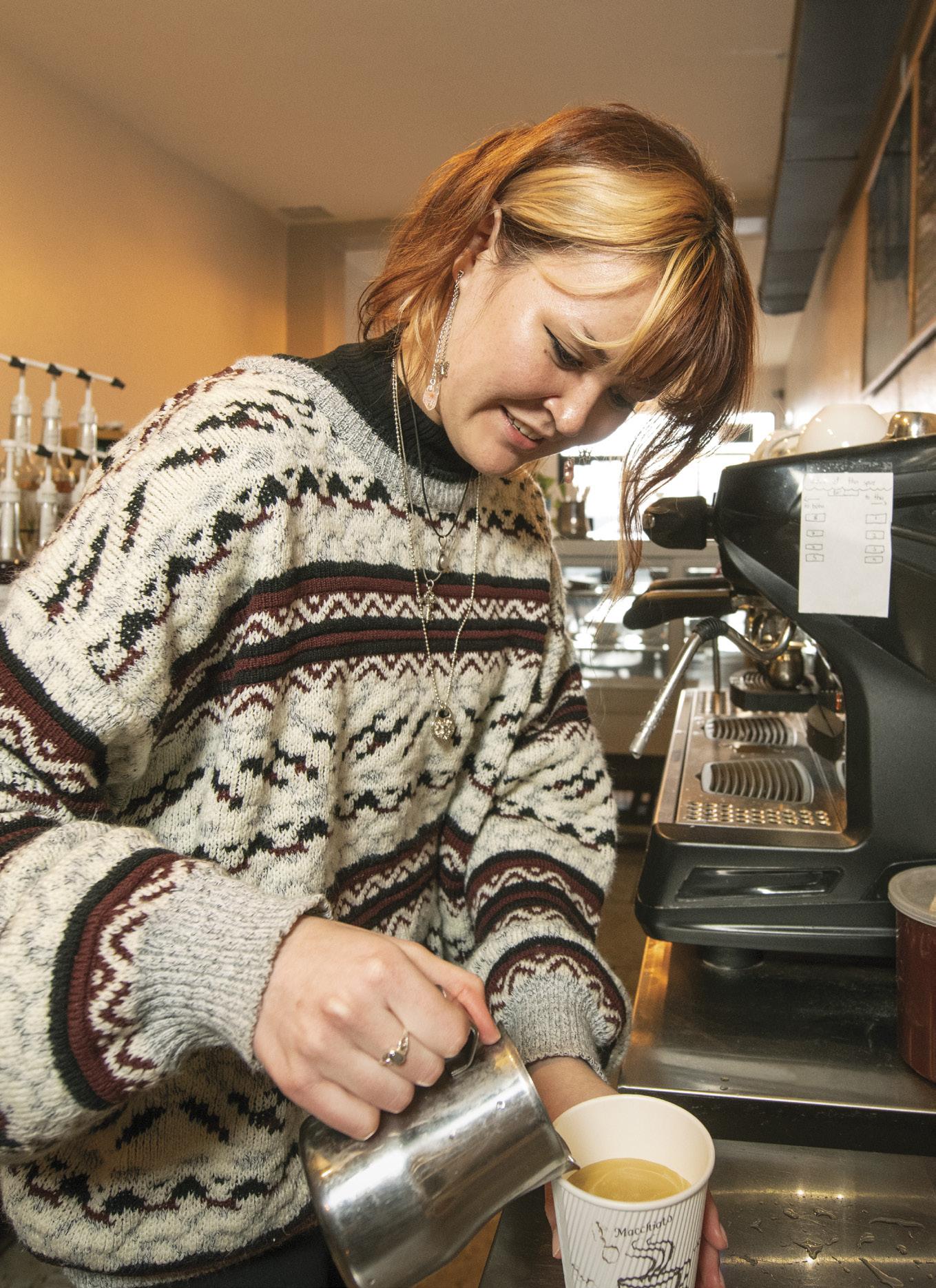
“I currently work as a barista at the Boba Café, as a dance instructor at the Laramie Dance Center and as a Cowboy Coach. The most challenging thing for me was learning where to set boundaries. I tend to overwork myself and forget that I need to take breaks too. Work less hours if it’s cutting into your schoolwork! Most local businesses are really flexible with their scheduling, and university jobs were made with students in mind. I do highly recommend getting a college job if your schedule allows for it!
You’ll get valuable experience, make connections throughout town and have some extra cash to spend.”
–Lona
van der Linden
Roommates can become your best friends, but roommate conflicts are also common. Dealing with conflicts can be good practice for life after college when you’ll have to navigate many personalities in the workplace. We asked our Cowboy Coaches for their tips on dealing with roommate conflict.


The Haub School of Environment and Natural Resources at the University of Wyoming provides opportunities for undergraduate and graduate students to engage in collaborative problem-solving around natural resource challenges. Working directly with land managers, students build the skills they need to become the next generation of creative, inclusive, environmental leaders.
One such project is close to home, at the newly-opened Pilot Hill Recreation and Habitat Management Area east of Laramie. In partnership with key stakeholders, faculty and students at the Haub School are using wildlife cameras to evaluate the impacts of non-motorized recreation on wildlife. The findings, communicated broadly, will inform sound land management decisions that support community goals.

Learn more about our programs at uwyo.edu/haub



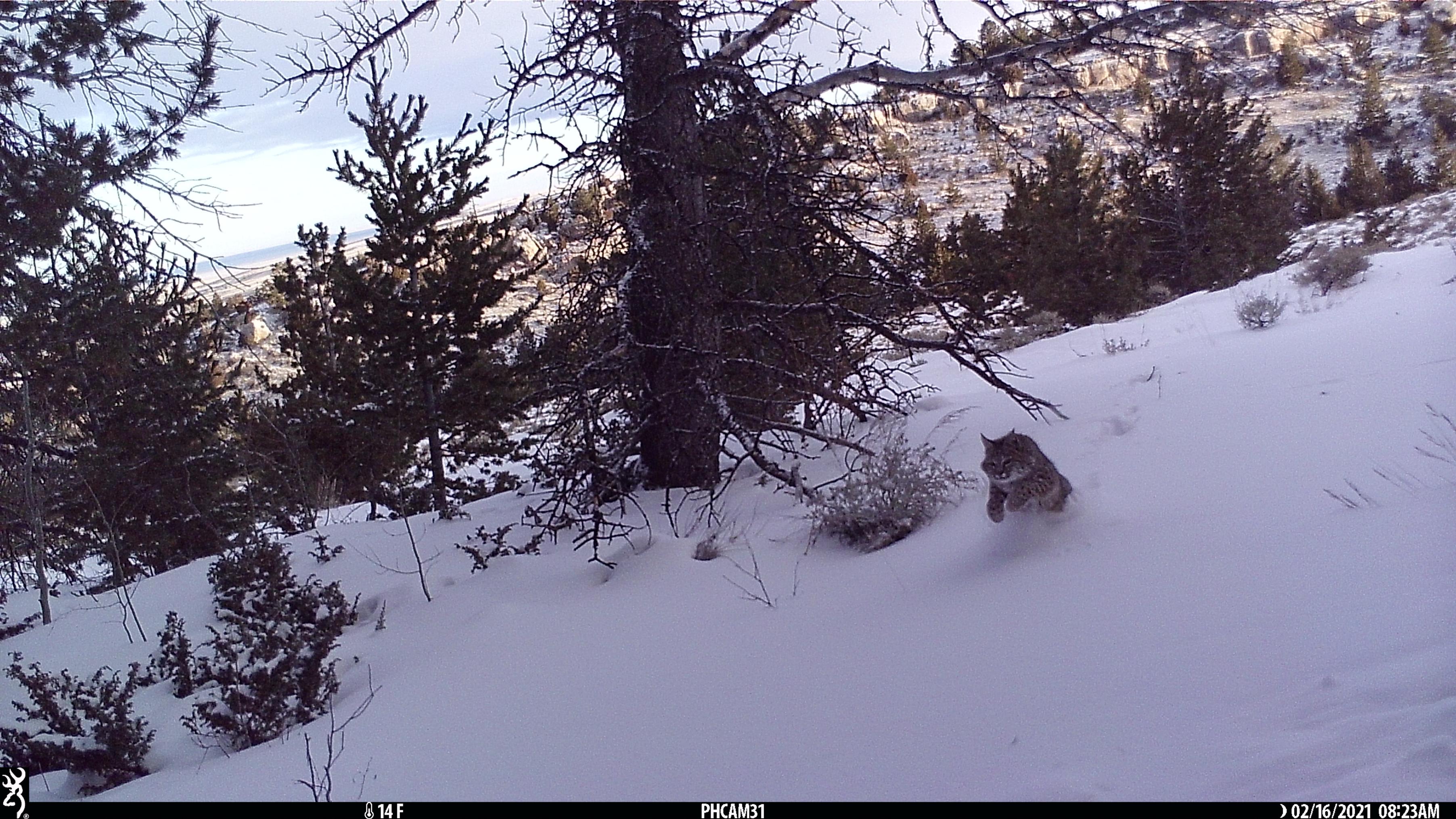

Create a plan. Before conflicts happen, talk to your roommate about how you both want to handle things that come up.
Don’t let things fester. If you have an issue, communicate it sooner rather than later in a kind and honest way.
If you live on the residence halls, talk your resident adviser if you need assistance. Other resources include your Cowboy Coach and the ombudsperson office. You can also utilize the roommate contract.
Another conflict resolution resource is UW’s restorative justice program, which is aimed at identifying and addressing harms that occur on campus. “We are implementing community talking circles for building relationships and laying the groundwork for using concepts of restorative justice to address harms,” says Restorative Justice Program Manager Connor Novotny. “Eventually, we will be using restorative practices to attend to harms pertaining to criminal and conduct-related incidents.”

What exactly does restorative justice entail? “From a restorative angle, we ask people to accept responsibility for their actions,” Novotny says. “Healing cannot take place without truth-telling. Second, we ask, ‘How is the conflict
impacting us and also others?’ Finally, we must ask who has what responsibility to set things right. What meaningful action can take place to repair harm, and what steps is each member willing to take to get there? At the end of the day, conflict impacts us as relational beings. When working to repair harm, also consider what work can be done in the future to tend to your relationships.”
Students and groups interested in restorative justice can email cnovotn1@uwyo.edu . You can also follow @RestorativeJusticeUwyo on Instagram to learn more.
By Student Riley Box
Studies show living on campus results in improved GPAs and retention rates. Living on campus also offers all the conveniences you might want, including eating at Washakie and being a small walk away from all the exciting UW events. In addition to residence halls, UW offers apartments. But, as an upperclassman, the thought of living off campus may seem appealing. Here are some tips to help you have the best college experience from a new point of view!
Laramie is a college town, which means that you will most likely find a place, but to be safe, I recommend following
Marketplace and other Facebook pages to keep an eye out for listings. If you know you are going to go to school during the fall for example, look for leases in the summertime—there is much less competition.
In addition to determining your rent budget, consider additional expenses such as utilities (electric, water, gas, etc.) and internet. Also consider parking if you have a car and transportation to and from campus such as the commuter buses.
Think about roommates. Roommates can allow for better places at cheaper costs because utilities, rent and other living expenses can be split up among all parties. If you have
roommates, make sure everyone is on the lease.
Always check out the place in person before signing a lease. Read the lease thoroughly, and make sure you’re comfortable with the conditions. Choose a length of time that fits for your living situation—most leases come in six- or 12-month increments.
Once you find a place, how do you qualify? There are multiple ways! Landlords may ask for your income (how much money you are making), or they may ask for a co-signer who is responsible for the rent if you absolutely cannot swing it. Some apartments that cater to students may also accept an added security deposit or a few months of rent in advance as an alternative way to qualify.
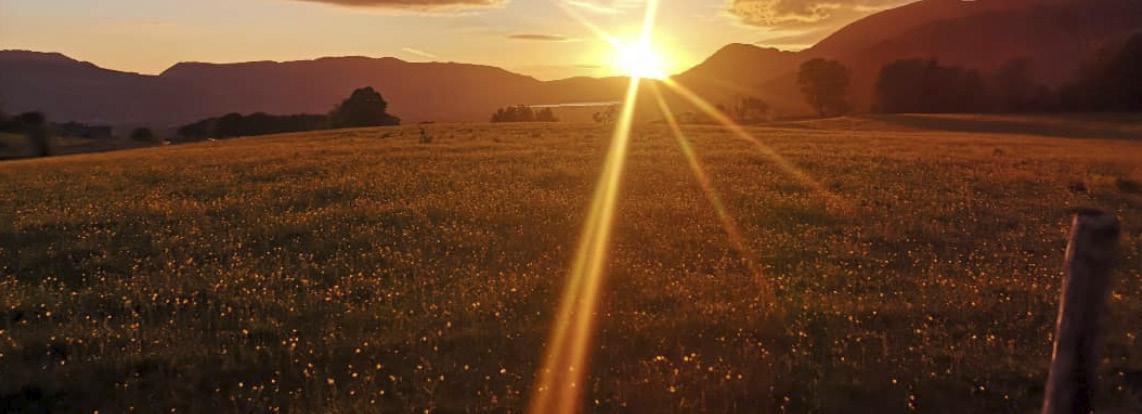


Hydrogen Energy Research Center
H2ERC o


Center for Carbon Capture and Conversion CCCC o
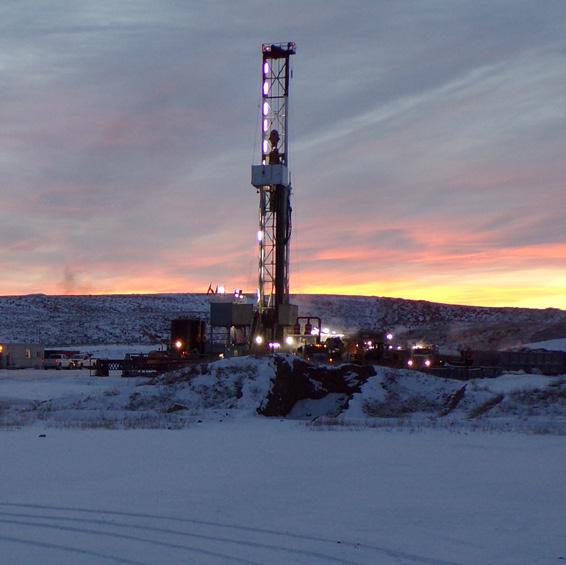
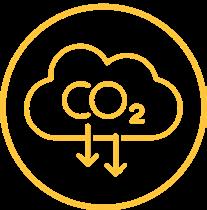
Center for Economic Geology Research CEGR o

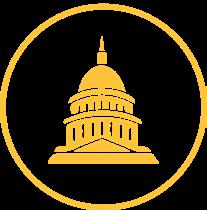
Center for Energy Regulation & Policy Analysis CERPA o
With an emphasis on research, innovation, and the commercialization of energy resources, the UW School of Energy Resources houses four major Centers of Excellence and provides funding for additional faculty-led centers on important energy topics. These Centers of Excellence bring together faculty and graduate students from multiple disciplines to develop important energy research solutions.
Other Centers of Excellence:
Shell 3D Visualization Center
Nuclear Energy Research Center
Center for Air Quality
Center for Produced Water Management
Wind Energy Research Center
Center for Biogenic Gas Research
SCAN TO LEARN MORE u



This year began with an exciting transition in the University of Wyoming Alumni Association (UWAA). The association welcomed Jack Tennant as the newest member of the team.
“The national search for this critical position provided a highly qualified candidate pool,” Vice President for Student Affairs Kim Chestnut says. “The search committee was pleased to engage with such strong leaders and even more pleased that the outcome is Jack Tennant. Jack is an exceptional and committed leader who has been working to serve his alma mater since he graduated.”
Tennant’s UW career started when he came as a student and as a student-athlete in football and wrestling in 2006. Since graduating in 2010, his professional career has grown within the university. Tennant worked for the Cowboy Joe Club in the Department of Athletics and for the UW Foundation.
“The University of Wyoming alumni immediately welcomed me into the Wyoming family as a studentathlete more than 16 years ago,” Tennant says. “As the new executive director, I’m excited to work with the UWAA team, its board of directors and UW campus partners. The UWAA staff and board have done a great job of driving the association’s mission and values. I look forward to continuing the association’s success through a variety of programs that connect all alumni to their beloved university—and to fellow alumni.”
As the successor of his mentor and friend Keener Fry, Tennant plans to build on the association’s legacy of sustaining relationships with UW alumni. Fry retired after a decade of leading the UWAA.
“From his time as a student intern at the Cowboy Joe Club in 2010, Jack has been laser focused on forging a pathway to a career in higher education external relations and development,” Fry says. “Becoming the executive director at the UWAA is a perfect fit for Jack after a progressive 10-year career in athletics and university development—most recently as the director of annual giving.”
The UWAA’s mission is to bring people together—“to build pride, loyalty and future sustainment among the UW community through communication, involvement, engagement and celebration.” For more information or to become a member of the UWAA, visit www.uwyo.edu/alumni
WYO-GOLD STUDENT ASSOCIATION PODCAST
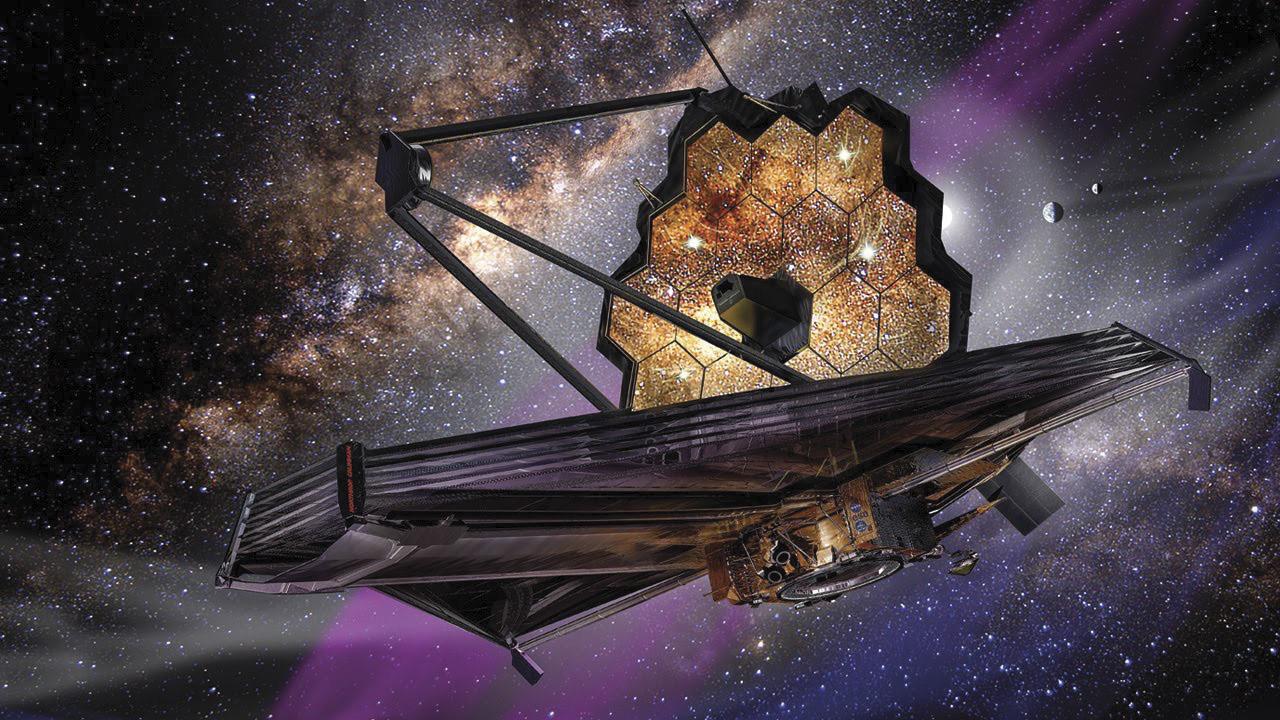
EPISODE 1



"Working on the podcast taught me new skills, like planning for an
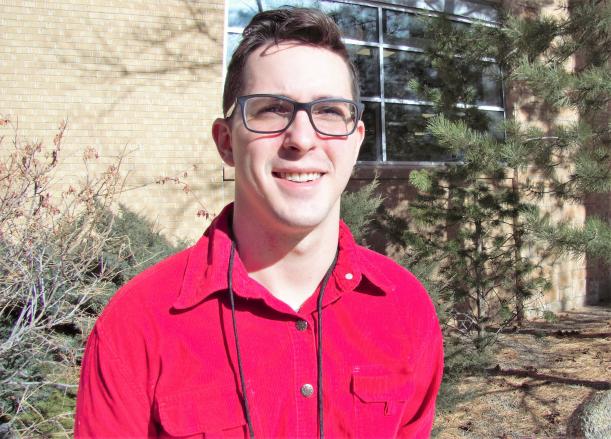
"Through Cowboy's Corner, I hope students and alumni gain an increased awareness of campus—especially of student programming and faculty e orts."
and beyond lessons in the classroom.

By Heather Baker
Professor Danny Dale has an impressive history, including earning a doctorate in physics and mentoring over 100 degree-seeking students. Dale’s background in astrophysics led to WYO-Gold students Gareth Flowers and Zander Smith interviewing him for the RSO’s pilot podcast Cowboys Corner “Space Cowboys.”
“I enjoyed making the podcast experience fun for Gareth and Zander,” Dale says. “I liked seeing the podcast’s impact—how it helped them, the struggles they went through, and then seeing them come through on the other side with a polished product.”
For over 20 years, Dale has fostered college students’ lives outside the classroom. He directs the Harry C. Vaughan Planetarium, which educates and entertains many public and private groups each week. Dale also coaches the UW women’s hockey team. In his 13 years as a coach, Dale has met students from a variety of majors.
“I get to see another slice of the UW population,” Dale says. “It’s fun to have nursing students, pre-veterinarian students and others. What I especially like about the team that I coach is that they are so welcoming. They embrace everybody.”
The women’s welcoming environment likely evolves from the warm atmosphere that Dale creates. Walking into Dale’s office, visitors are greeted by a Yoda figurine and a happy smile. Regardless of the discussion topic, Dale keeps the exchange interesting with his facts and with his sense of humor.
Dale’s far-reaching impact impressed WYO-Gold students. Flowers never had a class with Dale, but Dale inspired Flowers throughout the podcast production process. Flowers could not think of a better person to interview for piloting the Cowboys Corner series.
“Being a teacher is more than creating assignments,” says Flowers. “I know Professor Dale has been super busy between his students, his research, and his work with the new telescope and as an associate dean. But he took the time to help Zander and me with the podcast. He has gone above and beyond— exemplifying what being a teacher means.”
Regardless of his long list of accomplishments, Dale remains humble. He enjoys science fantasy such as Star Wars and theorizing over other scientists’ contributions to their fields, especially Carl Sagan. Receiving recognition as WYO-Gold’s Teacher of the Year made an impact on Dale.
“We are humans, right?” Dale says. “To hear good things about your work feels really good. It means a lot, and so I try to pay it forward. Receiving the award makes me want to double down and ensure that I recognize other people’s efforts because recognition makes a huge impact on our lives. I want our students and my colleagues to know that everything that we do is worth the effort.”
Alumni, students, community members, and campus partners joined the UW Alumni Association in a celebration of student scholarship recipients and program donors and sponsors!
Thank you for joining UW Alumni Association and please watch the scholarship recipients’ video on UW Alumni Association’s social media pages
e UWAA provides scholarships to Wyoming students, out-of-state students, and undergraduate and graduate students. Within these scholarships, awards have been added to support Wyoming community college transfer students, nontraditional students, U.S. veterans, and multicultural and Native American students.
First-year (resident, nonresident and international) and transfer student recipients are selected based on their academic achievements at the time of admission to UW. Continuing student opportunities may be based on various quali ers such as merit, nancial need or speci c student population.

Thank you to our sponsors
Ivinson Memorial Hospital
Black Hills Energy
F.A.I.R. Posse
UW Foundation
UW Division of Student A airs
Buckeye Ranch
First Federal Bank and Trust
Je and Cathy Marsh
Salt Creek Energy Scholars
WWC Engineering
Western States Bank
UniWyo Federal Credit Union
2021 Title Sponsor Wyo4News.com
Platte Valley Bank/C.H. Brown Company
Wendy Press Sweeny Attorney at Law, P.C.
UW College of Engineering and Applied Science e Maders
Cowboy Joe Club
First Interstate Bank | Laramie
First Interstate Bank | Sheridan
BUCKING HORSE AND RIDER
Keener and Lisa Fry
Western Wyoming Beverages, Inc.
Sundahl, Powers, Kapp & Martin, LLC
Zane and Jennifer Nevins
Winkelmann Chiropractic & Injury
Jane Farrell
Rich and Judy Raymond
Congratulations to our
TALK ABOUT YOUR COWBOY STATUE
By Micaela Myers
The year 2020 didn’t turn out like any of us thought it would. But for UW alumnus Pete Simpson Jr., the year was a bucking bronc that launched him from the theater scene of New York City all the way to the family ranch outside Cody, Wyo.
“At the point of COVID theater closures in March 2020, I’d just entered my 25th year of Blue Man Group and had other gigs ready to go,” Simpson says.
Simpson is the grandson of former Wyoming Gov. Milward Simpson and a son of Peter and Lynne Simpson, who started their own theatrical company, Spontaneous Theatre Productions, in the early 1970s. Simpson describes himself as shy in childhood, and once at UW, he didn’t plan on majoring in theater. But after deciding to audition for a play he loved—West Side Story—his freshman year, he was hooked. Simpson earned bachelor’s degrees in English and theater in 1993, completed a Master of Fine Arts in acting from the Denver Center Theatre Company’s National Theatre Conservatory and went straight into his successful performance career in New York City.
In addition to Blue Man Group, Simpson excels in experimental theater, earning the Obie Award for Sustained Excellence in Performance in 2017. As New York City shut down in spring 2020, Simpson, his wife, Naama, and their two children wondered what do to. They had joked in the past that a global disaster would send them escaping to Wyoming to live at the family ranch outside Cody, which had been in the family since 1933 but hadn’t been used yearround in 87 years. As the pandemic grew, they joked that it was the disaster they’d talked about and that it was time to escape. They soberly weighed their options and realized

it was no joke at all, so they decided to make the jump and call the ranch home for the next 18 months.
Between Zoom acting gigs, Simpson found himself mowing, maintaining equipment, chopping wood, chainsawing trees and chasing their neighbors’ stray horses back to their own property. He also taught his wife and kids to ski, and they enjoyed all other manner of outdoor recreation.
“The kids attended the 104-year-old Valley School,” Simpson says. “There were five total students—two of them were the teacher’s daughters. They loved the small size of the school. So much of the education was stepping outside. And they’d definitely never done bear and mountain lion drills at school before.”
Being closer to family was also great. “To finally be around extended family was really magic,” Simpson says. “We felt like the family was growing a new Wyoming root, and that’s still felt by us back in New York.”
Naama was born in Israel, and she also adapted to Wyoming, using her background in fashion to start a millinery—hat-making business—in a spare cabin.
As the months stretched on, Simpson wondered if and when theater would return and even contemplated taking a law school admission test and changing careers.
“Being around politics all my life, I knew acting and politics weren’t that far apart,” he jokes.
But slowly theater did come back. In July 2021, Simpson got the call that a previous experimental production he’d worked on—Is This A Room—was going on tour. Then, he received even more surprising news: It was going to Broadway!
“To get that call for any production is an amazing moment,” he says. “That changed everything.” While Broadway is dominated by musical theater, non-musicals



tend to have big stars. Is This A Room was different. It’s not a play script but a verbatim enactment of an FBI transcript of the agency’s interrogation of a controversial government whistleblower named Reality Winner. The fact the play made it to Broadway was itself an achievement.
Simpson and family made the decision to move back to New York, but after the wide-open spaces of the ranch, they couldn’t stomach a shoebox apartment and instead rented a house in Westchester surrounded by trees. Naama brought her hat-making business with her as well.
Simpson returned to work with a starring role in Is This A Room. The play started racking up critical acclaim and was listed as a top 10 performances and top 10 theater of 2021 by Time Magazine and the New York Times, respectively. Though it didn’t stay on Broadway long, it was later scheduled to go on tour to Berlin and Belgium.
“The Broadway run was a gift,” Simpson says. “It was a magical time.”


He wants UW students know that this type of success is possible. “Professional theater at its highest levels is often dominated by East Coast talent,” Simpson says. “It’s always made me proud to say to myself, ‘I’m walking with the best of you, and everything that’s gotten me here I got through a Rocky Mountain education.’”
His parents showed him how theater can bring communities together—across incomes, politics and sensibilities—like few community efforts can. Simpson also gives credit to UW’s “brilliant and supportive faculty.”
While the pandemic continues to keep things unpredictable, some of Simpson’s COVID-canceled projects have return dates on the horizon, and he also decided to re-enter the world of college teaching—he was an adjunct instructor at UW in 2010.
His time at the family ranch last year left him with a new appreciation for his career, Wyoming and his family. Simpson says, “I have felt like a calmer wiser man for the experience.”
Saddle Up will change the ways that student success operates and how the University of Wyoming retains students. Our program has been customized to the needs of our campus community, making sure we give students the skills they need to be successful even before their first day of college.
In 2020, the UWAA passed the keys of the Alumni House over to UW Student the connection between students’ successful
— John Houghton
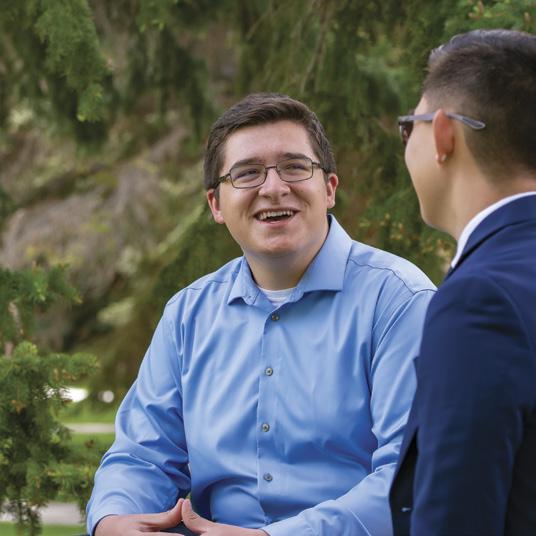

Parent and family involvement and programs are essential to student success. The Office of Student Success and Graduation cannot wait to host family-based programs throughout students’ time at UW.
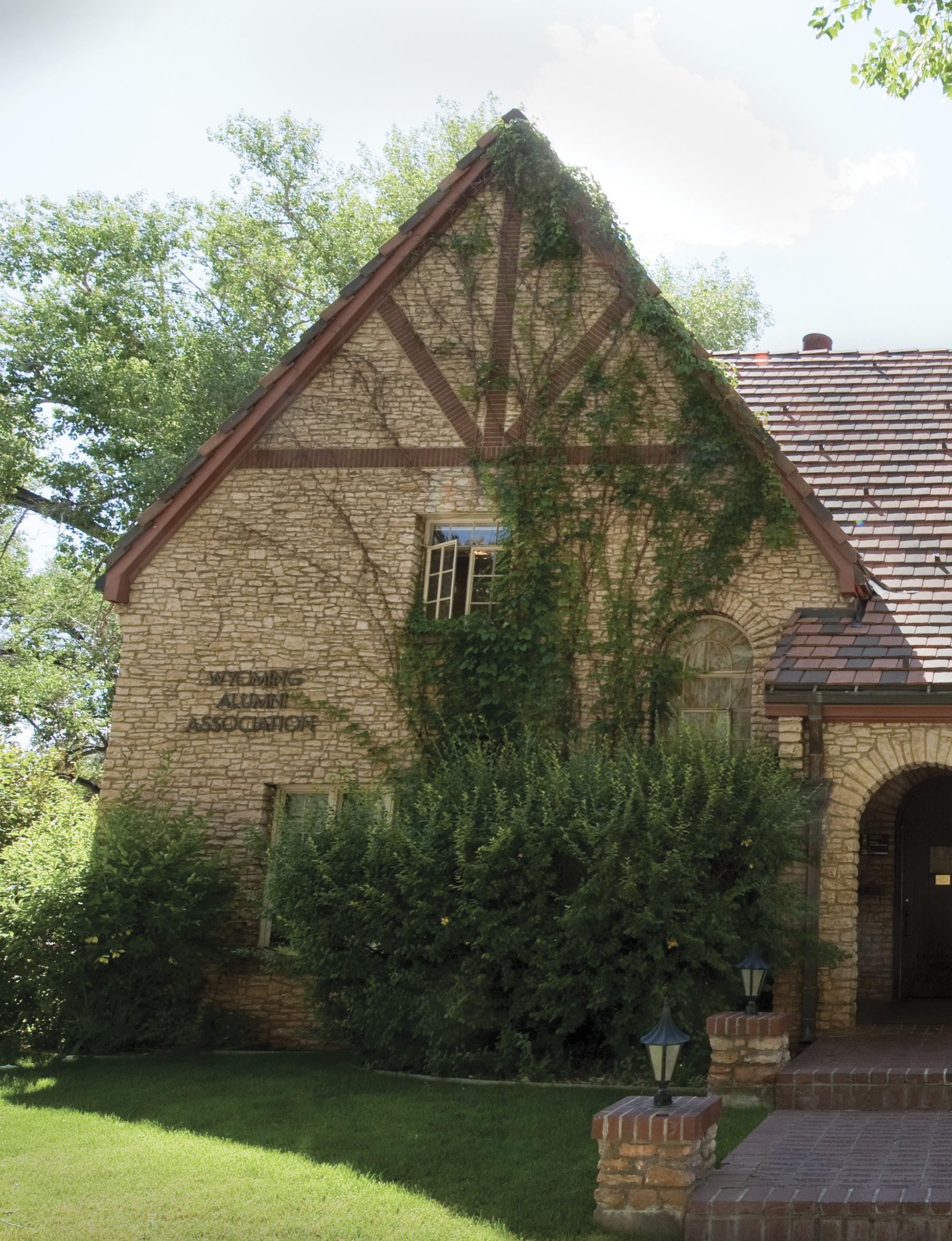
Cowboy Coaching helps students through extensive personal and academic peer mentoring. We have a team of 25 peer mentors who span across seven colleges. Our peer mentors include incredible students with loyalty to UW via various research opportunities and student programs. The Cowboy Coaches help students get connected to campus and make the most of their college experience with their diversity of life experiences.
— Riley Talamantes — Jadeen Mathis
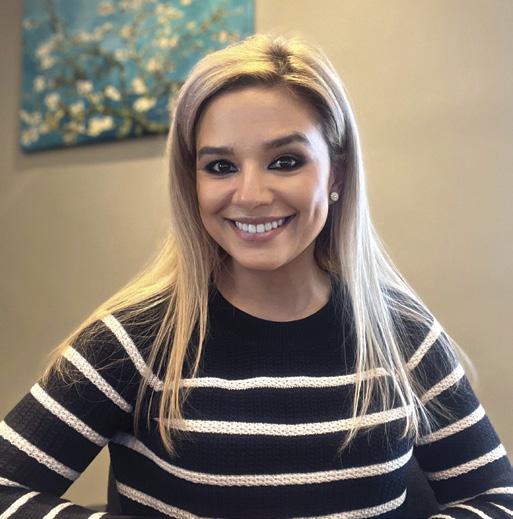
Student Success and Graduation Hub employees—a transition symbolizing journeys and their becoming active alumni.

With great pride and tradition, we honor the achievements of our graduates through commencement.



Success begins with building a strong foundation and helping students find their passion at UW. The Office of Student Success and Graduation seeks to remove barriers toward timely graduation by offering programs that enhance students’ academic and extracurricular journeys.
— Nycole Courtney
The UW Alumni Association proudly connects alumni back to their alma mater through communication, involvement, engagement and celebration. We take pride in continuing the tradition of promoting success for Cowboys and Cowgirls throughout their lives.
Passionate Wyoming business introduces UW student to Cheyenne community, creativity and collaboration through internship.
By Heather Baker
The marketing agency West Edge Collective shines as an example of succeeding in business and succeeding in giving back to Wyoming’s community. Owned and directed by Wyomingite Chad Willet, West Edge meets its clients with an eclectic and creative marketing approach.
In early 2020, Desirée Brothe, community engagement manager for West Edge, reached out to the University of Wyoming to begin an annual internship program. When the pandemic rattled most plans, Brothe and her colleagues persevered. They finalized opportunities for Wyoming students to experience a real-world work environment.
“Everyone at West Edge has a passion and drive for developing creatives for the future, especially those living in a rural community,” says Brothe. “We understand the importance that opportunities like internships generate for aspiring creatives.”


best because your passion will lead to an incredible amount of learning in a short amount of time. The employees at West Edge are great teachers.”
The program began with high school-level internships that expanded into college-level internships during summer 2021. With over 20 employees versed in a number of analytical and creative skills, West Edge hosts a variety of learning opportunities.
“West Edge wants to leverage passionate students by giving them the tools they need for a creative career,” says Jesse Sevier, UW alumnus and the client services director at West Edge. “We hope to hire good employees who are passionate about this area of the country.” It is evident that Sevier has the same love for developing Cheyenne’s workforce and community as Brothe.
West Edge’s community-based creative atmosphere attracted UW graphic design student Kosta Pappas: “West Edge’s work environment taught me an awareness of client and event deadlines. My advice for students looking to intern there—go all in and try your
The end result of Kosta’s internship included six augmented reality murals from Downtown Cheyenne, creative collateral for a community event, learning the ins and outs of running an event, and learning how to work on a design team. For examples of Kosta’s work with West Edge Collective, see the photograph of a mural above.
“Summer 2022 will open up our first college-only internship program,” Brothe says. “This will be an eight-week program with interns in graphic design, videography, augmented reality, marketing and other digital media backgrounds. Ultimately, interns will spend time on video shoots, attending client meetings, creating projects and much more.”
For further information regarding West Edge Collective’s internship program, visit the internship’s webpage
Alumni, we want to hear what you’ve been doing. Mail career, wedding, birth and obituary news to: WyoGrams, UW Alumni Association, 222 S. 22nd St., Laramie, WY 82070; complete our online submission form at uwyo.edu/alumni/wyograms, or email us @ uwalumni@uwyo.edu; or fax (307) 766-6824. Photos may be sent to uwalumni@uwyo.edu for consideration. WyoGrams written by Emma Petersen.
Dave Bonner Jr., B.S. ’62, journalism, publisher of the Powell Tribune for the last 58 years, was inducted into the Wyoming Press Association Foundation Hall of Fame in February 2022. Bonner’s three children own the Tribune today, and they presented him with the honor at the award ceremony.
Helen Cooke, B.A. ’68, English, M.A. ’71, English, has had a successful career in management improvement and project management. Her experiences led to selection for the 2022 publication of Marquis Who’s Who and to being honored as a Woman of Influence.
Steven Rodermel, M.S. ’76, zoology and physiology, recently became a Distinguished Professor of Liberal Arts and Sciences at Iowa State University (ISU)—the university’s highest academic honor. Rodermel traces his research interest in molecular genetics to his master’s program at UW and to the mentorship of his

adviser, Joan Smith-Sonneborn, who studies the genetics of paramecium. Rodermel received his doctoral and postdoctoral education at Harvard prior to his appointment as a faculty member at ISU in 1990. He specializes in the genetic engineering of photosynthesis, and his recognition in this field led to selection as a Fellow of the American Association for the Advancement of Science in 2010.
Nancy Lowrey, B.A. ’78, history, retired in 2016 after teaching social studies and AP European history for 25 years. Lowrey moved to the Big Island, Hawaii, in April 2021. Her historical-fiction novel, Love Covers All Wrongs, was published in 2019. Lowrey is currently seeking an agent and a publisher for her next book. She says, “I truly enjoy getting the opportunity to watch more Pokes football, as Hawaii is also part of the Mountain West! Go Pokes!”
1990
Michael Lashley, B.S. ’90, secondary education mathematics, was inducted


into the National High School Athletic Coaches Association Hall of Fame following his 39-year coaching career as a volleyball, track and basketball coach.
April Gates, B.A. ’90, elementary education, M.A. ’02, education leadership, Ph.D. ’08, education leadership, became a principal for the Otis School District in August 2021.
Rebecca Murray, B.A. ’98, English, B.A. ’99, secondary education English, M.A. ’10, education, received the Laramie County School District 1 2021–22 Teacher of the Year award in August 2021.
Sen. Affie Ellis, B.S. ’00, political science, joined the Brownstein Hyatt Farber Schreck Cheyenne office as a firm shareholder in January 2021. Ellis serves on the Navajo Nation Gaming Enterprises Board of Directors, and she will use her experience in the state and federal government sector to work with Brownstein’s national American Indian Law and Policy team on critical tribal issues.
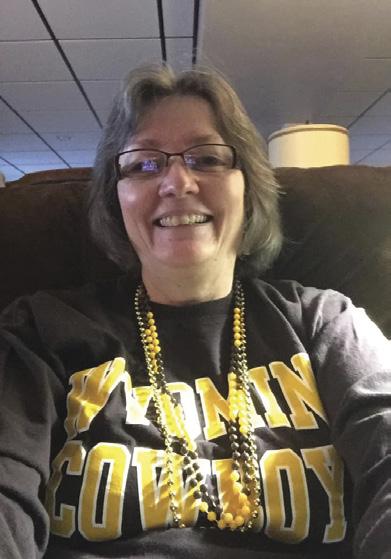
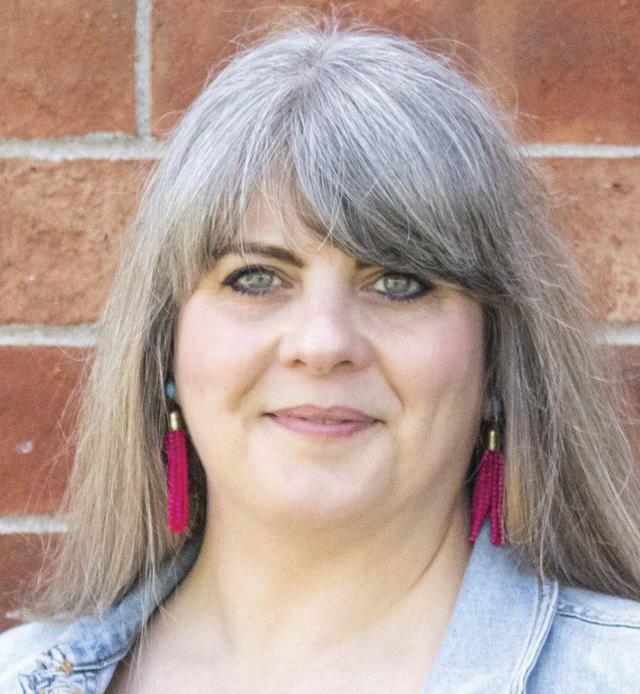

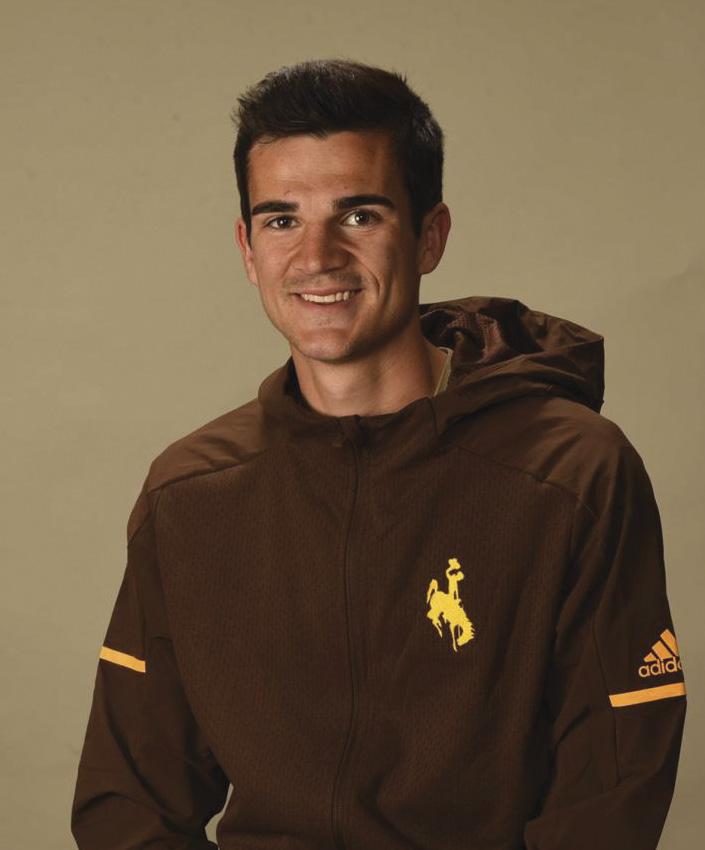




Tyler Hall, Exp. ’20, former Cowboys linebacker, is on the practice squad for the Los Angeles Rams and became a Super Bowl LVI champion in February 2022.
Christopher Henry, B.S. ’20, honors, molecular biology, psychology and physiology, was named the Mountain West Male Scholar-Athlete of the Year for the 2020–21 academic year in August 2021. Henry, a former Cowboys cross country and track and field athlete, is the sixth UW student-athlete to win this prestigious honor.
2010
Britney Tennant, B.S. ’04, animal and veterinary sciences, accepted a new position as the Cheyenne Animal Shelter’s chief executive officer in October 2021.
Rachael Svoboda, B.S. ’12, business administration, received the Wyoming Library Association’s 2021 Outstanding Librarian Award in January 2022. This honor recognizes an individual who utilizes innovation and unwavering commitment to bettering the library and the greater community. Svoboda secured funding for and implemented the Wyoming Library to Business program. Additionally, her efforts and dedication to the Wyoming Leadership Institute, to library users and to the Laramie County Library System’s resources made
her an undeniable candidate for the prestigious award.
Mary Boldrey, B.S. ’19, accounting and finance, joined the Eide Bailly Billings office as a tax associate in August 2021.
Emily Madden, J.D. ’19, law, was elected to serve as chair of the Young Lawyers Section for the Wyoming State Bar in September 2021, where she will serve a one-year term. Madden is an associate at the Spence Law Firm, where she practices personal injury law and serves on the Civil Pattern Jury Instruction Committee and the Continuing Legal Education Committee.
Logan Wilson, B.S. ’19, kinesiology and health promotion, former Cowboys linebacker, played for the Cincinnati Bengals in Super Bowl LVI in February 2022.
Ashley Piccone, M.S. ’20, physics, is currently earning her Ph.D. in astronomy at UW, where she studies interstellar dust. She writes for an astronomy blog, Astrobites, and she creates science stories at Wyoming Public Radio and Media. She is a member of the AAAS Mass Media Science and Engineering Fellows Program. Rylie Pilon, B.A. ’21, education, was hired as a chemistry teacher at Thunder Basin High School and was appointed its swimming coach in August 2021.
Ashley Templeton, B.A. ’18, elementary education with a minor in early childhood education, and Andy Skillman, were married at the Willow Springs Event Center in Springville, Utah, in April 2022.
Hannah (Benigno) McNamee, B.A. ’10, art, and Dr. Michael McNamee III, B.A. ’10, journalism, MPA ’15, welcomed baby Clara McNamee to their family in October 2021. Baby Clara is excited to cheer for the UW Cowboys!


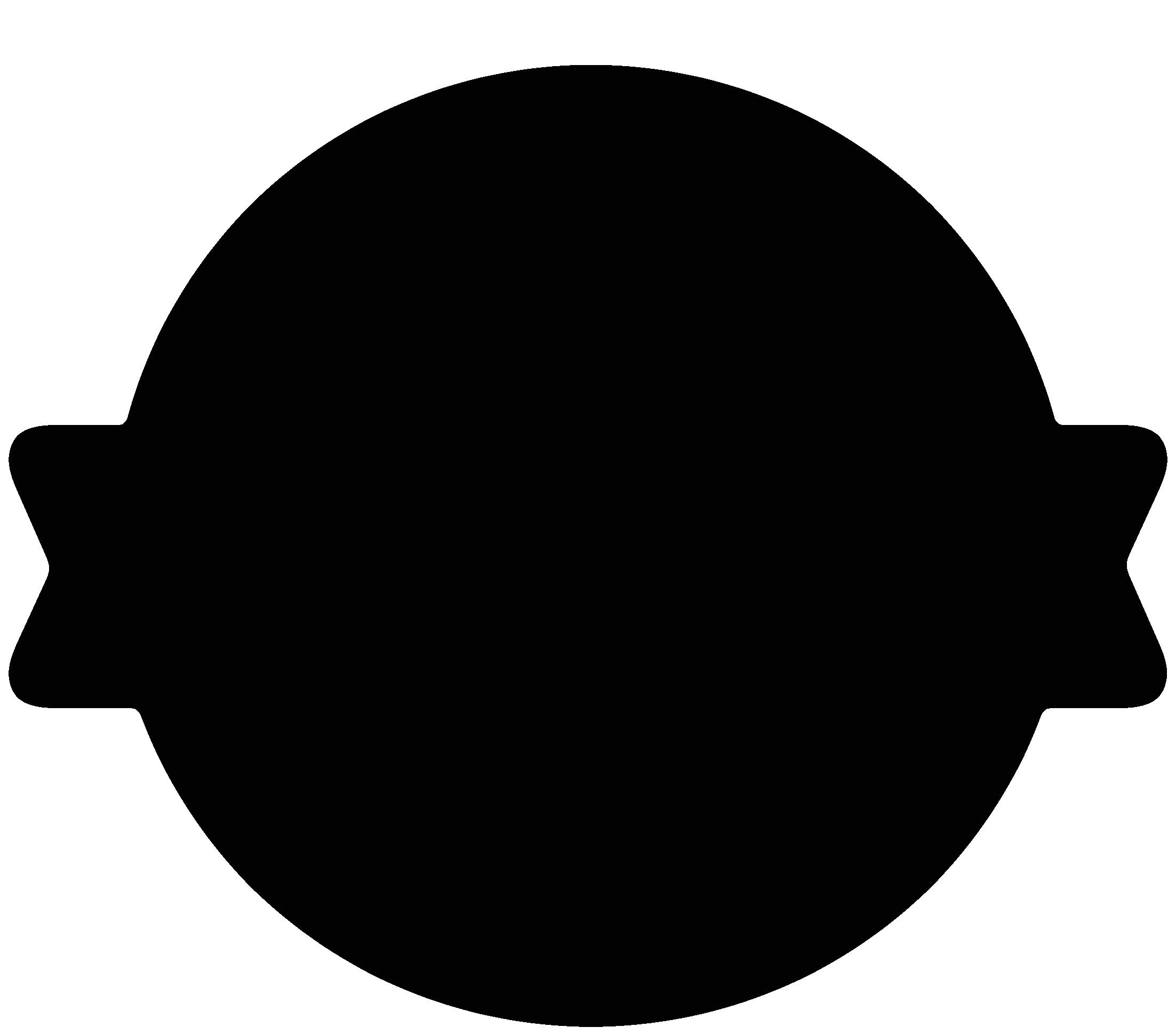

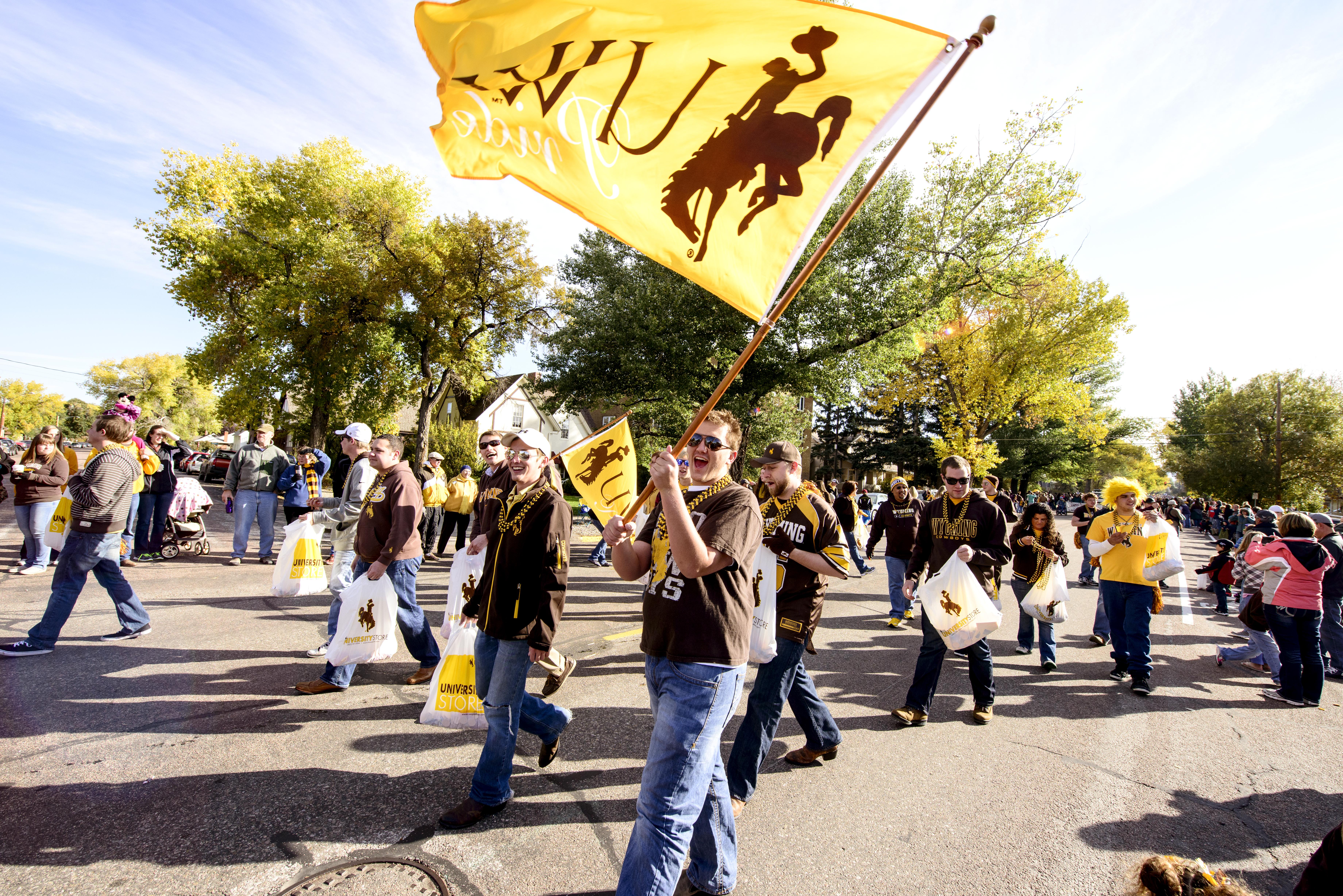

Frederick “Doc Fred” Araas, B.S. ’48, zoology and physiology, 1/7/2022. Dr. Araas courted Edythe Kuzma while attending UW, and they were married in 1943, shortly before he was called to active military duty in World War II. He spent 22 months in four military battle campaigns in France and Germany. Following his return to the U.S., Araas fulfilled his childhood dream of becoming a medical doctor. He practiced as a general physician in Sheridan, Wyo., for 25 years, delivering over 1,000 babies during that time. Araas retired from Mayo Clinic in 1990 as founding codirector of the Family Practice Resident Physicians Training Program, and he and Edythe returned to Sheridan to be closer to family and the area they loved. He had a passion for community and personal health, volunteerism and living an active fulfilling life. His captivating book, Bonneville to Mayo: A Small Town Doctor’s Story, is full of his fascinating experiences and wisdom. Over nearly 70 years of medical practice, he received numerous awards, including the following: A.H. Robins Community Service Award from the Wyoming State Medical Society, multiple American Medical Association Physician Recognition Awards, American Legion Membership Recognition, Honorary SHS “S” Club Member Award, Meritorious Service in 4-H Club Participation (with wife Edythe), Teacher of the Year in Family Practice at the Mayo Clinic, and the Council of Social Agencies Human Lifetime Service Achievement Award. Survivors include his
sisters, children, grandchildren, great-grandchildren, nieces and nephews.
Edgar Boner, Exp. ’49, 7/12/2021, Survivors include his daughters, grandchildren, greatgrandchildren and nephews.
Florence (Conner) Boutwell, B.S. ’74, dietetics, MBA ’75, 7/28/2021. Survivors include her husband, children, grandchildren, great-grandchildren and brothers-in-law.
John Carroll Clay, honorary ’04, 8/7/2021. Over the course of 50 years and several title changes, Clay finished his career as president and financial consultant with RBC Wealth Management, all the while becoming a philanthropic force with his wife, Esther. The couple played a pivotal role in establishing Laramie County Community College and were active participants in the UW Foundation. He often volunteered with the Chamber of Commerce, Episcopal Diocese Investment Committee, Rotary, United Way and the Laramie County Community College Foundation. Clay served as a board member and chair of the National Association of Securities Dealers and was a member of the UW Foundation Board for 14 years, serving as chair. In 2004, he received an honorary doctorate from UW—one of the highest honors a university can bestow, recognizing Clay for his outstanding achievements and commitment to public service. He was awarded the UW Medallion Service Award in 2006 for his service to the university, and he and his wife Esther philanthropically supported all UW’s eight
colleges. Survivors include his daughter, grandchildren and great grandchildren.
Kent Christensen, Exp. ’57, 1/28/2022. Survivors include his wife, children, stepchildren, grandchildren, greatgrandchildren, sibling-in-laws and nieces and nephews.
James Cowper, B.S. ’59, vocational education, 2021. Survivors include his nieces, nephews and cousins in Laramie, Wyo., and surrounding areas.
Henry Cundy, B.A. ’68, secondary education mathematics, B.S. ’73, accounting, 11/16/2021. Survivors include his siblings, nieces, nephews, great-nieces and greatnephews.
Marlene Cushing, B.A. ’62, physical science, M.S. ’63, chemistry, 7/30/2021. Survivors include her husband, niece, great-nephew and his children, stepchildren and goddaughter.
Arlen Davison, B.S. ’55, farm and ranch management, M.S. ’56, agronomy, 7/12/2021.
Davison held a 30-year career at Washington State University in various positions. In 2002 he was named an Outstanding Alum by the University of Wyoming College of Agriculture and Natural Resources Department of Home Economics in recognition of his efforts surrounding the creation of the original Master Gardener Program. While Davison enjoyed his successful career in higher education, his greatest joy came from his family. Davison and his wife shared a happy marriage of 63 years. Survivors include his children and their spouses, grandchildren and great-grandchildren.



Clint Devin, B.S. ’98, molecular biology, 12/10/2021. Dr. Clint Devin was an orthopedic surgeon with Steamboat Orthopaedic and Spine Institute and performed more than 5,500 spine surgeries. He spoke and taught throughout the country, focusing on research and treatment selection strategies for maximizing patient health and satisfaction. Being a Laramie, Wyo., native, Devin was passionate about living and enjoying the outdoors with full mobility and without limitations from pain. Devin completed his medical degree followed by his orthopaedic residency at Vanderbilt University Medical Center in Nashville, Tenn. He completed a complex spinalreconstruction fellowship at the University of Pittsburgh Medical Center and returned to be on staff at Vanderbilt Medical Center before arriving in Steamboat. He remained an adjunct associate professor of Orthopaedic Surgery and Neurosurgery at Vanderbilt
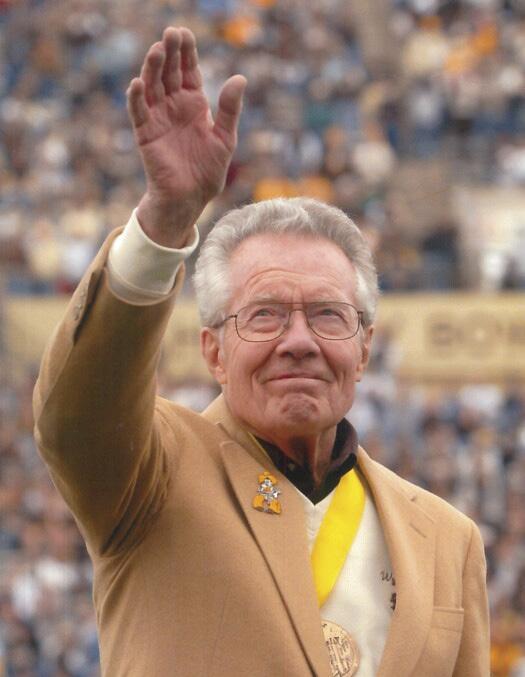
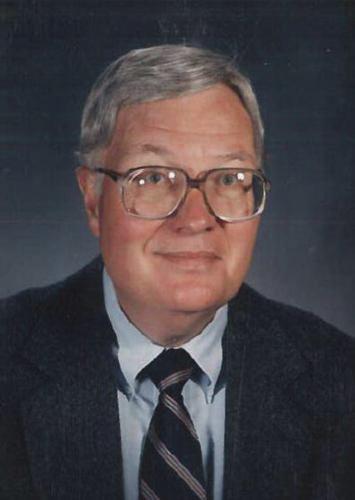

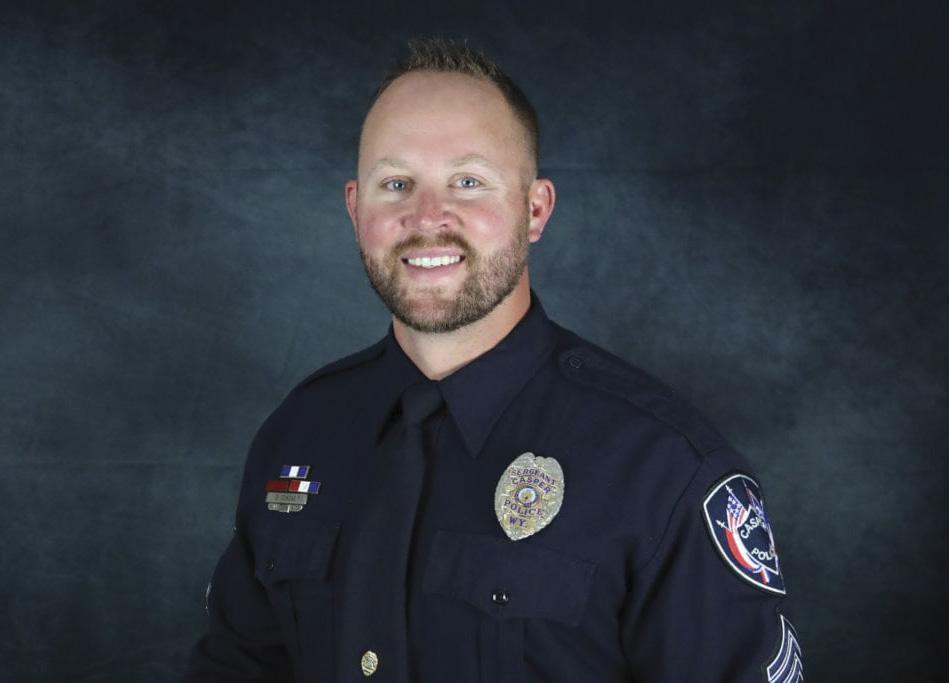
University Medical Center advising residents and research fellows and actively guided the American Spine Registry as part of the board until his passing. Survivors include his wife, Jessica, a practicing endocrinologist, and their two sons.
Margaret Dickman, B.S. ’46, vocational home economics, 5/12/2021. After retiring in 1984, Dickman and her husband, U.S. Ambassador Francois Dickman, returned from abroad and settled in Laramie, Wyo. The pair played an active role in community affairs and helped establish the Wyoming Territorial Prison Museum and the Laramie Plains Museum. In 2004, Dickman received the Laramie Boomerang and Lions Club Distinguished Community Service Award for her profound volunteerism in the Albany County community. Survivors include her children, grandchildren and greatgrandchildren.
William Dubois III, M.A. ’63, history, 7/17/2021. Survivors include his sister, nieces, nephews, great-nieces, greatnephews and his friend, Marcella Helser.
David Ham, J.D. ’78, law, 11/30/2021. Survivors include his wife, daughters, grandchildren, sisters and brother.
Ryan Harris, B.S. ’08, kinesiology and health promotion, 8/4/2021. Survivors include his parents, brother, nephews, grandma and numerous aunts, uncles and cousins.
Daniel Dundas, B.A. ’10, criminal justice, 9/27/2021. Dundas served as lieutenant of the Casper Police Department (CPD) before his passing and was the youngest person to achieve that rank at CPD. He had been awarded seven certificates of commendation, a letter of merit, the Life-Saving Medal, the Distinguished Service Medal,
the Police Service Cross with combat distinction and two Unit Commendation Awards. In 2011, Dundas was awarded Officer of the Year and Sergeant of the Year in 2015. He married his best friend, Annie, last summer and with his son and Annie’s children, he lived a life full of love, laughter and pride. Survivors include his wife, son, stepchildren, parents, siblings and their families and a large, extended family.
Dorothy Harrison, Exp. ’53, College of Arts and Sciences, 6/15/2021. Survivors include her sister and her sons.
Chester Hejde, B.S. ’56, animal production, 1/19/2022. Survivors include his wife, daughters, siblings, grandchildren, numerous great-grandchildren, nieces and nephews.

Paul Huffman, Ph.D. ’71, physics, 12/7/2020. Huffman served in a variety of capacities for the U.S. Air Force National Guard at various government and private research facilities and as an adjunct faculty member in physics at several institutions. He retired from the Science Applications International Corp. as a senior scientist in atmospheric physics. Survivors include his wife of 53 years, children, grandchildren and sisters.
Jon Huss, J.D. ’88, law, 12/11/2021. Survivors include his wife of 35 years, son, parents, brothers, nieces, nephews, greatnephews and great-nieces.
Matthew Isabell, B.S. ’88, business management, 7/19/2021.
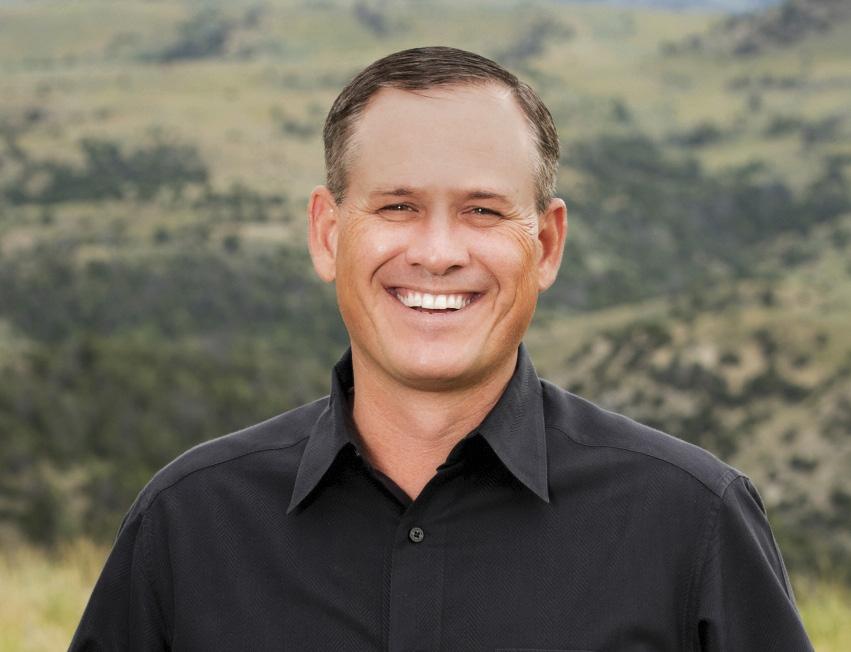
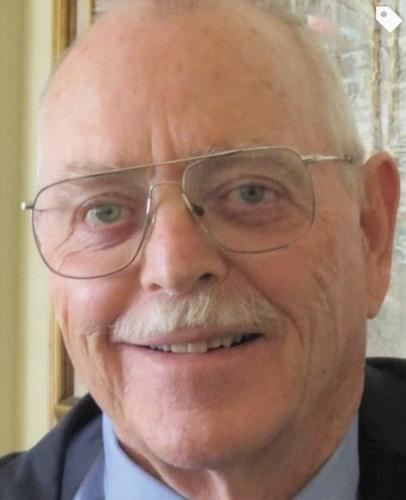

Survivors include his wife of 36 years, six children and their spouses, 15 grandchildren, parents, brothers and their spouses and parents-in-law.
Joey Johnson, B.S. ’94, agricultural education, 8/7/2021. Survivors include his wife of 20 years, children, mother, sister, niece and nephews.
Sharon (Phillips) Klotz, B.A. ’79, history, 3/10/2021. Survivors include her husband, son and daughter.
Larry Krysl, M.A. ’60, history, 1/23/2022. Outside of Krysl’s educational career, his life was centered on church and family. He took pride in the growth of his children, and they often went on family fishing trips or escaped to the mountain cabin built by him and his friends and family. In 2006, Larry and Rose, his wife of 66 years, relocated to Cheyenne, Wyo., to be closer to their children and grandchildren. Survivors include his friends and family.
Steven Mahaffey, B.S. ’72, distributive education, 8/3/2021. Survivors include the love of his life, children, stepchildren, brother and grandchildren.
William Matthews, B.A. ’65, English. Survivors include his sister, Diane (Matthews) Burns.
Marilyn McNary, M.Ed. ’57, elementary education, 12/30/2020. Survivors include her daughter, son-in-law, siblingsin-law, nephews, nieces and their children.

Often a sight during warmer temperatures every academic year, an engineering student surveys his surroundings in Prexy’s Pasture.
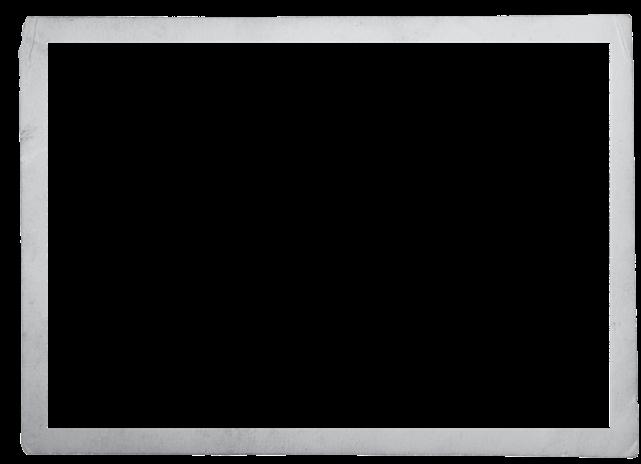

Students from the Student Nursing Association participated in an emergency training scenario in 1975.
Rescue operations were frequently carried out by the University of Wyoming Outing Club in 1959 to keep themselves sharp when it comes to outdoor survival. Perhaps if these were current students, they would be in the Haub School’s Outdoor Leadership minor program.

By Micaela Myers
Students gain hands-on experience by participating in real research across campus.
Junior physiology and honors student Danielle Ernste of Cheyenne, Wyo., hopes to become a surgeon. At the University of Wyoming, she’s already studying heart failure as part of her funded research via INBRE (IDeA Networks of Biomedical Research Excellence) in the lab of kinesiology and health Assistant Professor Nellie Bruns.
Students at the UW enjoy unprecedented opportunities to take part in undergraduate research as early as their freshman year, gaining real-life experience, earning money toward school, building their resumes, discovering their passions and much more.
“Undergraduate research is an invaluable experience,” Ernste says. “Not only has it taught me a lot about science, physiology, the function of the heart and therapies to heart failure, but it has also taught me a lot about myself and helped me recognize possible paths that I could take and the things that I truly enjoy!”
A Big Heart
“I aspire to go to medical school, and I think this research really gave me insight into the behind-the-scenes work that goes into medicine,” Ernste says. “There are so many techniques that physicians use, and it is very enlightening to realize that those techniques could come from labs at our very own university.”
As a member of Alpha Phi Women’s Fraternity, Ernste helped raise money for women’s heart health research. Alpha
Phi hosted a Red Dress Gala, raising more than $10,000 for the Alpha Phi Foundation.
“Heart disease affects one in three women,” she says. “And yet most of the research regarding heart health is focused on male trial groups. The Alpha Phi Foundation notices this gap in research and raises hundreds of thousands of dollars.”
Senior Elizabeth Erickson of Cheyenne, who is majoring in mechanical engineering with a minor in biology, hopes to combine her love of the two fields under the umbrella of biomimicry—engineering inspired by nature. To prepare for her future career, she has spent time in both engineering and botany labs.
“Research allows students to apply the engineering method from beginning to end, something that isn’t really done in class,” Erickson says. “The opportunity to advance our understanding of engineering topics and apply it hands-on is truly rewarding. For me, doing undergraduate research has made me realize I want a career where I never stop learning and don’t just sit at a desk all day. Even the smallest discoveries can feel like great accomplishments.”
In the engineering field, Erickson works as an intern for Evoseer LLC, a startup company that seeks to commercialize a new generation of more energy-efficient lithium batteries. Evoseer was created by UW Ph.D. student Kurt Stahlfeld and
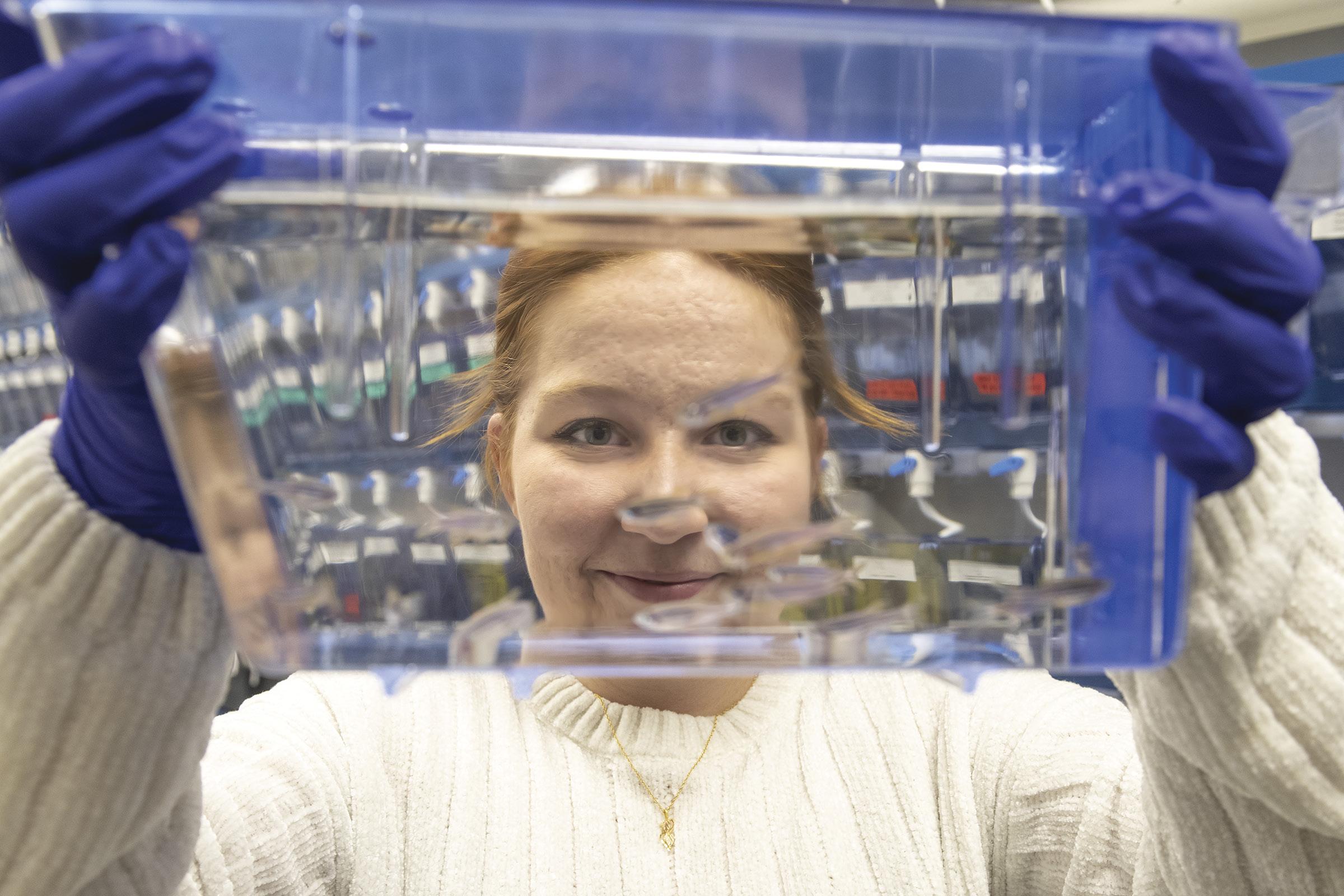
There are many ways to get involved in undergraduate research. Some of the funding programs include INBRE, EPSCoR, McNair Scholars, Wyoming Research Scholars, Engineering Undergraduate Research Scholars and the Wyoming NASA Space Grant Consortium. If you’re interested in undergraduate research, talk to your department, advisers, or professors to learn more.

mechanical engineering Associate Professor Erica Belmont.
“I have learned a lot about battery chemistry, laboratory best practices and effective communication,” Erickson says. “I can confidently say that reflecting on each mistake or unsuccessful path has made me more mindful of everything I do. This is a lesson that is shaping me into a pragmatic engineer that I believe will be beneficial in both graduate school and a career.”
She also worked as a lab technician in botany Professor Brent Ewers’ lab, which taught her a lot about the scientific method and plants in general.
As an incoming freshman, Emily Purifoy of Cheyenne joined the Wyoming Research Scholars Program, which pairs undergraduate STEM majors with faculty for funded research. Purifoy is now in her third year studying spinal cord regeneration in zebrafish in pharmacy Assistant Professor Karen Mruk’s lab and has presented at two conferences.
“My hope is to go to vet school,” says Purifoy, who is majoring in animal and veterinary sciences and pre-veterinary medicine. “A lot of those programs really want to see undergraduate research. Having those experiences under my belt makes me a really good candidate moving forward.”
Purifoy is a founding member of the Wyoming Undergraduate Research Coalition Club, where members practice presenting their research, visit labs and take field trips.
“I would recommend undergraduate research because it
really makes you think outside the box,” she says. “It teaches you it’s OK to fail. You don’t have to get everything right the first time. It also teaches you commitment to the process.”
International student Gunjan Singh Tomar of Madhya Pradesh, India, earned credit hours as an undergraduate researcher in the Drilling and Completions Simulator Lab with Senior Lecturer Tawfik Elshehabi. After graduating with her bachelor’s degree in December 2020, she’s now working toward her master’s degree in petroleum engineering at UW and hopes for a career in machine learning to help the industry find more efficient and sustainable ways to increase productivity and solve challenges.
Located in the new Engineering Education and Research Building, the Drilling and Completions Simulator Lab features the state-of-the-art DrillSim 6000 with dual cyber chair for offshore drilling, DrillSim 5000 for onshore drilling, and Coiled Tubing 5000 and Wireline 5000 simulators for well completion and intervention activities.
“During my undergraduate research at the simulator, I used the simulators to explore complicated drilling scenarios, well control problems and well completions problems,” Singh Tomar says, adding that the experience bridges theoretical classroom learning with practical experience. “I got to practice problems that are high risk when it comes to drilling and completions and find solutions to those problems. My undergraduate research helped me prepare for industry and graduate school.”


Discover the di erence at the University of Wyoming’s College of Engineering and Applied Science.

6 2. 7 %
OF CEAS GRAD STUDENTS ARE OF A DIVERSE BACKGROUND
*This is based on information from academic year 20/21
OPPORTUNITIES FOR FULLY-FUNDED GRADUATE ASSISTANTSHIPS $
AVERAGE STARTING SALARY FOR CEAS GRADUATES $
ACCESS TO STATE-OF-THE-ART LABS TO CONDUCT RESEARCH

DEPARTMENTS WITH 10 MS AND 7 PHD PROGRAMS TO CHOOSE YOUR PATH 7


According to a report published by Dell Technologies, 85 percent of the jobs that will exist in 2030 haven’t been created yet. Depending on your perspective, that can seem like an opportunity or a daunting reality. Another interesting fact is that people change jobs multiple times, with those in the 25-to-34 age range sticking around at one job for about 3.2 years. All this is to say: It pays to go in with a broad range of skills and to be adaptive and flexible. As a first-year student at the University of Wyoming, you may feel that your career is far off, but our experts say it’s never too early to begin exploring your options and gaining experiences.
UW’s Advising, Career and Exploratory Studies (ACES) Center offers career counseling and career services, including resume reviews, mock interviews, exploratory field trips, etiquette dinners and career fairs. ACES Interim Director Richard Miller says that the first step for all incoming students is to log on to the software program Handshake. There, you can peruse a host of offerings screened by staff, including jobs, internships, career fairs and field trips. ACES approves about 200 postings each day.
There are seven career fairs offered annually. Start attending these your first year, even if it’s just to walk around and listen. You’ll be surprised by some of the career options you may never have thought of. Don’t be shy—just go up and ask representatives to tell you more about their companies and offerings. When you’re ready to apply for internships or jobs, ACES can help you with your resume and preparation before the career fair.
“I have attended every career fair and met with my college’s career center many times to polish my resume and help me find a career,” says CeeJay Berg of Rock Springs, Wyo., a senior

accounting and economics major with minors in honors and finance.
“I also used Handshake and LinkedIn regularly to search for opportunities and connect with recruiters.”
Her efforts were successful, and Berg already has an accounting job lined up for after graduation.
ACES also partners to host Live Local, Work Local events, where students visit Wyoming towns to meet with employers and learn about career options there. Miller says one of the best ways to land a job is to be an intern. Interning also allows you to see if the job is a good fit for you.
In addition to career services, you can explore your passions and interests by partaking in campus offerings— from clubs to speakers. UW’s gamified software program SOAR will help you find experiential learning opportunities. You’ll earn points as SOAR keeps a transcript of everything you take part in.
Your adviser and professors are also great resources. “I think it’s super helpful to talk to an adviser you trust to help build a career plan ahead of time,” says senior Abigail Klenk of Loveland, Colo., who is majoring in social studies secondary education and history with an ESL endorsement.
Fellow senior Maddy Jenkins of Jackson, Wyo., who is majoring in kinesiology, says: “UW was very helpful with getting me letters of recommendation and good internships and helping me with my resume. The resources on campus allowed me to feel well set up for graduate school.”
If you’ve declared a major, your college can be a great place to start your career exploration. Many UW colleges have their own career service offerings tailored to its areas of study. Tyler Grabner, associate director of career services at the College of Engineering and Applied Science Center for Student Success, and Taylor True, associate director for the College of Business Peter M. and Paula Green Johnson Student Success Center, offer the following tips.
• Learn about different career paths. Take a look at the Occupational Outlook Handbook and O*NET. These resources describe skills and suggested degrees for career paths along with projected growth of any given field.
• Explore your interdisciplinary interests. Many students have more than one academic interest area. As you explore career paths, consider how a minor or additional major may fit together, and work with your adviser on what this could look like.
• Start attending career fairs, networking events and company information sessions as a freshman! These offerings allow you to network with companies in your field in order to learn more about what you might be doing if employed and will help you build connections with employers. You can find events like these in Handshake.
• Make a career appointment. This can be through your college’s career center or ACES. Use this time to touch base with a professional and come up with a plan for yourself moving forward. Career professionals across campus are always happy to assist with anything and everything internship and career related.
• Start searching for and applying to internships as a freshman—plenty of freshmen obtain internships. Even if you don’t get one, learning the process is extremely valuable.
• When applying for positions, tailor your resume, not just your cover letter. This is based on key words from the job description. If they are looking for someone with communication skills, and you have used those skills, tell them that in your resume.
• It’s OK if you don’t have relevant experience. Getting involved in student clubs, organizations, research and projects can help you gain relevant skills and build relationships.
• Use career-related resources available to you as a UW student such as Handshake, SOAR and Candid Career. These are valuable in both making the most of your time here at UW and making the best decisions moving forward.
• When searching for jobs, use multiple resources. Not all companies post to the same website—start with Handshake, and move on to other resources available to you.
• Practice interviewing. Interviewing can be a nerve-racking process. You can practice interviewing with your career adviser beforehand to go into it prepared and confident.
• Career paths don’t always form a straight line. If you are majoring in mechanical engineering, becoming a mechanical engineer will not be your only option upon graduating. You may find that a related field is the best fit for you.
Once you’re in the workforce— if your dream position is still out of reach—consider job crafting, adds
ACES Manager of Academic Advising Ben Herdt. Job crafting helps bridge the gap between what you’re doing and what you want to do. Talk to your supervisor, and come up with ideas to adjust your job description or take on additional responsibilities that excite you. Many supervisors appreciate this initiative, and it will help build your resume for your next step.


Philanthropy makes a big impact on UW ,s students.
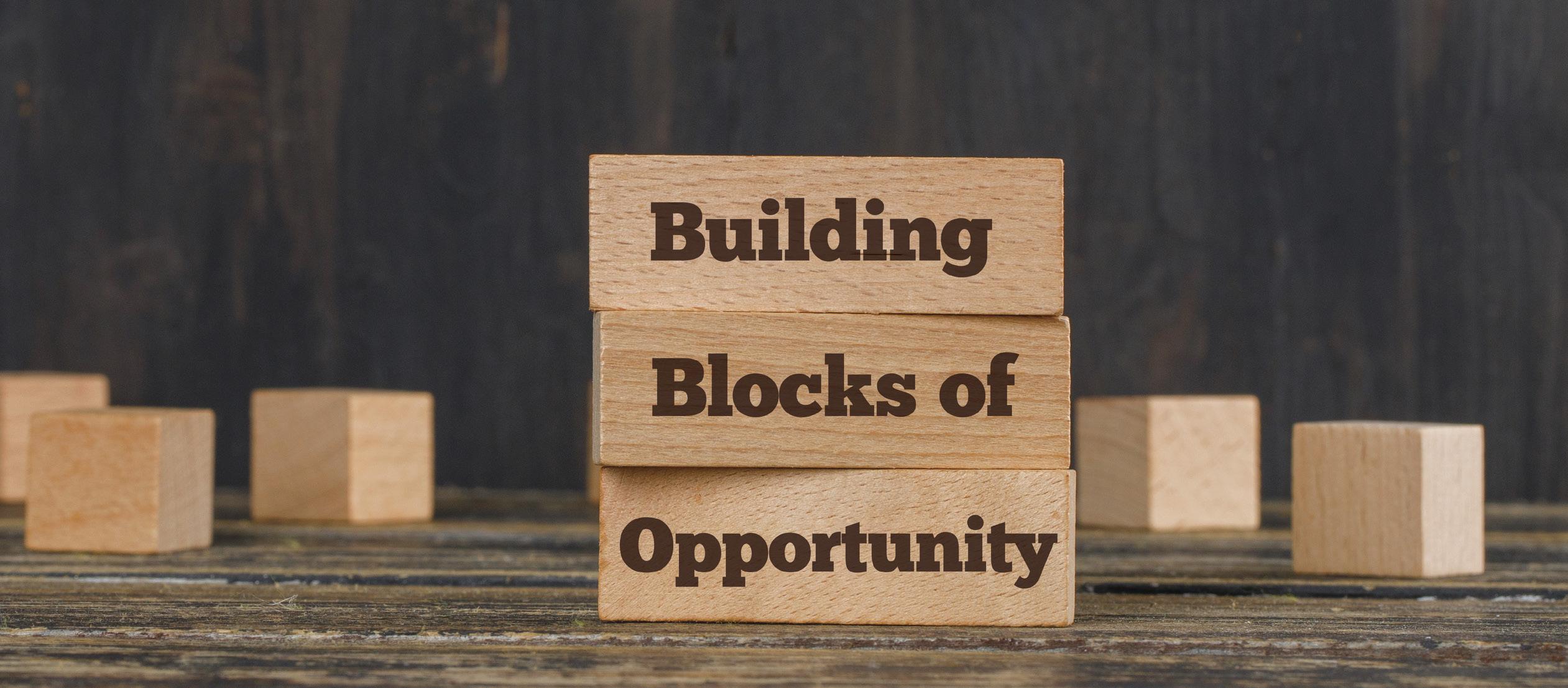
By Kaitlyn Polley and Tamara Linse
Philanthropy is former students helping current and future students. Whether donors give a modest donation annually or set up an endowment that benefits students in perpetuity, private giving assists students in many ways.
Scholarships provide direct support for students, helping them pay for tuition, housing, child care and more. Scholarships established by private donors are available for a wide variety of students—for example, traditional students as well as nontraditional or out-of-state students who are not eligible for the Hathaway Scholarship. Each donor decides the criteria for the scholarships they create, and donors will often support students in their fields or who are from their hometowns or home counties.
The Hathaway Scholarship is a merit- and need-based scholarship that is vital for Wyoming students. However, it does not cover all expenses and is not available to all UW students. It was created and is supported by the state of Wyoming, not private dollars.
Pledges such as the Cowboy Commitment and the Brown and Gold Commitment are a way for the University of Wyoming to support students as they work toward their degrees while also reducing student debt upon graduation.
The Cowboy Commitment is a merit-based financial pledge by UW that supports in-state first-year students. Eligibility is determined by a student’s unweighted GPA and ACT or SAT test scores. The commitment is a pledge that is funded with individual scholarships—made possible by the generosity of donors—and other institutional aid. The Cowboy Commitment can be renewed for four years and is available for transfer students as well.
Like the Cowboy Commitment, the Brown and Gold Commitment is a financial pledge to benefit incoming first-year

students but goes to out-of-state students. It is also determined by unweighted GPA and ACT or SAT test scores and is supported with donor-funded scholarships and other institutional aid. It can be renewed and can also be used by transfer students.
Of course, scholarships are also awarded outside of these commitments to those who are not incoming first-year students.
Like scholarships, graduate fellowships cover tuition and much more. They support the invaluable graduate research that not only is the foundation of grad students’ academic work, but also provides fundamental support and personnel—grad students—for professors in their research. This is vital for future professionals and for UW’s research.
Philanthropy also helps students in ways that are less direct but just as important. Private giving can support faculty through startup funds, salary enhancements and/or research dollars, thereby benefiting students. It supports whole programs of research, as well as the facilities necessary for that research and for other purposes. For example, the Marian H. Rochelle Gateway Center was built entirely from donor contributions.
Many programs that enhance students’ educations are funded by donors. These include the Harry C. Vaughan UW Planetarium, the Tom A. Thorson Geology Field Camp, several summer camp programs for future UW students, and much more. Donor dollars also support students as they venture out across the world in Education Abroad—the Richard B. and Lynne V. Cheney Study-Abroad Scholarship Fund is the largest land-grant university study-abroad scholarship endowment in the nation. Donors also support UW Extension and all the important work it’s doing across the state.
To sum it up, private philanthropy offers students the building blocks of opportunity. It not only allows students to attend UW— it also prepares them for rich and rewarding lives and careers.
College is a stressful time for many students— between balancing classes, social lives and other activities. When you throw NCAA Division 1 athletics into the mix, it adds much more stress with a lot less time for everything else. Having financial support from the Charles and Virginia Hill Honors Scholarship has lifted a massive weight off Jonathan “Jack” O’Neil’s shoulders.
O’Neil is a UW student-athlete from Colorado Springs, Colo. He is in his first year of a journalism degree as a part of the College of Arts and Sciences and is also pursuing an honors minor from the Honors College. He plans to graduate in the spring of 2025.
Growing up, O’Neil was very involved in athletics, and he especially excelled in swimming. He is a two-time Team USA Paralympic Swim Team Qualifier, a member of the USA Triathlon Junior National Para-development team, and a hopeful for the 2024 U.S. Paralympic Swim Team. “A big part of my life is being a disabled athlete at the NCAA level, which is not something that many people can say,” he says. In the meantime, O’Neil plans to train and swim for UW’s varsity athletics.
O’Neil had a goal of swimming in college, which was a big reason he chose to attend UW. He also liked UW’s journalism program and felt that studying journalism at a school with Division 1 athletics matched well with his plan of becoming a sports broadcaster. “I knew I wanted to have a job in sports because that’s what my life revolves around. Writing, sports and broadcast are things that I all like, so I feel like sports broadcast and journalism is something I can get behind.”
Along with his journalism major, O’Neil is part of the Honors College. “I wanted to join the Honors College because I thought it would be a great community to be in,” he says. “I also thought it would be a good way to boost my writing and critical thinking. There are a lot of really cool opportunities and really cool people in the Honors College.”
As an honors student, O’Neil was awarded the Charles and Virginia Hill Honors Scholarship. This


scholarship has benefitted him in a variety of ways. “They’re making much more of an impact than they probably think they are. Being a swimmer takes up a lot of time and a lot of emotional stress, and not having to worry about the financial burden is nice,” he says. “It definitely holds me accountable, too. If someone is willing to put their money into me, I don’t want to take their generous donations and put it to waste, so it definitely does keep me motivated in my classes.”
Philanthropy, especially in the form of scholarships, is incredibly important to UW. “I think in one big way it creates a lot of pride for the school,” O’Neil says. “One of the reasons I chose UW is because it has such a great community of people who have been there before. To see that past graduates want to invest in the future of this school is really cool to me, and I think that is a very powerful thing.”
College is the first taste of freedom for many young people. At times, it can be hard to find a balance between school and the rest of life. For Elijah Vigil, scholarships such as the Nielson Energy Scholarship act as a motivator to go the extra mile when it comes to schoolwork.
Vigil is from Castle Pines, Colo. He is in his third year of an energy resource management degree as a part of the School of Energy Resources. Vigil plans to graduate from UW in the spring of 2023.
Inspired by his dad, Vigil chose to pursue an energy resource management degree with the goal of becoming a professional petroleum landman, where he hopes to do exploration and production for an oil and gas company.
He chose UW for college because he felt the programs within the School of Energy Resources fit his passion for energy.
During his time at UW, he has met and connected with many faculty members. He is the president of the Student Chapter of Energy Resources, where he was formerly the treasurer. Vigil also worked as an intern at the UW Foundation, where he aided the investment team in the management and organization of oil and gas assets.
In May 2021, Vigil was awarded the Nielson Energy Scholarship. As a freshman, he was awarded the Nielson Bridge Scholarship and has since had financial support from the Nielson Energy Committee. To him, this

scholarship has been very beneficial. “I am incredibly appreciative and grateful to the Nielson Energy Committee for their ongoing support for me and the Energy Resource Management Program,” Vigil says. “It has lifted a great financial weight off my shoulders.”
He also says that having the Nielson Energy Scholarship motivates him to work harder in classes. “Scholarships provide students with an incentive to do better and put their best foot forward. They can give that final push that makes the difference between an A and a B,” Vigil says. “They can create a mindset that if you work hard enough for it, you will get it. I think that’s an important message for students.”

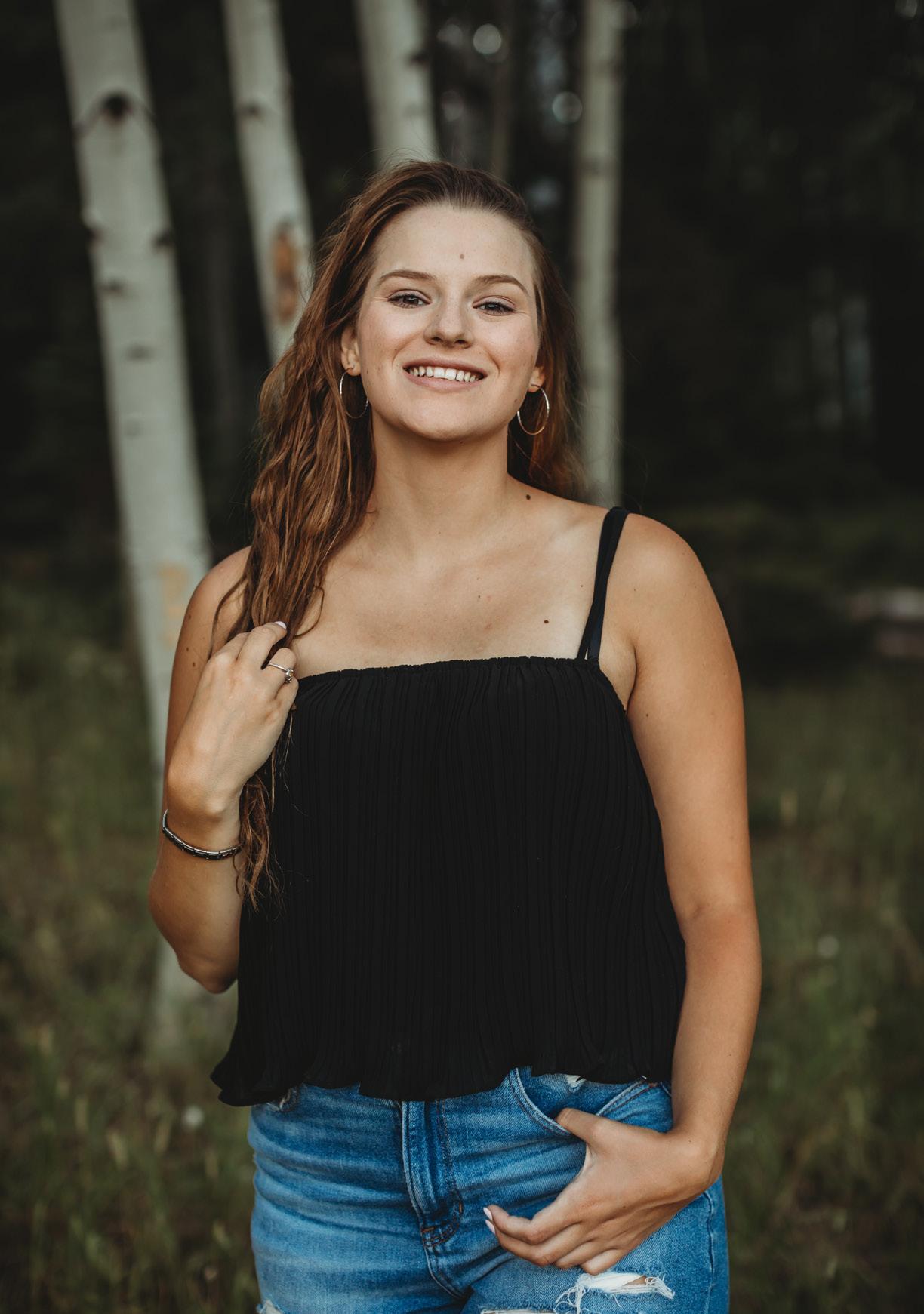

Many students enter college uncertain of what their lives will look like. They don’t exactly know what they’ll study or who they’ll be in four years. That was the case for Kayalei Hartl, but the Clifford C. Hach Memorial Scholarship has helped rid her of that uncertainty. It has made her feel that she’s doing something right, and she knows that someone else out there believes that she is too.
Hartl is a native Wyomingite from Casper, and she is studying biology and chemistry with a minor in anthropology through the College of Arts and Sciences. Hartl plans to graduate in the spring of 2025.
When looking at where to go to college, Hartl had three questions: Does it make financial sense? How far is it from home? And will she still have the freedom to be herself? Ultimately, UW answered all of these questions perfectly. Staying in state made more sense than going out of state, and she would be close to home but still have the freedom that many college students desire.
Hartl chose to major in both biology and chemistry with the intent of pursuing medical school after her undergraduate degree. However, after being in college for a few months, she has started to also consider other options such as research. She wants to find a career that will enable her to help others. Anthropology is also a subject she has always been passionate about.
During her time at UW, Hartl has branched out and become involved in many ways at UW. She has met many people through living in the residence halls and being in classes, and joining the sorority Alpha Phi has been a highlight of her first-year experience.
Hartl also hopes to get involved in volunteering, both through her sorority and giving her time to local food pantries and animal shelters.
In June 2021, Hartl was awarded the Clifford C. Hach Memorial Scholarship. “I cannot explain how much this scholarship has helped me,” Hartl says. “Because it was specific to my degree, I felt like I was doing something right majoring in chemistry. It’s really motivational because there is a certain GPA I have to keep, and I have to stay in chemistry, so it just keeps me on track. I’m just very thankful.” Given that the scholarship is renewable for up to four years, she feels incredibly blessed to have that much financial support.
“I think scholarships are really important because some students don’t get aid in other forms, like from their parents, or just don’t get the chance to save up because college is expensive,” Hartl says. “I believe if they want to work toward a good education and not have so many distractions outside of working toward their degree, scholarships can be incredibly beneficial.”

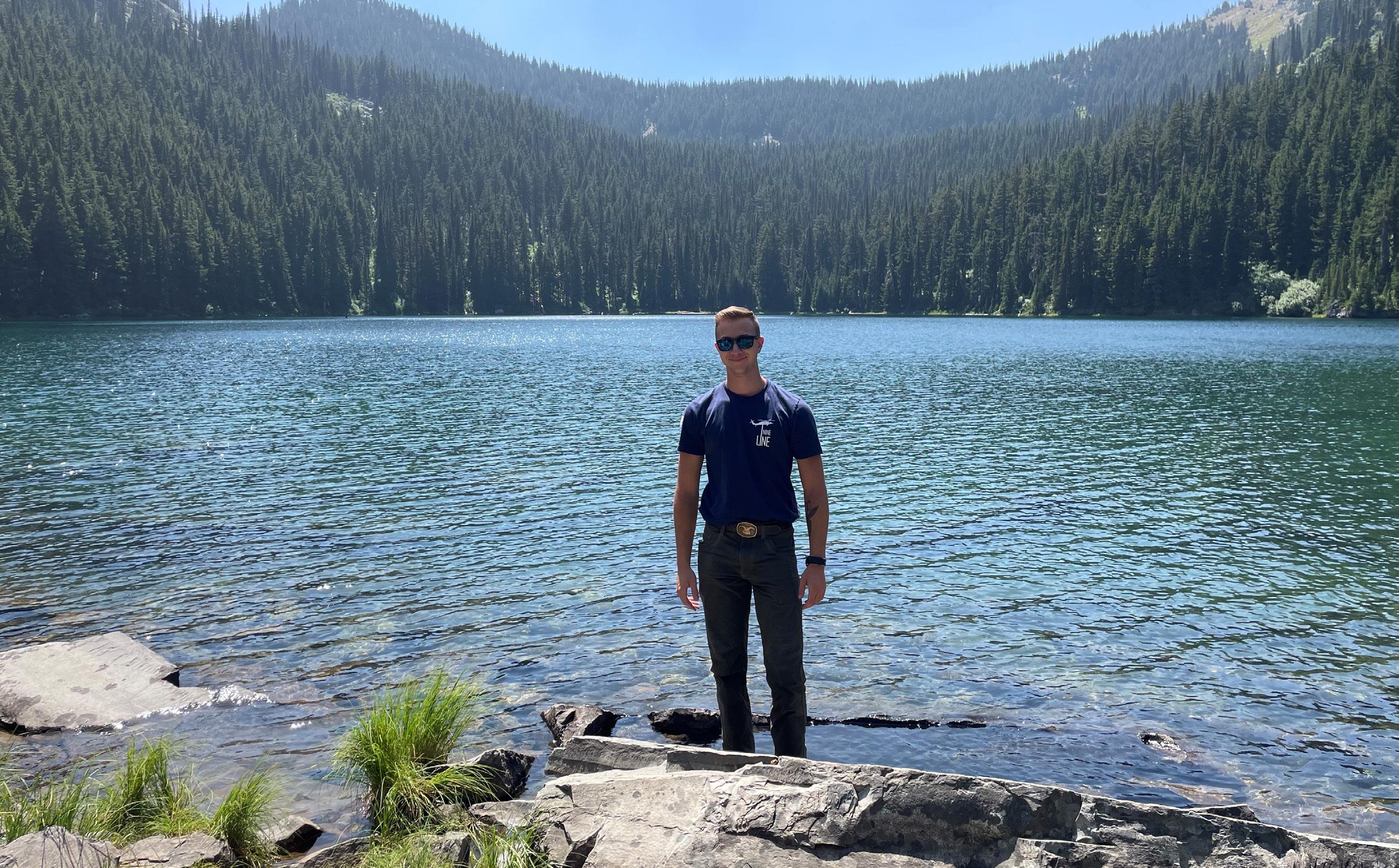
When looking for schools with a construction management program, Jackson Crabtree says that UW was hard to beat. From the small, tightknit community of Laramie to the wonderful outdoor opportunities such as skiing and camping, to the excellent student-to-faculty ratio, UW was the perfect fit for him. As soon as he began classes, he knew he made the right choice. Being awarded the Bellamy and Sons Engineering Scholarship was the icing on the cake.
“The quality of education has been one of the best parts about UW,” Crabtree says. “Everyone who is here wants to be here.”
Crabtree is from Post Falls, Idaho. He is in his third year of a construction management degree as a part of the College of Engineering and Applied Science, with a minor in finance from the College of Business. He plans to graduate in the spring of 2023.
To Crabtree, the construction
management program at UW is unlike anywhere else. Instead of providing coursework in just the financial and management side of business, UW’s construction management program offers classes in everything from the architectural work and engineering, to construction law, to management and business. Because of this wide array of offerings, Crabtree is confident he will be successful working at a construction firm.
Apart from being a full-time student, Crabtree works as a volunteer firefighter and hopes to eventually become an EMT. After graduating from UW, he expects to work full time as a firefighter for as long as he is able, after which he would like to switch into construction management by either working at small construction firm or starting one of his own.
In May 2021, Crabtree was awarded the Bellamy and Sons Engineering Scholarship. The scholarship has benefitted him in many ways. “College
is a time of financial instability for a lot of students, so having scholarships like the Bellamy and Sons Engineering Scholarship helps add back some stability,” Crabtree says. That financial stability has allowed him to put all of his focus on school instead of worrying about finances.
“Philanthropy in the form of scholarships is important, because it provides an opportunity to support students in ways that are impactful. They put a good pressure on students to do their best and give them an extra push to do their absolute best,” Crabtree says. “I am so thankful for the Bellamy and Sons’ faith in me and in the new construction management program. Supporting something completely new can be daunting, but it’s comforting knowing they believe in us.”
By Micaela Myers
It’s a scene right out of a movie—the car packed full of clothes and dorm furnishings, a flurry of unpacking in the parking lot, and then hugs and waves as parents depart and their students begin a new phase of life. Going off to college coincides with children reaching adulthood. At this magical age, parents and students alike must navigate newfound independence. How can parents support their college students without being overly involved? To help parents as their kids begin this journey, we spoke to veterans who have already been through it.
The Scott Family
Thora and Shane Scott sent their son Othin to the University of Wyoming this past fall for his freshman year. He arrived all the way from Morristown, N.J.
“The second day Othin was at school, he met a friend who took him fly fishing in the Snowy Range Mountains, where they proceeded to stumble across fresh bear scat,” Thora says. “We laughed because a week earlier he was at the Jersey Shore, and the closest thing to a bear would be a New Yorker sun bathing on the beach.”
Once upon a time, the Scotts lived in Laramie, so they knew how welcoming
the community was and had family friends here with a son Othin’s age. The two were able to be roommates.
“It’s always with mixed emotions seeing your children grow into adulthood,” Thora says. “On one hand you are proud to see them evolve into adulthood, yet on the other you worry they can easily derail their future by making one wrong decision. We have gained solace through our faith as parents that we have instilled a solid foundation, work ethic and trust in Othin. It is also important for us that he knows we are always there for him when he needs us, but we give him the freedom to make his own choices and

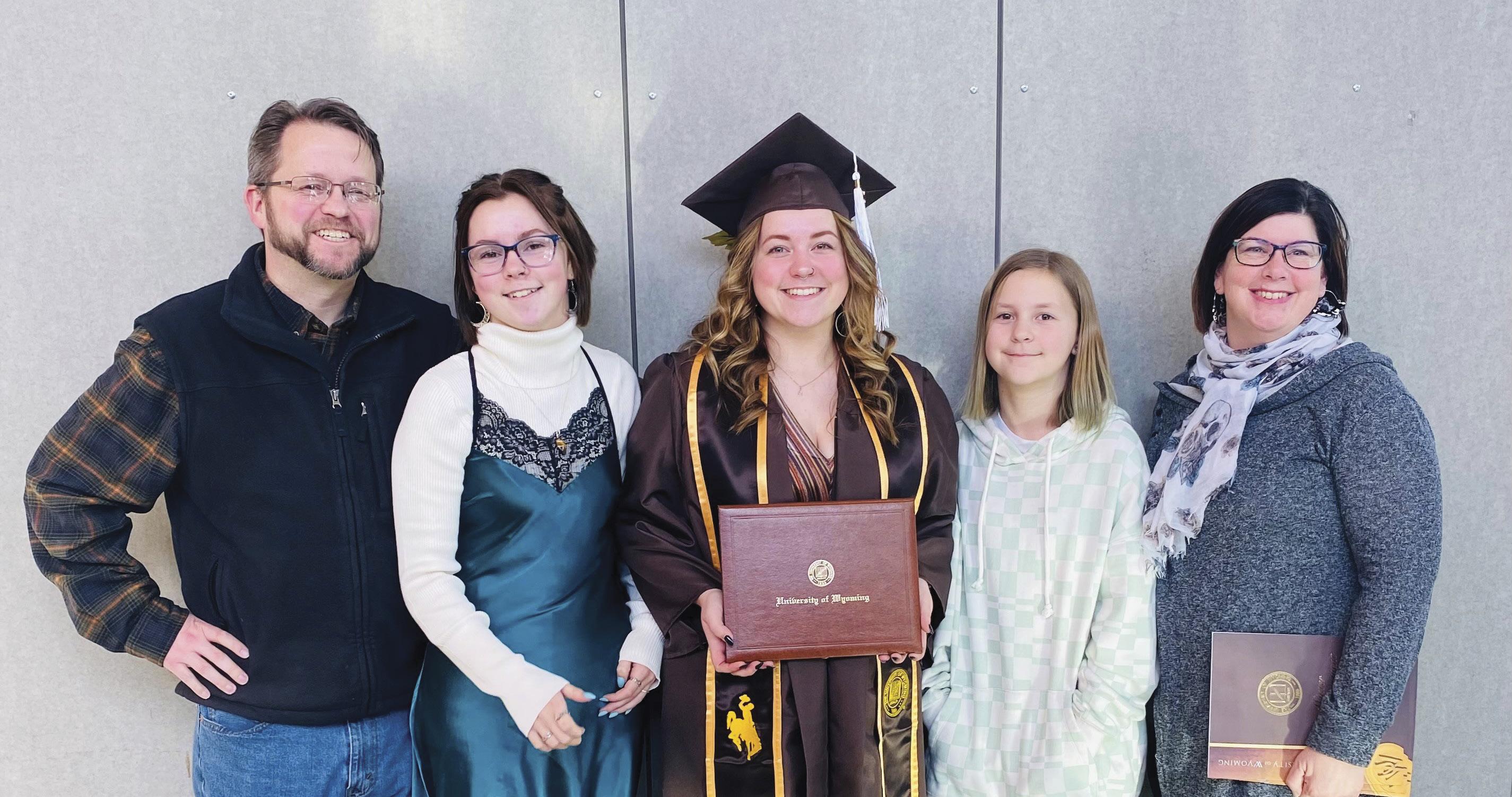
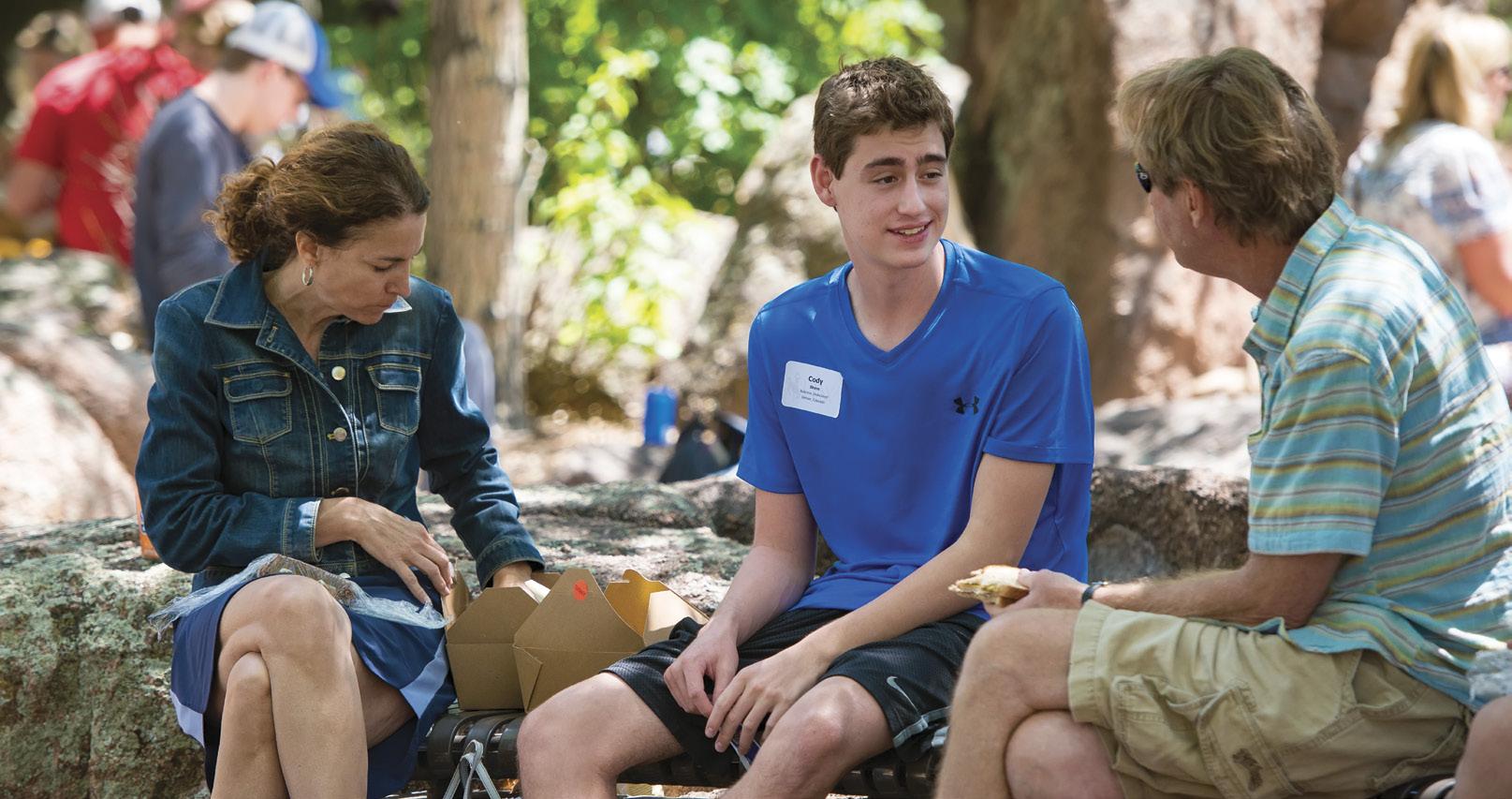
Campus tours are a great way for potential students and their families to experience campus. Above, families enjoy a picnic lunch after a tour.
not hover over every aspect of his life.”
So far, Othin has handled the transition well, they say. He’s making friends and loving the outdoor lifestyle. They’ve noticed he’s maturing in his conversations, self-awareness and handling of responsibilities, including his finances. They check in with each other several times a week. Othin did go through a period of homesickness but was able to work through it.
“Try not to worry so much,” Thora advises other parents. “Have confidence that the lessons and lectures you have given your children over the years do resonate. Accept the fact that they will stumble and make mistakes, but it is important to be there to support them when they do. Sometimes you learn more from your mistakes than you do from your successes. Also, try finding a school that is good fit for your child. UW was a good fit for Othin, because he wanted to have a big college experience, but we knew he would have greater success in a more personalized setting that a smaller school could offer. UW is unique in the sense it provides both.”
The Magelky family of Sheridan, Wyo., are UW veterans. Daughter Jolie
(statistics and anthropology) graduated this past December, and daughter Ali (biology and wildlife management) is a freshman.
As parents, sending a child off to college leaves a void, Thane Magelky says. But, like the Scotts, they recommend being supportive without being overly invasive.
“We were always a phone call away,” he says. “But we weren’t at any point on the phone every day asking what they were doing and where they were or saying what they should be doing. It was more ‘how are you doing?’ or ‘do you need anything?’ We raise them to reach this point where they go out on their own.”
Both girls went through a period of homesickness after the first couple of weeks of excitement, which is common for freshmen. They were able to drive home to see their family and pets on occasional weekends. Parent weekend takes place in September, and the Magelkys also recommend it.
Learning to manage car maintenance on their own was one learning curve, Thane says, and he suggests a winter safety kit for driving. His daughters also had to learn when they were overdoing it and needed rest to recharge.
When Thane was in college, he had
As part of the Student Success and Graduation Hub, UW has formed a parent and family council and provides a monthly e-newsletter to parents to help them stay informed.
to call home on a payphone. They find texting a good way to stay in touch now because their daughters can respond at their leisure.
“It’s good for them to have some space too and not be checked on every day so they can get independence,” he says. “Then when you do call, you can have more in-depth conversation.”
The biggest thing is to let them know you’re there and are available, Thane advises. “Make sure they have everything they need. Do all the lecturing about going to class and all those things that need to be said even though they may know already. Let them know you’re there for them. Then I think it’s really important to back off and let the kids have their college experiences—learning, meeting new people, getting different experiences culturally. There’s a lot to soak up. Get out of their way and let them be who you raised them to be.”


By Nicole M. Crawford, Director and Chief Curator
Relationships among artists, artists’ estates, art dealers, collectors and the University of Wyoming Art Museum are vital to developing and expanding the museum’s permanent collection. For example, the museum has worked closely with the estate of abstract expressionist painter Jon Schueler, including visits by Art Museum personnel to the artist’s former studio in New York. The museum has added 21 Schueler paintings to the permanent collection, creating the largest collection of his work in a public institution in the United States.
The Jon Schueler estate facilitated the museum’s first acquisition of Schueler’s work by connecting the museum to a collector who is a well-respected art historian who generously donated a painting typical of the artist’s later work. To build on this important acquisition, the museum worked closely with the estate’s curator, Magda Salvesen, to increase Schueler’s representation through an additional gift of significant paintings.
Schueler was born in Milwaukee, Wisc., in 1916 and earned his B.A. and M.A. degrees from the University of Wisconsin at Madison. Before he was a painter, Schueler navigated a B-17 bomber during World War II. The sky became a place filled with anxiety and beauty at the same time. Only after the war did Schueler train as an artist at the California School of the Fine Arts (1948–1951), where he was surrounded by a group of historically important artists who became known for the development of the Bay Area Figurative Movement of painting. Schueler moved to New York in 1951, and his remaining years were punctuated by visits to Mallaig, Scotland, where he filled his canvases with abstractions inspired by the area’s light and weather that became the hallmark of his signature style.


Jon Schueler (American, 1916–1992) was a secondgeneration abstract expressionist whose imagery depends on the existence of something observed. His focus is almost entirely on landscape, most particularly on “skyscape” or “lightscape.” The paintings convey nature at a specific moment, such as the buildup of clouds with the filtered sun breaking through. Using a range of color to express light—from subdued grey to intense red—Schueler creates paintings that are not only full of life and movement but also emotionally charged.
Through this acquisition, the UW Art Museum is able to share the legacy of Jon Schueler with the university community and the people of Wyoming and beyond—thus fulfilling the museum’s mission. Relationships formed with collectors and donors are integral to achieving the museum’s mission of presenting and collecting world-class art, sharing in its transformative powers, and fostering a deeper connection with humanity and a creativity that envisions new futures by engaging academic, local, state, national and global communities. The UW Art Museum previously presented a solo exhibition of his work in 2017 and is excited to share his work again in 2022 to highlight this important collection. Jon Schueler: Light in Process is on view at the Art Museum March 12 through June 4, 2022.

THE MANY WONDERS AND OPPORTUNITIES THERE ARE AROUND CAMPUS
We know your interests and passions go beyond the degree you're seeking. At the University of Wyoming, you'll have the chance to develop your multimedia skills in Studio Coe, dive into culture and history with our many museums, grow your love for gardening at William's Conservatory and so much more!
From joining student organizations, to having fun at campus events, and hanging out in the Union with your new friends, at UW, you’ll develop life-long relationships. 2 2
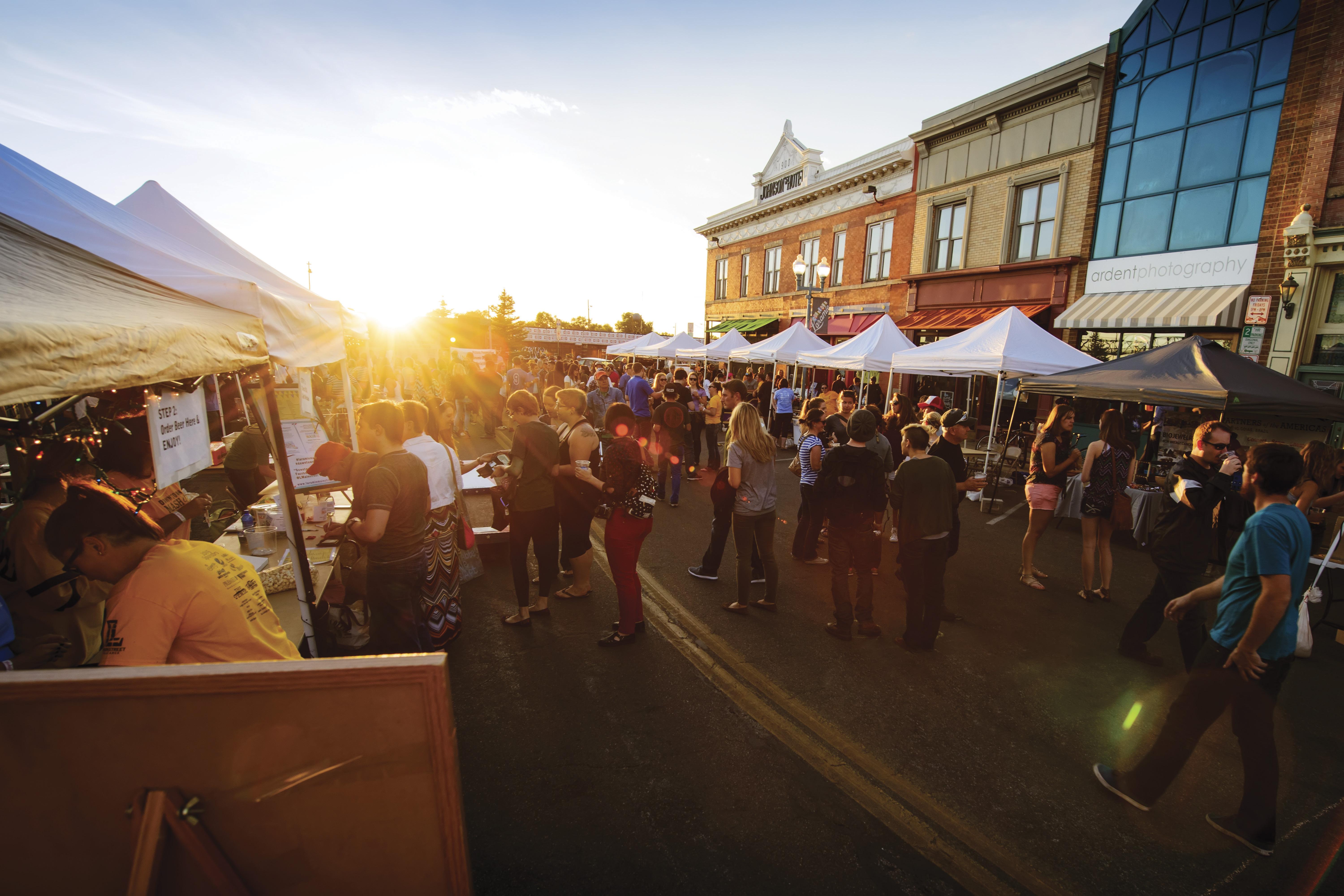
THE OUTDOORS, EVEN IF YOU'RE NOT AN OUTDOORSY PERSON
Besides the limitless fishing and camping spots, all of our trails, skiing and snowboarding opportunities, there's still plenty to do out in the wide-open spaces of Laramie. There's over 15 city parks to enjoy and our downtown has plenty of outdoor seating. There's also Prexy's Pasture on campus that is always full of dogs playing catch and people enjoying the sun.